DEF 14A: Definitive proxy statements
Published on April 27, 2021
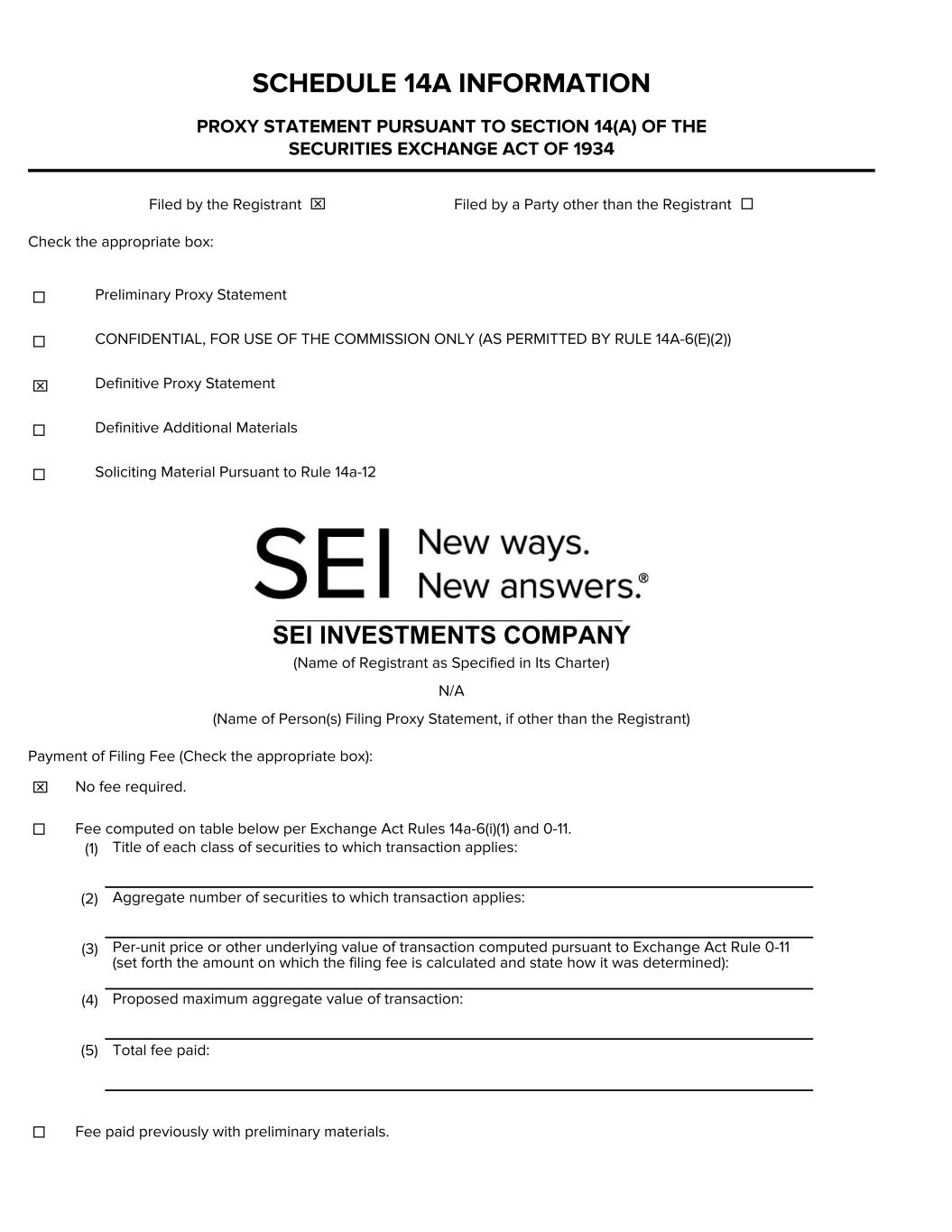
SCHEDULE 14A INFORMATION PROXY STATEMENT PURSUANT TO SECTION 14(A) OF THE SECURITIES EXCHANGE ACT OF 1934 Filed by the Registrant x Filed by a Party other than the Registrant ¨ Check the appropriate box: ¨ Preliminary Proxy Statement ¨ CONFIDENTIAL, FOR USE OF THE COMMISSION ONLY (AS PERMITTED BY RULE 14A-6(E)(2)) x Definitive Proxy Statement ¨ Definitive Additional Materials ¨ Soliciting Material Pursuant to Rule 14a-12 ________________________________________ SEI INVESTMENTS COMPANY (Name of Registrant as Specified in Its Charter) N/A (Name of Person(s) Filing Proxy Statement, if other than the Registrant) Payment of Filing Fee (Check the appropriate box): x No fee required. ¨ Fee computed on table below per Exchange Act Rules 14a-6(i)(1) and 0-11. (1) Title of each class of securities to which transaction applies: (2) Aggregate number of securities to which transaction applies: (3) Per-unit price or other underlying value of transaction computed pursuant to Exchange Act Rule 0-11 (set forth the amount on which the filing fee is calculated and state how it was determined): (4) Proposed maximum aggregate value of transaction: (5) Total fee paid: ¨ Fee paid previously with preliminary materials.

¨ Check box if any part of the fee is offset as provided by Exchange Act Rule 0-11(a)(2) and identify the filing for which the offsetting fee was paid previously. Identify the previous filing by registration statement number, or the form or schedule and the date of its filing. (1) Amount Previously Paid: (2) Form, Schedule or Registration Statement No.: (3) Filing Party: (4) Date Filed:

SEI Investments Company Notice of Annual Meeting of Shareholders to be held June 2, 2021 202

b

Alfred P. West, Jr. Chairman and Chief Executive Officer As a pandemic with far-reaching social and economic repercussions affected the entire globe, alongside renewed calls to address centuries of inequity, 2020 will not soon be forgotten. It was a year in which to reflect and recognize that balancing our responsibilities as a corporate citizen is of the utmost importance. Since our inception, we have believed that fear of failure can inhibit a culture of innovation, as well as our ability to solve complex problems for our clients. Embracing transformation and disruption is what has helped us develop leading-edge solutions for the markets we serve, and that same spirit enables us to face the challenges of today and tomorrow. We believe that a dynamic, diverse and inclusive workforce is a driver of our success. While there is work to be done, we have made strides as a company to embrace our values of trust and respect. We also know that our clients face many of the challenges that we do. Clients need solutions that meet today’s challenges and contemplate future opportunities. Our investment clients’ goals often go beyond the numbers—they also consider how environmental, social and governance considerations may impact risk and returns. As we move forward, we are confident in our future. I am heartened by the work we are doing on many fronts, helping us grow as a company, workforce and community. We know the work ahead may not always be easy, but we are optimistic in our ability to deliver. 1
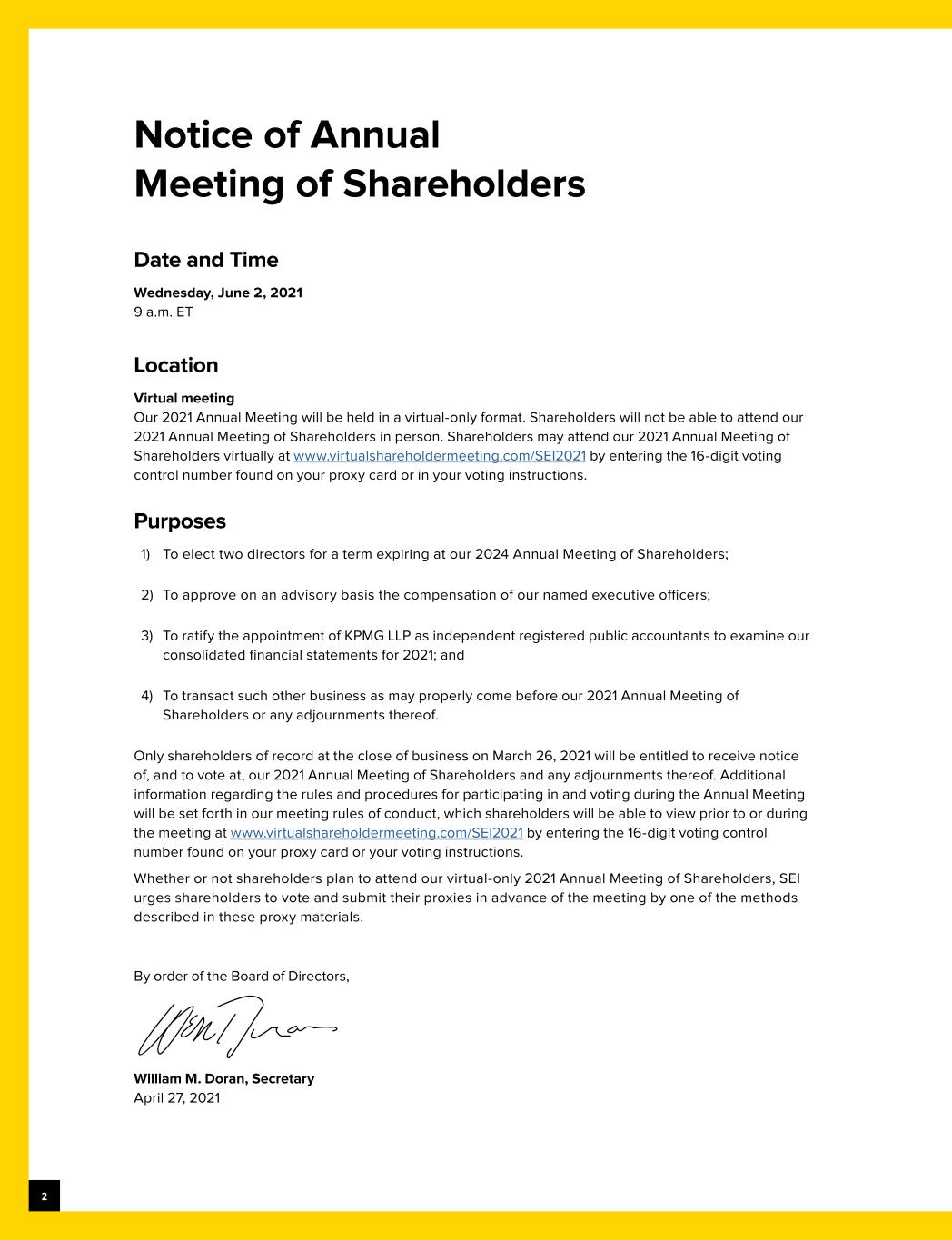
Notice of Annual Meeting of Shareholders Date and Time Wednesday, June 2, 2021 9 a.m. ET Location Virtual meeting Our 2021 Annual Meeting will be held in a virtual-only format. Shareholders will not be able to attend our 2021 Annual Meeting of Shareholders in person. Shareholders may attend our 2021 Annual Meeting of Shareholders virtually at www.virtualshareholdermeeting.com/SEI2021 by entering the 16-digit voting control number found on your proxy card or in your voting instructions. Purposes 1) To elect two directors for a term expiring at our 2024 Annual Meeting of Shareholders; 2) To approve on an advisory basis the compensation of our named executive officers; 3) To ratify the appointment of KPMG LLP as independent registered public accountants to examine our consolidated financial statements for 2021; and 4) To transact such other business as may properly come before our 2021 Annual Meeting of Shareholders or any adjournments thereof. Only shareholders of record at the close of business on March 26, 2021 will be entitled to receive notice of, and to vote at, our 2021 Annual Meeting of Shareholders and any adjournments thereof. Additional information regarding the rules and procedures for participating in and voting during the Annual Meeting will be set forth in our meeting rules of conduct, which shareholders will be able to view prior to or during the meeting at www.virtualshareholdermeeting.com/SEI2021 by entering the 16-digit voting control number found on your proxy card or your voting instructions. Whether or not shareholders plan to attend our virtual-only 2021 Annual Meeting of Shareholders, SEI urges shareholders to vote and submit their proxies in advance of the meeting by one of the methods described in these proxy materials. By order of the Board of Directors, William M. Doran, Secretary April 27, 2021 2
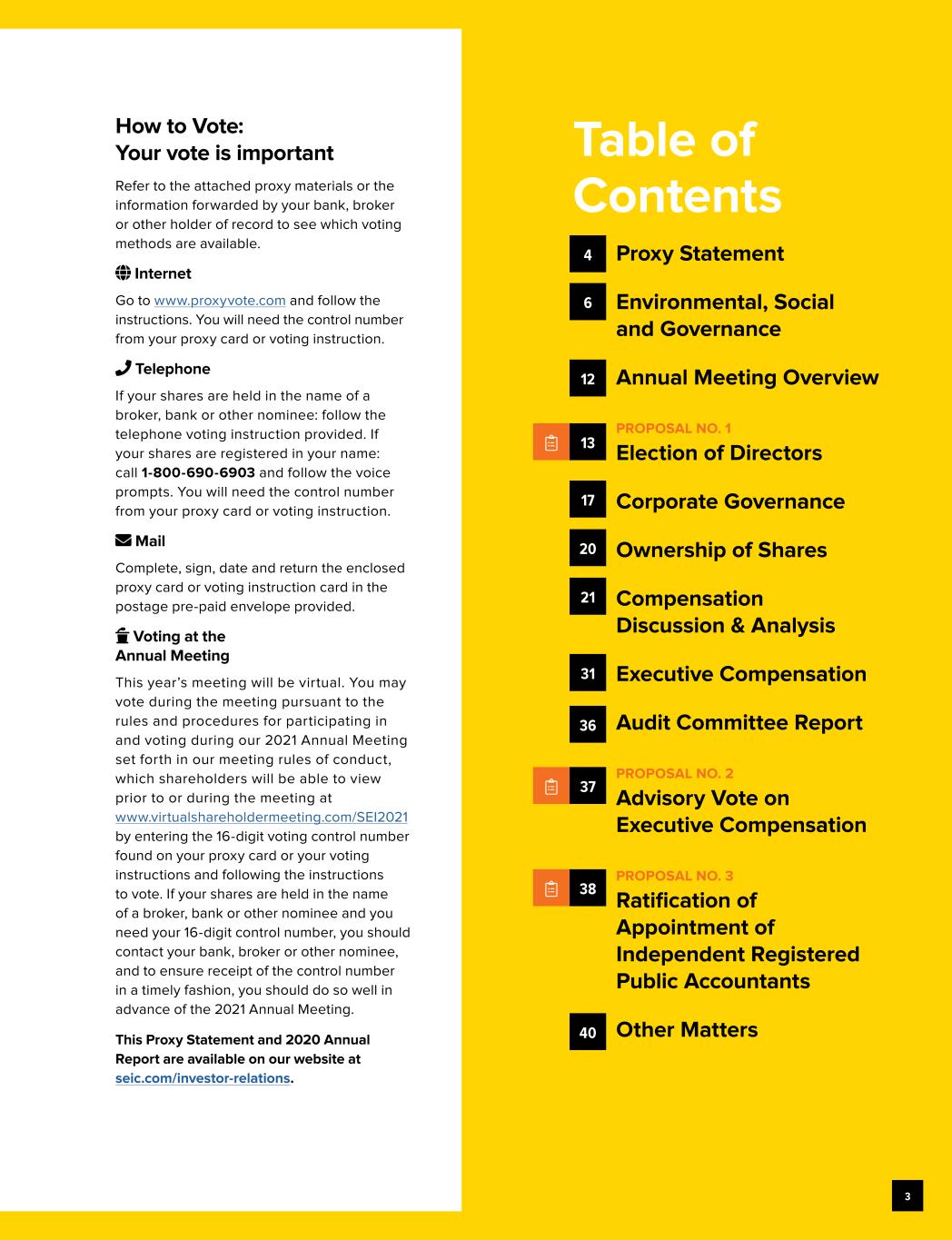
How to Vote: Your vote is important Refer to the attached proxy materials or the information forwarded by your bank, broker or other holder of record to see which voting methods are available. globe Internet Go to www.proxyvote.com and follow the instructions. You will need the control number from your proxy card or voting instruction. phone Telephone If your shares are held in the name of a broker, bank or other nominee: follow the telephone voting instruction provided. If your shares are registered in your name: call 1-800-690-6903 and follow the voice prompts. You will need the control number from your proxy card or voting instruction. envelope Mail Complete, sign, date and return the enclosed proxy card or voting instruction card in the postage pre-paid envelope provided. podium Voting at the Annual Meeting This year’s meeting will be virtual. You may vote during the meeting pursuant to the rules and procedures for participating in and voting during our 2021 Annual Meeting set forth in our meeting rules of conduct, which shareholders will be able to view prior to or during the meeting at www.virtualshareholdermeeting.com/SEI2021 by entering the 16-digit voting control number found on your proxy card or your voting instructions and following the instructions to vote. If your shares are held in the name of a broker, bank or other nominee and you need your 16-digit control number, you should contact your bank, broker or other nominee, and to ensure receipt of the control number in a timely fashion, you should do so well in advance of the 2021 Annual Meeting. This Proxy Statement and 2020 Annual Report are available on our website at seic.com/investor-relations. Table of Contents Proxy Statement Environmental, Social and Governance Annual Meeting Overview PROPOSAL NO. 1 Election of Directors Corporate Governance Ownership of Shares Compensation Discussion & Analysis Executive Compensation Audit Committee Report PROPOSAL NO. 2 Advisory Vote on Executive Compensation PROPOSAL NO. 3 Ratification of Appointment of Independent Registered Public Accountants Other Matters 13 6 4 12 37 38 17 20 21 31 36 40 CLIPBOARD-LIST CLIPBOARD-LIST CLIPBOARD-LIST 3
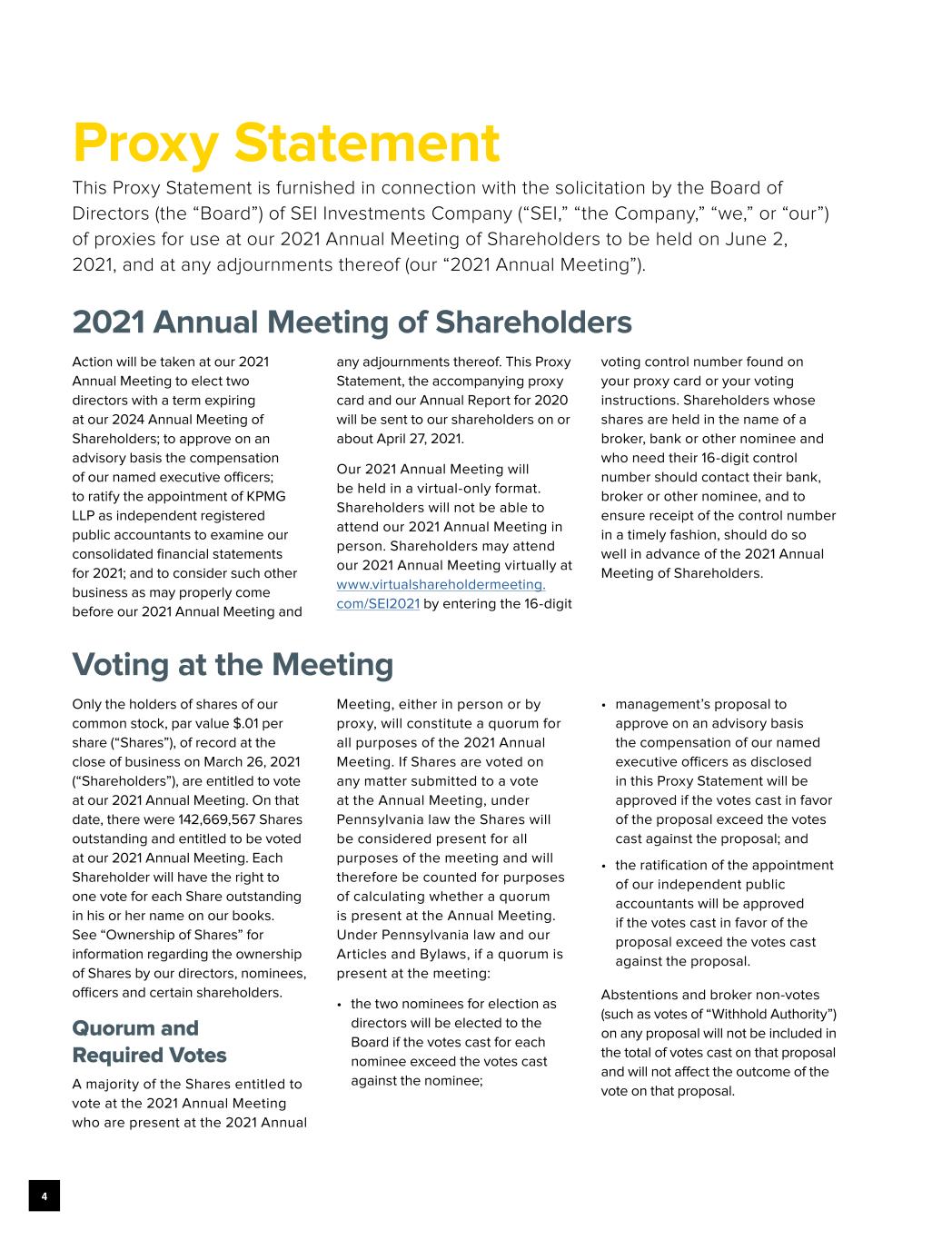
Proxy Statement This Proxy Statement is furnished in connection with the solicitation by the Board of Directors (the “Board”) of SEI Investments Company (“SEI,” “the Company,” “we,” or “our”) of proxies for use at our 2021 Annual Meeting of Shareholders to be held on June 2, 2021, and at any adjournments thereof (our “2021 Annual Meeting”). 2021 Annual Meeting of Shareholders Action will be taken at our 2021 Annual Meeting to elect two directors with a term expiring at our 2024 Annual Meeting of Shareholders; to approve on an advisory basis the compensation of our named executive officers; to ratify the appointment of KPMG LLP as independent registered public accountants to examine our consolidated financial statements for 2021; and to consider such other business as may properly come before our 2021 Annual Meeting and any adjournments thereof. This Proxy Statement, the accompanying proxy card and our Annual Report for 2020 will be sent to our shareholders on or about April 27, 2021. Our 2021 Annual Meeting will be held in a virtual-only format. Shareholders will not be able to attend our 2021 Annual Meeting in person. Shareholders may attend our 2021 Annual Meeting virtually at www.virtualshareholdermeeting. com/SEI2021 by entering the 16-digit voting control number found on your proxy card or your voting instructions. Shareholders whose shares are held in the name of a broker, bank or other nominee and who need their 16-digit control number should contact their bank, broker or other nominee, and to ensure receipt of the control number in a timely fashion, should do so well in advance of the 2021 Annual Meeting of Shareholders. Voting at the Meeting Only the holders of shares of our common stock, par value $.01 per share (“Shares”), of record at the close of business on March 26, 2021 (“Shareholders”), are entitled to vote at our 2021 Annual Meeting. On that date, there were 142,669,567 Shares outstanding and entitled to be voted at our 2021 Annual Meeting. Each Shareholder will have the right to one vote for each Share outstanding in his or her name on our books. See “Ownership of Shares” for information regarding the ownership of Shares by our directors, nominees, officers and certain shareholders. Quorum and Required Votes A majority of the Shares entitled to vote at the 2021 Annual Meeting who are present at the 2021 Annual Meeting, either in person or by proxy, will constitute a quorum for all purposes of the 2021 Annual Meeting. If Shares are voted on any matter submitted to a vote at the Annual Meeting, under Pennsylvania law the Shares will be considered present for all purposes of the meeting and will therefore be counted for purposes of calculating whether a quorum is present at the Annual Meeting. Under Pennsylvania law and our Articles and Bylaws, if a quorum is present at the meeting: • the two nominees for election as directors will be elected to the Board if the votes cast for each nominee exceed the votes cast against the nominee; • management’s proposal to approve on an advisory basis the compensation of our named executive officers as disclosed in this Proxy Statement will be approved if the votes cast in favor of the proposal exceed the votes cast against the proposal; and • the ratification of the appointment of our independent public accountants will be approved if the votes cast in favor of the proposal exceed the votes cast against the proposal. Abstentions and broker non-votes (such as votes of “Withhold Authority”) on any proposal will not be included in the total of votes cast on that proposal and will not affect the outcome of the vote on that proposal. 4
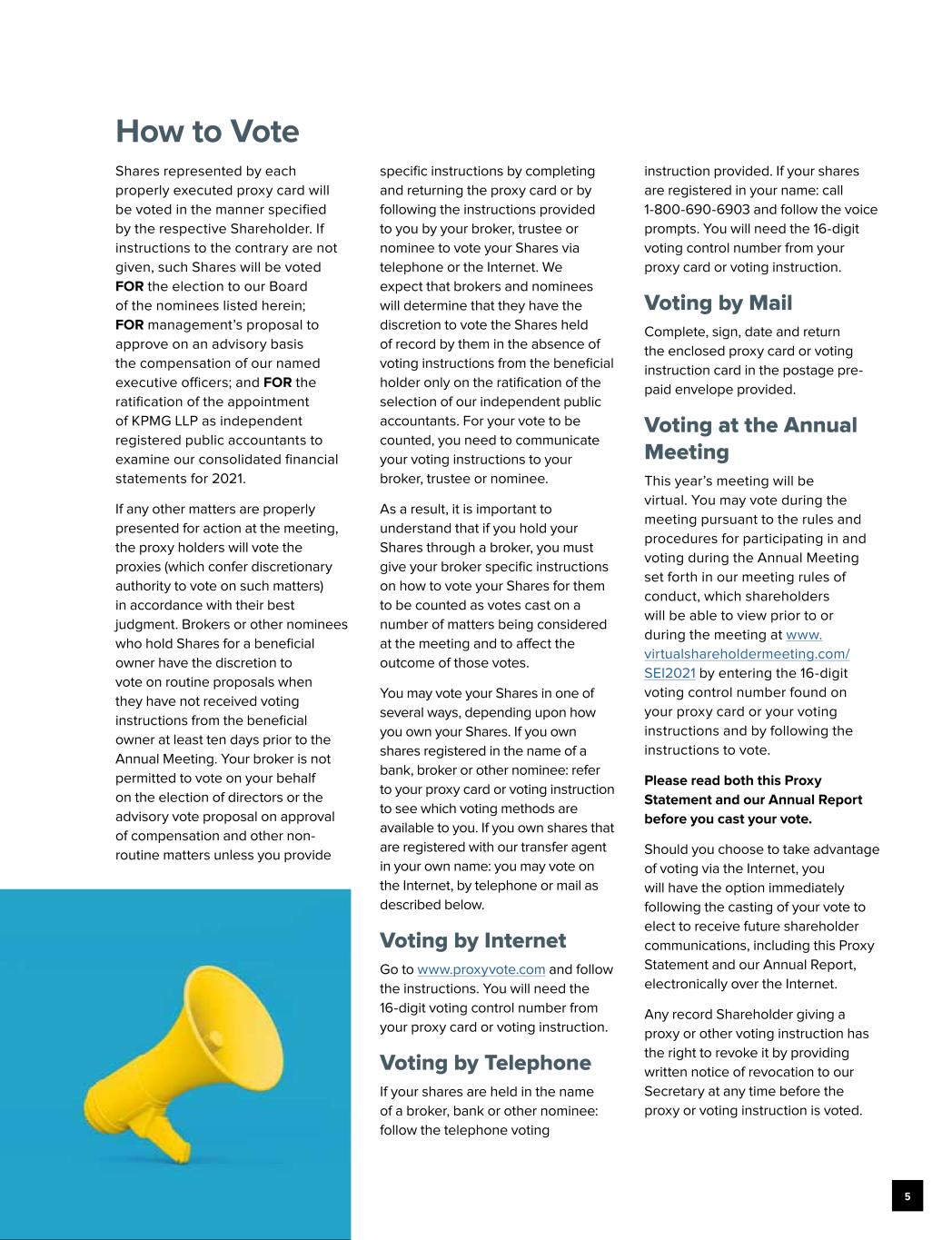
How to Vote Shares represented by each properly executed proxy card will be voted in the manner specified by the respective Shareholder. If instructions to the contrary are not given, such Shares will be voted FOR the election to our Board of the nominees listed herein; FOR management’s proposal to approve on an advisory basis the compensation of our named executive officers; and FOR the ratification of the appointment of KPMG LLP as independent registered public accountants to examine our consolidated financial statements for 2021. If any other matters are properly presented for action at the meeting, the proxy holders will vote the proxies (which confer discretionary authority to vote on such matters) in accordance with their best judgment. Brokers or other nominees who hold Shares for a beneficial owner have the discretion to vote on routine proposals when they have not received voting instructions from the beneficial owner at least ten days prior to the Annual Meeting. Your broker is not permitted to vote on your behalf on the election of directors or the advisory vote proposal on approval of compensation and other non- routine matters unless you provide specific instructions by completing and returning the proxy card or by following the instructions provided to you by your broker, trustee or nominee to vote your Shares via telephone or the Internet. We expect that brokers and nominees will determine that they have the discretion to vote the Shares held of record by them in the absence of voting instructions from the beneficial holder only on the ratification of the selection of our independent public accountants. For your vote to be counted, you need to communicate your voting instructions to your broker, trustee or nominee. As a result, it is important to understand that if you hold your Shares through a broker, you must give your broker specific instructions on how to vote your Shares for them to be counted as votes cast on a number of matters being considered at the meeting and to affect the outcome of those votes. You may vote your Shares in one of several ways, depending upon how you own your Shares. If you own shares registered in the name of a bank, broker or other nominee: refer to your proxy card or voting instruction to see which voting methods are available to you. If you own shares that are registered with our transfer agent in your own name: you may vote on the Internet, by telephone or mail as described below. Voting by Internet Go to www.proxyvote.com and follow the instructions. You will need the 16-digit voting control number from your proxy card or voting instruction. Voting by Telephone If your shares are held in the name of a broker, bank or other nominee: follow the telephone voting instruction provided. If your shares are registered in your name: call 1-800-690-6903 and follow the voice prompts. You will need the 16-digit voting control number from your proxy card or voting instruction. Voting by Mail Complete, sign, date and return the enclosed proxy card or voting instruction card in the postage pre- paid envelope provided. Voting at the Annual Meeting This year’s meeting will be virtual. You may vote during the meeting pursuant to the rules and procedures for participating in and voting during the Annual Meeting set forth in our meeting rules of conduct, which shareholders will be able to view prior to or during the meeting at www. virtualshareholdermeeting.com/ SEI2021 by entering the 16-digit voting control number found on your proxy card or your voting instructions and by following the instructions to vote. Please read both this Proxy Statement and our Annual Report before you cast your vote. Should you choose to take advantage of voting via the Internet, you will have the option immediately following the casting of your vote to elect to receive future shareholder communications, including this Proxy Statement and our Annual Report, electronically over the Internet. Any record Shareholder giving a proxy or other voting instruction has the right to revoke it by providing written notice of revocation to our Secretary at any time before the proxy or voting instruction is voted. 5

Environmental, Social and Governance We have always believed in the power of discussion and open dialogue, and it took center stage in 2020. We launched new avenues for employee connection designed to foster an open and inclusive culture, regardless of geographic location. Making Progress in the Workplace Our U.S. and U.K. offices took conversations about diversity, the Black Lives Matter movement, as well as their own experiences, and transformed them into the “Let’s Listen” series, hosted by our SEI Diversity affinity group. In addition to—and in response to—our collective conversations, we took steps to keep the conversation going, including: • Creating a senior management subcommittee, focused on equity and opportunity within our global workforce. The subcommittee has partnered with our SEI Diversity affinity group to explore opportunities to expand our inclusion work—not just at SEI, but in the communities where we live and work • Founding the SEI Black Professionals Network (SBPN), a subgroup of the SEI Diversity affinity group. SBPN is a grassroots initiative that stemmed from connections made during the “Let’s Listen” series. SBPN seeks to connect colleagues from around the globe and provide education, professional development and networking with a lens and focus on the Black and African ancestry population • Having more conversations through a new corporate podcast, “The Intersection,” bringing inclusion and belonging to the forefront of several episodes • Providing employees with opportunities to hear from professional speakers on a variety of topics, such as a session with one of the remaining Holocaust survivors, who shared his personal journey and experience living through the Holocaust • Enhancing our internal education curriculum by creating our “Beyond Bias – Understanding Active Allyship and Microaggressions” interactive class for employees and contractors to understand the lifecycle of bias and how to confront microagressions 6
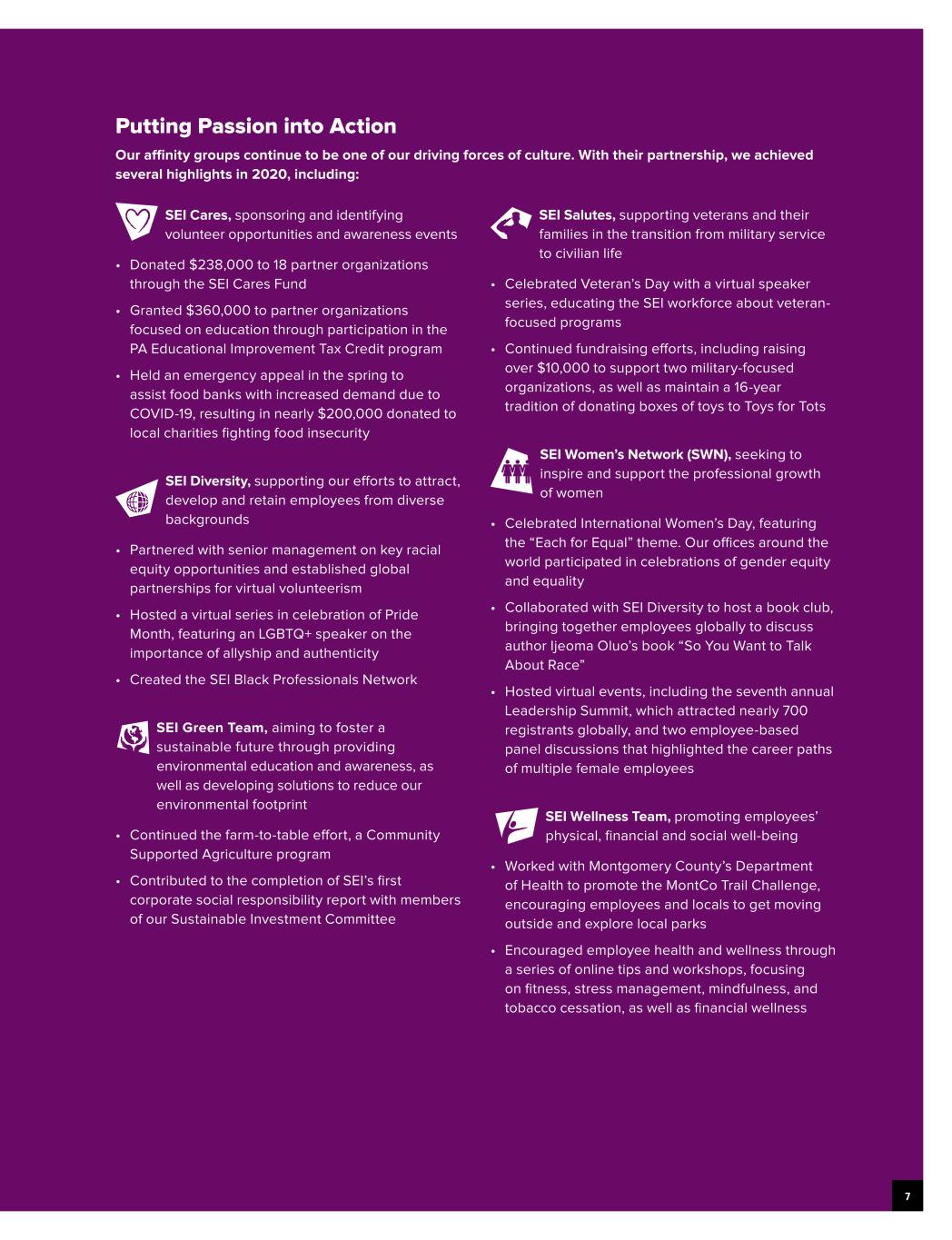
Putting Passion into Action Our affinity groups continue to be one of our driving forces of culture. With their partnership, we achieved several highlights in 2020, including: SEI Cares, sponsoring and identifying volunteer opportunities and awareness events • Donated $238,000 to 18 partner organizations through the SEI Cares Fund • Granted $360,000 to partner organizations focused on education through participation in the PA Educational Improvement Tax Credit program • Held an emergency appeal in the spring to assist food banks with increased demand due to COVID-19, resulting in nearly $200,000 donated to local charities fighting food insecurity SEI Diversity, supporting our efforts to attract, develop and retain employees from diverse backgrounds • Partnered with senior management on key racial equity opportunities and established global partnerships for virtual volunteerism • Hosted a virtual series in celebration of Pride Month, featuring an LGBTQ+ speaker on the importance of allyship and authenticity • Created the SEI Black Professionals Network SEI Green Team, aiming to foster a sustainable future through providing environmental education and awareness, as well as developing solutions to reduce our environmental footprint • Continued the farm-to-table effort, a Community Supported Agriculture program • Contributed to the completion of SEI’s first corporate social responsibility report with members of our Sustainable Investment Committee SEI Salutes, supporting veterans and their families in the transition from military service to civilian life • Celebrated Veteran’s Day with a virtual speaker series, educating the SEI workforce about veteran- focused programs • Continued fundraising efforts, including raising over $10,000 to support two military-focused organizations, as well as maintain a 16-year tradition of donating boxes of toys to Toys for Tots SEI Women’s Network (SWN), seeking to inspire and support the professional growth of women • Celebrated International Women’s Day, featuring the “Each for Equal” theme. Our offices around the world participated in celebrations of gender equity and equality • Collaborated with SEI Diversity to host a book club, bringing together employees globally to discuss author Ijeoma Oluo’s book “So You Want to Talk About Race” • Hosted virtual events, including the seventh annual Leadership Summit, which attracted nearly 700 registrants globally, and two employee-based panel discussions that highlighted the career paths of multiple female employees SEI Wellness Team, promoting employees’ physical, financial and social well-being • Worked with Montgomery County’s Department of Health to promote the MontCo Trail Challenge, encouraging employees and locals to get moving outside and explore local parks • Encouraged employee health and wellness through a series of online tips and workshops, focusing on fitness, stress management, mindfulness, and tobacco cessation, as well as financial wellness 7
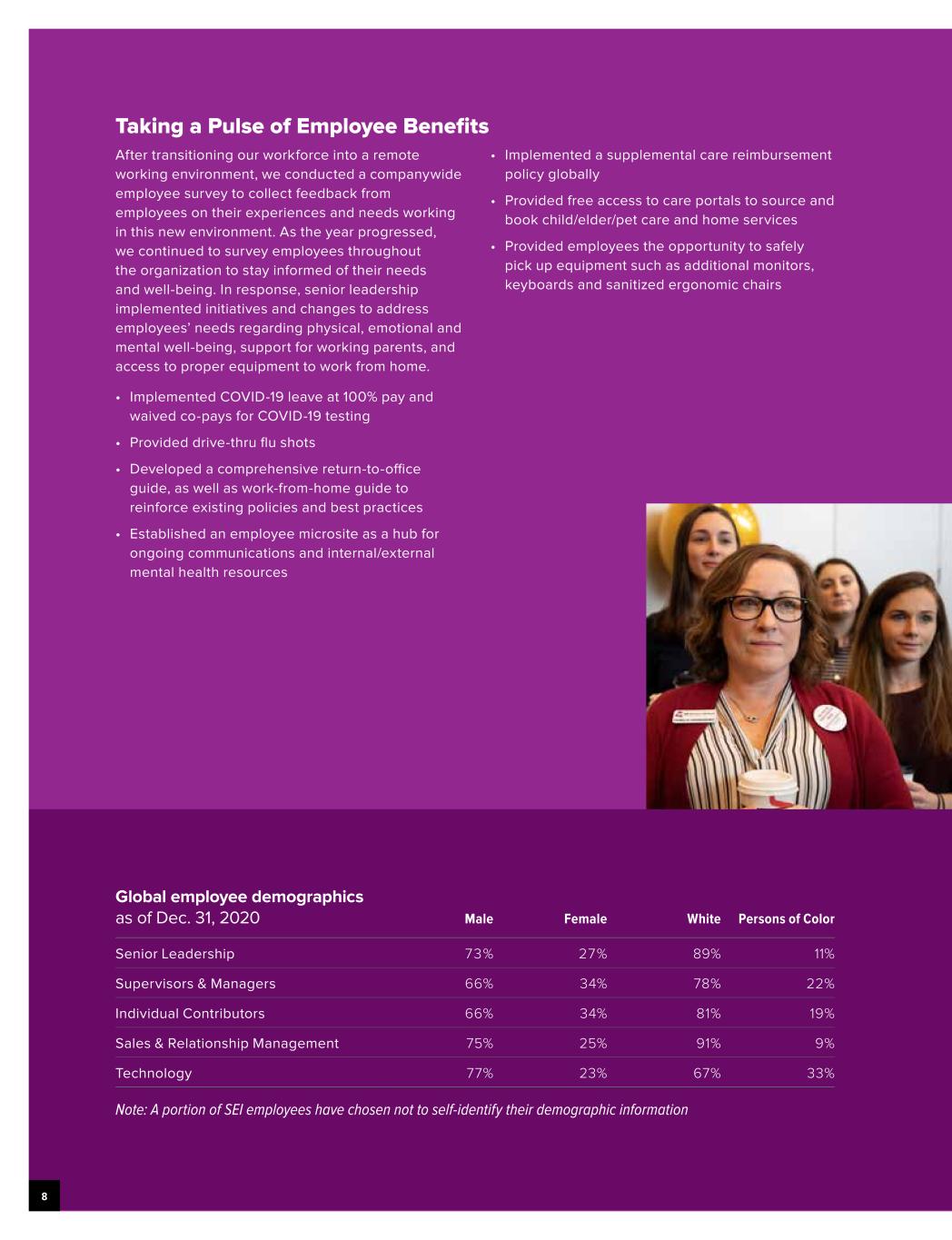
Taking a Pulse of Employee Benefits After transitioning our workforce into a remote working environment, we conducted a companywide employee survey to collect feedback from employees on their experiences and needs working in this new environment. As the year progressed, we continued to survey employees throughout the organization to stay informed of their needs and well-being. In response, senior leadership implemented initiatives and changes to address employees’ needs regarding physical, emotional and mental well-being, support for working parents, and access to proper equipment to work from home. • Implemented COVID-19 leave at 100% pay and waived co-pays for COVID-19 testing • Provided drive-thru flu shots • Developed a comprehensive return-to-office guide, as well as work-from-home guide to reinforce existing policies and best practices • Established an employee microsite as a hub for ongoing communications and internal/external mental health resources • Implemented a supplemental care reimbursement policy globally • Provided free access to care portals to source and book child/elder/pet care and home services • Provided employees the opportunity to safely pick up equipment such as additional monitors, keyboards and sanitized ergonomic chairs Global employee demographics as of Dec. 31, 2020 Male Female White Persons of Color Senior Leadership 73% 27% 89% 11% Supervisors & Managers 66% 34% 78% 22% Individual Contributors 66% 34% 81% 19% Sales & Relationship Management 75% 25% 91% 9% Technology 77% 23% 67% 33% Note: A portion of SEI employees have chosen not to self-identify their demographic information 8

Engaging Our Communities The communities in which we live and work have always been a vital part of our company’s fabric. Throughout 2020, we launched or expanded six external partnerships, aimed at impacting youth of color and Black, Indigenous and people of color (BIPOC) communities. Chester County Futures – Expanded a scholarship program for underprivileged youth of color to help them achieve STEM-focused secondary education Best Buy/Philadelphia YMCA – Created technology centers for teens to gain access to helpful tools to further job opportunities and secondary education access BlackFem – Formed an Indianapolis-based school program, bringing daily financial literacy education to school districts in need Coded by Kids – Founded a partnership with the One Philadelphia vision to provide economic and investment education to the youth of Philadelphia by striving to remove systemic barriers that inhibit them from achieving education and financial independence Tower Hamlets Education Business Partnership – Launched a U.K.-based partnership to provide education and advancement opportunities to secondary school youth through interview practice, mentorship, CV and cover letter review, and financial literacy workshops Booklove and Beyond – Established a partnership in the U.K. to provide curated books that are representative of the demographics of the youth who attend hosted events. The partnership also connects authors from underrepresented groups to read to school children In addition, our 13th annual Rush Hour Run, held virtually, raised money for organizations that support the Black community: 100 Black Interns, Black Girls Code and the National Black Law Students Association (NBLSA). 9
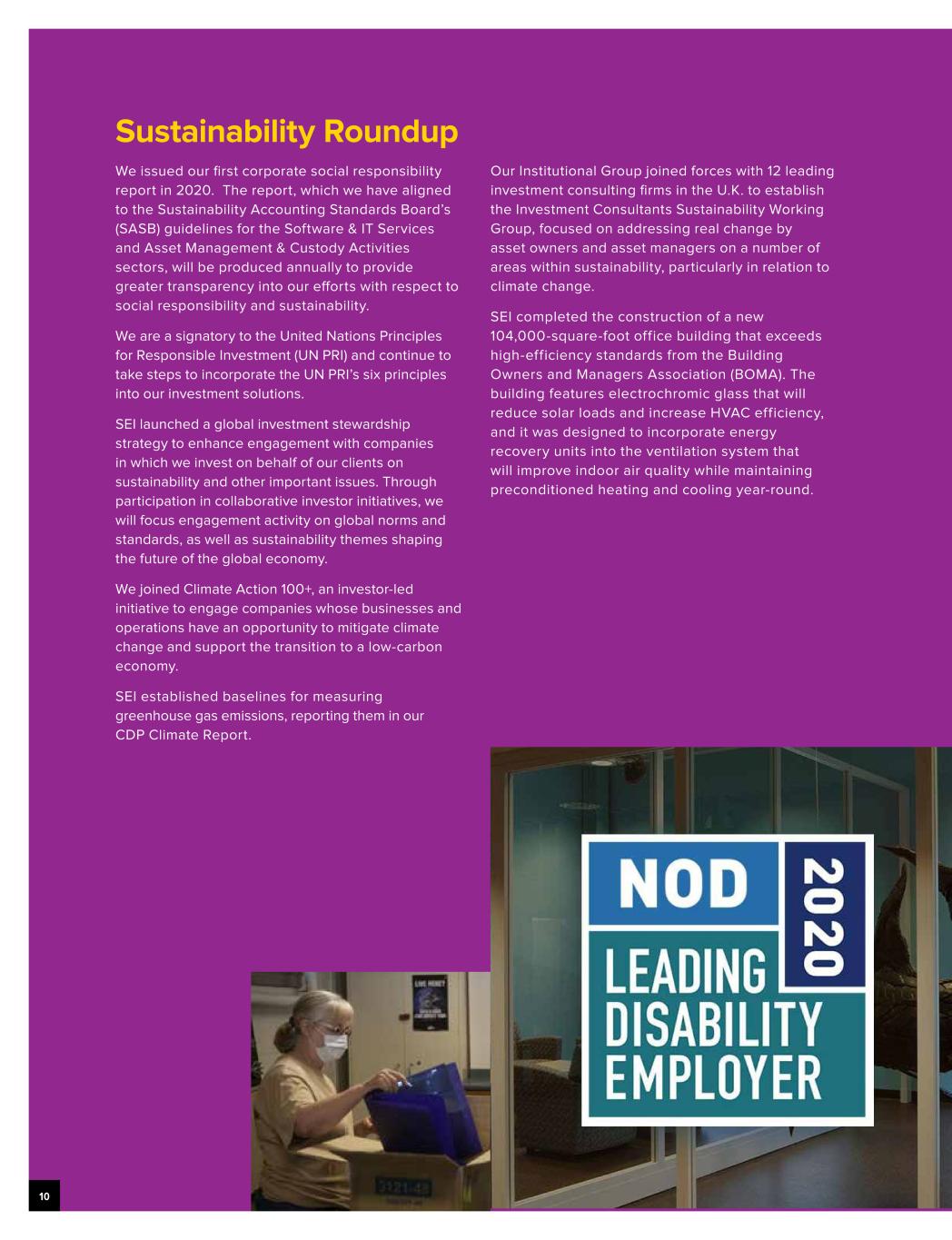
Sustainability Roundup We issued our first corporate social responsibility report in 2020. The report, which we have aligned to the Sustainability Accounting Standards Board’s (SASB) guidelines for the Software & IT Services and Asset Management & Custody Activities sectors, will be produced annually to provide greater transparency into our efforts with respect to social responsibility and sustainability. We are a signatory to the United Nations Principles for Responsible Investment (UN PRI) and continue to take steps to incorporate the UN PRI’s six principles into our investment solutions. SEI launched a global investment stewardship strategy to enhance engagement with companies in which we invest on behalf of our clients on sustainability and other important issues. Through participation in collaborative investor initiatives, we will focus engagement activity on global norms and standards, as well as sustainability themes shaping the future of the global economy. We joined Climate Action 100+, an investor-led initiative to engage companies whose businesses and operations have an opportunity to mitigate climate change and support the transition to a low-carbon economy. SEI established baselines for measuring greenhouse gas emissions, reporting them in our CDP Climate Report. Our Institutional Group joined forces with 12 leading investment consulting firms in the U.K. to establish the Investment Consultants Sustainability Working Group, focused on addressing real change by asset owners and asset managers on a number of areas within sustainability, particularly in relation to climate change. SEI completed the construction of a new 104,000-square-foot office building that exceeds high-efficiency standards from the Building Owners and Managers Association (BOMA). The building features electrochromic glass that will reduce solar loads and increase HVAC efficiency, and it was designed to incorporate energy recovery units into the ventilation system that will improve indoor air quality while maintaining preconditioned heating and cooling year-round. 10
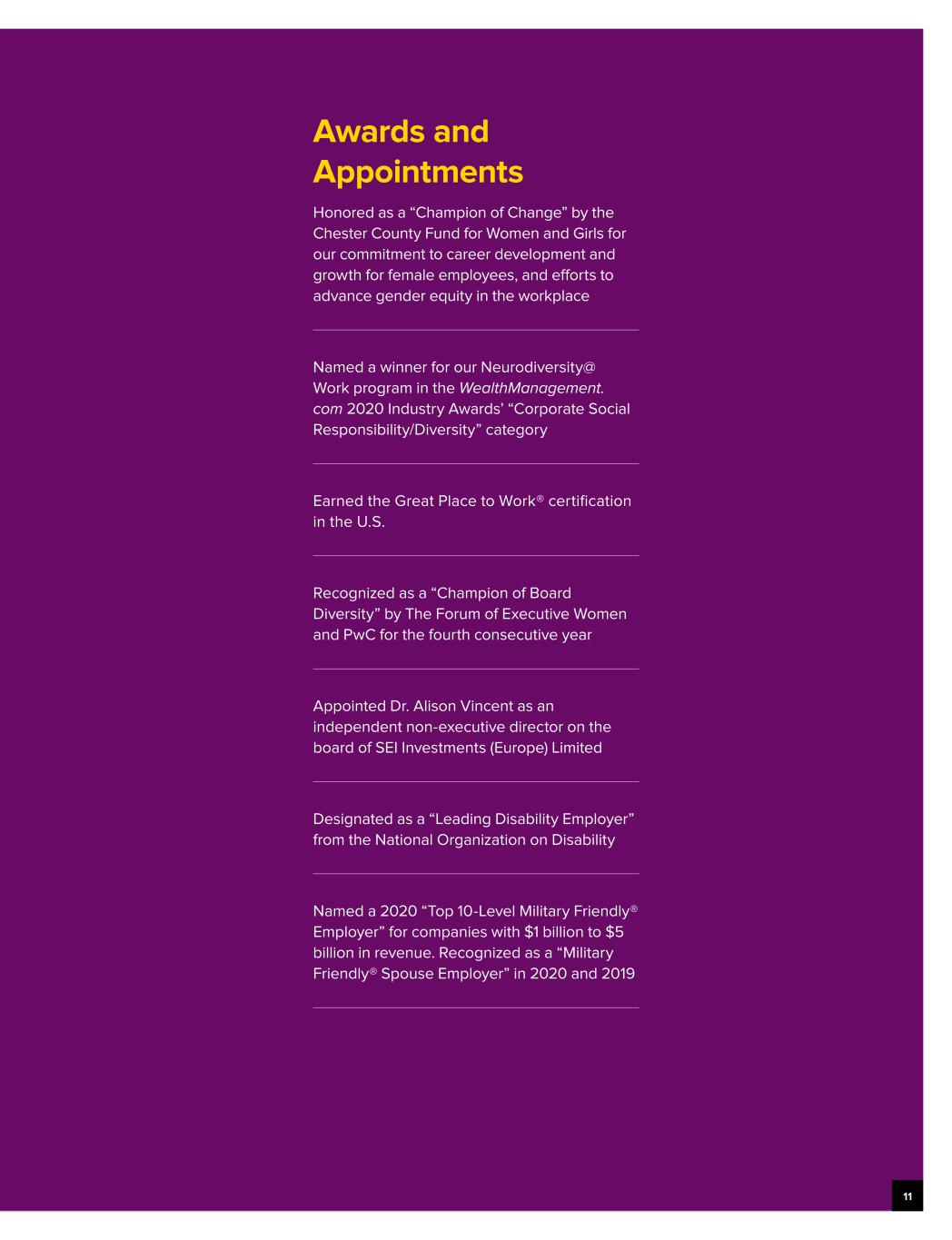
Awards and Appointments Honored as a “Champion of Change” by the Chester County Fund for Women and Girls for our commitment to career development and growth for female employees, and efforts to advance gender equity in the workplace Named a winner for our Neurodiversity@ Work program in the WealthManagement. com 2020 Industry Awards’ “Corporate Social Responsibility/Diversity” category Earned the Great Place to Work® certification in the U.S. Recognized as a “Champion of Board Diversity” by The Forum of Executive Women and PwC for the fourth consecutive year Appointed Dr. Alison Vincent as an independent non-executive director on the board of SEI Investments (Europe) Limited Designated as a “Leading Disability Employer” from the National Organization on Disability Named a 2020 “Top 10-Level Military Friendly® Employer” for companies with $1 billion to $5 billion in revenue. Recognized as a “Military Friendly® Spouse Employer” in 2020 and 2019 11
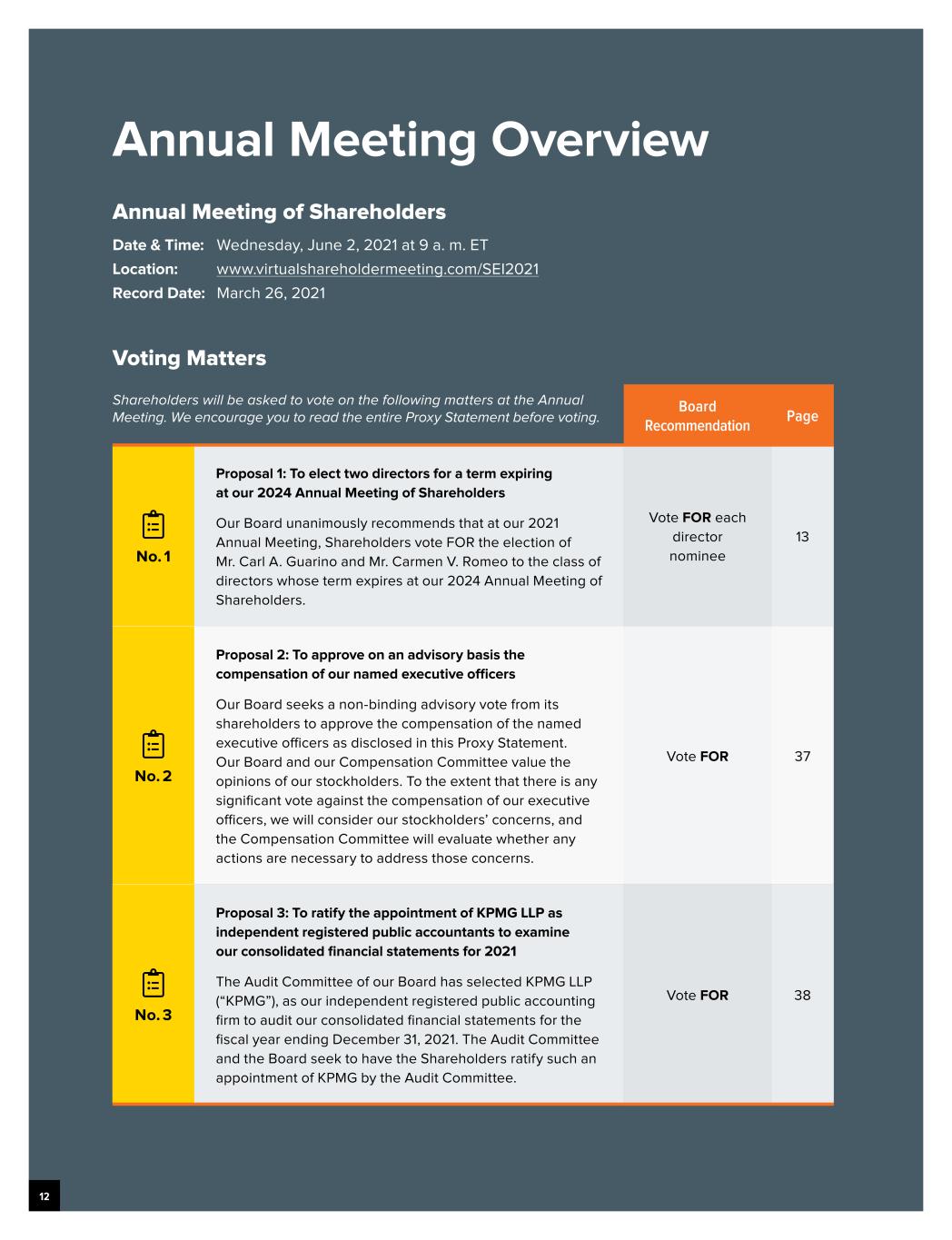
Annual Meeting Overview Annual Meeting of Shareholders Date & Time: Wednesday, June 2, 2021 at 9 a. m. ET Location: www.virtualshareholdermeeting.com/SEI2021 Record Date: March 26, 2021 Voting Matters Shareholders will be asked to vote on the following matters at the Annual Meeting. We encourage you to read the entire Proxy Statement before voting. Board Recommendation Page CLIPBOARD-LIST No. 1 Proposal 1: To elect two directors for a term expiring at our 2024 Annual Meeting of Shareholders Our Board unanimously recommends that at our 2021 Annual Meeting, Shareholders vote FOR the election of Mr. Carl A. Guarino and Mr. Carmen V. Romeo to the class of directors whose term expires at our 2024 Annual Meeting of Shareholders. Vote FOR each director nominee 13 CLIPBOARD-LIST No. 2 Proposal 2: To approve on an advisory basis the compensation of our named executive officers Our Board seeks a non-binding advisory vote from its shareholders to approve the compensation of the named executive officers as disclosed in this Proxy Statement. Our Board and our Compensation Committee value the opinions of our stockholders. To the extent that there is any significant vote against the compensation of our executive officers, we will consider our stockholders’ concerns, and the Compensation Committee will evaluate whether any actions are necessary to address those concerns. Vote FOR 37 CLIPBOARD-LIST No. 3 Proposal 3: To ratify the appointment of KPMG LLP as independent registered public accountants to examine our consolidated financial statements for 2021 The Audit Committee of our Board has selected KPMG LLP (“KPMG”), as our independent registered public accounting firm to audit our consolidated financial statements for the fiscal year ending December 31, 2021. The Audit Committee and the Board seek to have the Shareholders ratify such an appointment of KPMG by the Audit Committee. Vote FOR 38 12
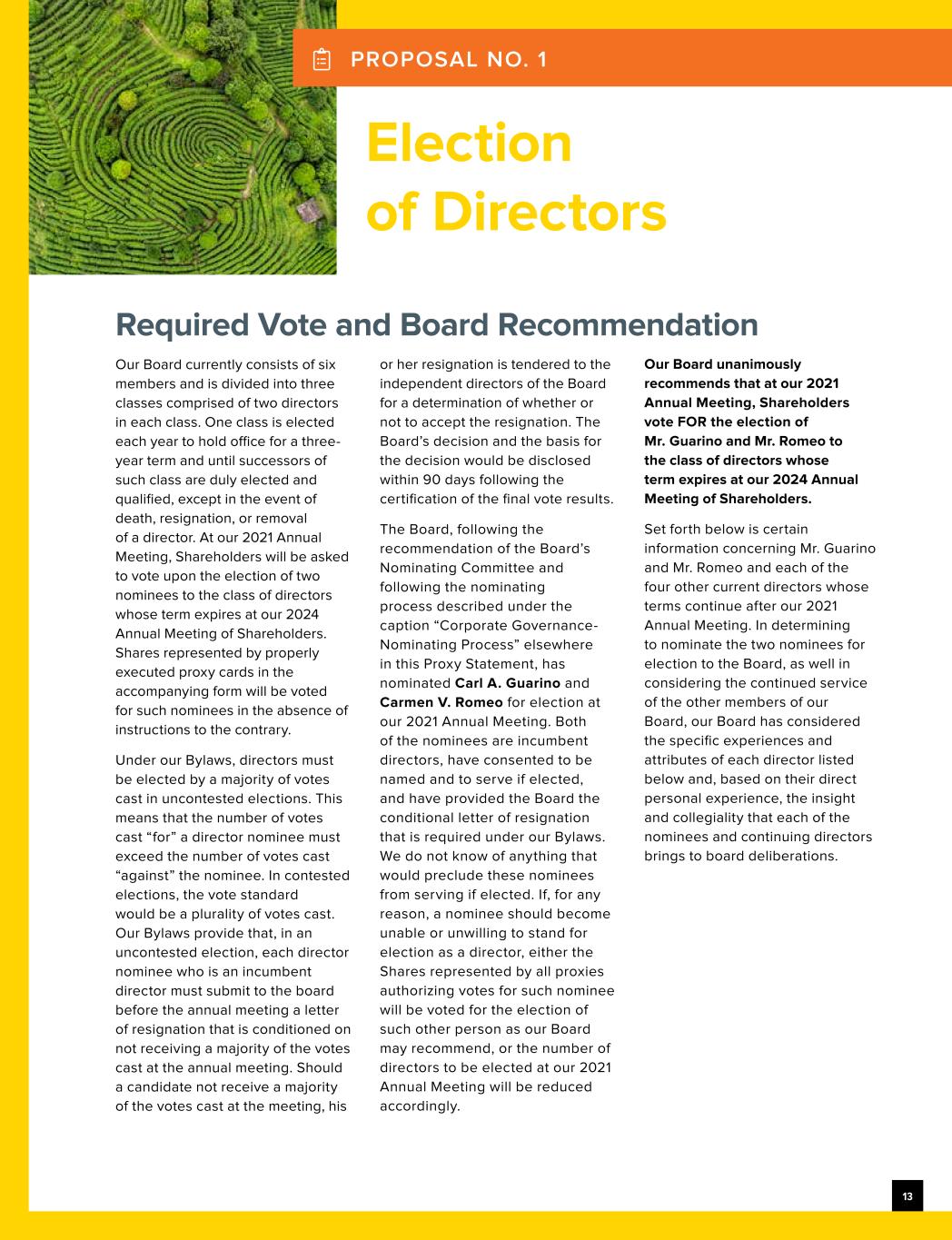
CLIPBOARD-LIST PROPOSAL NO. 1 Election of Directors Required Vote and Board Recommendation Our Board currently consists of six members and is divided into three classes comprised of two directors in each class. One class is elected each year to hold office for a three- year term and until successors of such class are duly elected and qualified, except in the event of death, resignation, or removal of a director. At our 2021 Annual Meeting, Shareholders will be asked to vote upon the election of two nominees to the class of directors whose term expires at our 2024 Annual Meeting of Shareholders. Shares represented by properly executed proxy cards in the accompanying form will be voted for such nominees in the absence of instructions to the contrary. Under our Bylaws, directors must be elected by a majority of votes cast in uncontested elections. This means that the number of votes cast “for” a director nominee must exceed the number of votes cast “against” the nominee. In contested elections, the vote standard would be a plurality of votes cast. Our Bylaws provide that, in an uncontested election, each director nominee who is an incumbent director must submit to the board before the annual meeting a letter of resignation that is conditioned on not receiving a majority of the votes cast at the annual meeting. Should a candidate not receive a majority of the votes cast at the meeting, his or her resignation is tendered to the independent directors of the Board for a determination of whether or not to accept the resignation. The Board’s decision and the basis for the decision would be disclosed within 90 days following the certification of the final vote results. The Board, following the recommendation of the Board’s Nominating Committee and following the nominating process described under the caption “Corporate Governance- Nominating Process” elsewhere in this Proxy Statement, has nominated Carl A. Guarino and Carmen V. Romeo for election at our 2021 Annual Meeting. Both of the nominees are incumbent directors, have consented to be named and to serve if elected, and have provided the Board the conditional letter of resignation that is required under our Bylaws. We do not know of anything that would preclude these nominees from serving if elected. If, for any reason, a nominee should become unable or unwilling to stand for election as a director, either the Shares represented by all proxies authorizing votes for such nominee will be voted for the election of such other person as our Board may recommend, or the number of directors to be elected at our 2021 Annual Meeting will be reduced accordingly. Our Board unanimously recommends that at our 2021 Annual Meeting, Shareholders vote FOR the election of Mr. Guarino and Mr. Romeo to the class of directors whose term expires at our 2024 Annual Meeting of Shareholders. Set forth below is certain information concerning Mr. Guarino and Mr. Romeo and each of the four other current directors whose terms continue after our 2021 Annual Meeting. In determining to nominate the two nominees for election to the Board, as well in considering the continued service of the other members of our Board, our Board has considered the specific experiences and attributes of each director listed below and, based on their direct personal experience, the insight and collegiality that each of the nominees and continuing directors brings to board deliberations. 13
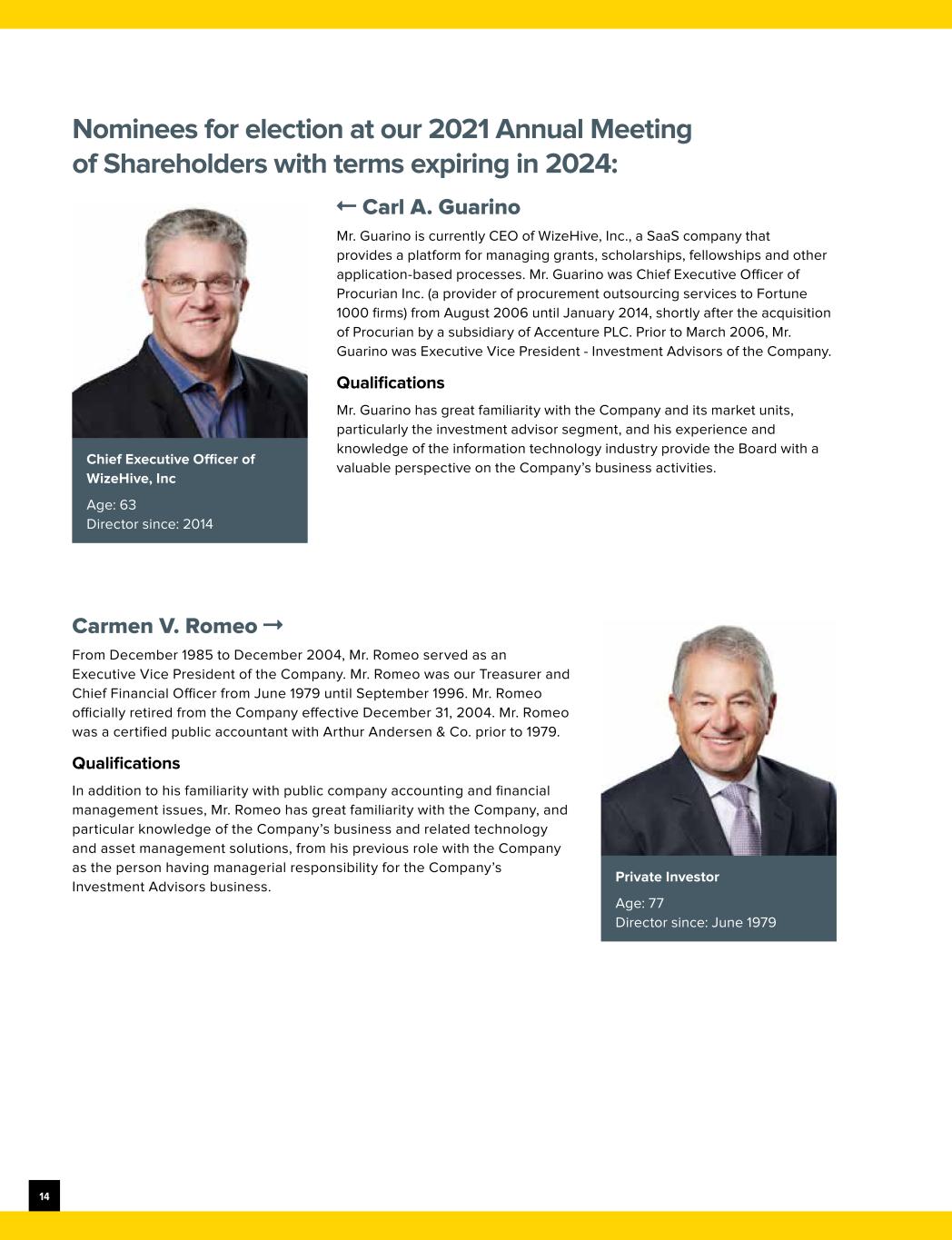
Nominees for election at our 2021 Annual Meeting of Shareholders with terms expiring in 2024: long-arrow-alt-left Carl A. Guarino Mr. Guarino is currently CEO of WizeHive, Inc., a SaaS company that provides a platform for managing grants, scholarships, fellowships and other application-based processes. Mr. Guarino was Chief Executive Officer of Procurian Inc. (a provider of procurement outsourcing services to Fortune 1000 firms) from August 2006 until January 2014, shortly after the acquisition of Procurian by a subsidiary of Accenture PLC. Prior to March 2006, Mr. Guarino was Executive Vice President - Investment Advisors of the Company. Qualifications Mr. Guarino has great familiarity with the Company and its market units, particularly the investment advisor segment, and his experience and knowledge of the information technology industry provide the Board with a valuable perspective on the Company’s business activities. Carmen V. Romeo long-arrow-alt-right From December 1985 to December 2004, Mr. Romeo served as an Executive Vice President of the Company. Mr. Romeo was our Treasurer and Chief Financial Officer from June 1979 until September 1996. Mr. Romeo officially retired from the Company effective December 31, 2004. Mr. Romeo was a certified public accountant with Arthur Andersen & Co. prior to 1979. Qualifications In addition to his familiarity with public company accounting and financial management issues, Mr. Romeo has great familiarity with the Company, and particular knowledge of the Company’s business and related technology and asset management solutions, from his previous role with the Company as the person having managerial responsibility for the Company’s Investment Advisors business. Chief Executive Officer of WizeHive, Inc Age: 63 Director since: 2014 Private Investor Age: 77 Director since: June 1979 14

Directors continuing in office with terms expiring in 2022: long-arrow-alt-left Alfred P. West, Jr. Qualifications Mr. West has been the Chairman of our Board and our Chief Executive Officer since our inception in 1968. Mr. West is our founder. He has provided the strategic vision in the development of our business and solutions since our inception and his familiarity with our customers and employees gives Mr. West insights and experience valuable to his service on the Board. William M. Doran long-arrow-alt-right From October 1976 to October 2003, Mr. Doran was a partner in the law firm of Morgan, Lewis & Bockius LLP, Philadelphia, PA, a firm that provides significant legal services to SEI, our subsidiaries and our mutual funds. Mr. Doran is a trustee of SEI Tax Exempt Trust, SEI Daily Income Trust, SEI Institutional Managed Trust, SEI Institutional International Trust, SEI Asset Allocation Trust, SEI Institutional Investments Trust, SEI Catholic Values Trust, New Covenant Funds, Adviser Managed Trust, The Advisors’ Inner Circle Fund III, Gallery Trust, Schroder Series Trust and Schroder Global Series Trust, each of which is an investment company for which our subsidiaries act as advisor, administrator and/or distributor. Mr. Doran is also a director of SEI Investments Distribution Co., SEI Investments (Asia) Limited, SEI Investments (Europe) Ltd., SEI Global Nominee Ltd., SEI Investments Global Fund Services Limited and SEI Investments Global, Limited. Qualifications Mr. Doran’s legal training and experience, his relationship with the Company as outside legal counsel for many years, and his long-standing involvement with our Company and many of its regulated subsidiaries are valuable to his service on the Board and as Chair of the Legal and Regulatory Oversight Committee. Chairman and Chief Executive Officer, SEI Age: 78 Director since: 1968 Consultant Retired Partner Morgan Lewis & Bockius LLP (Law Firm) Age: 80 Director since: March 1985 15
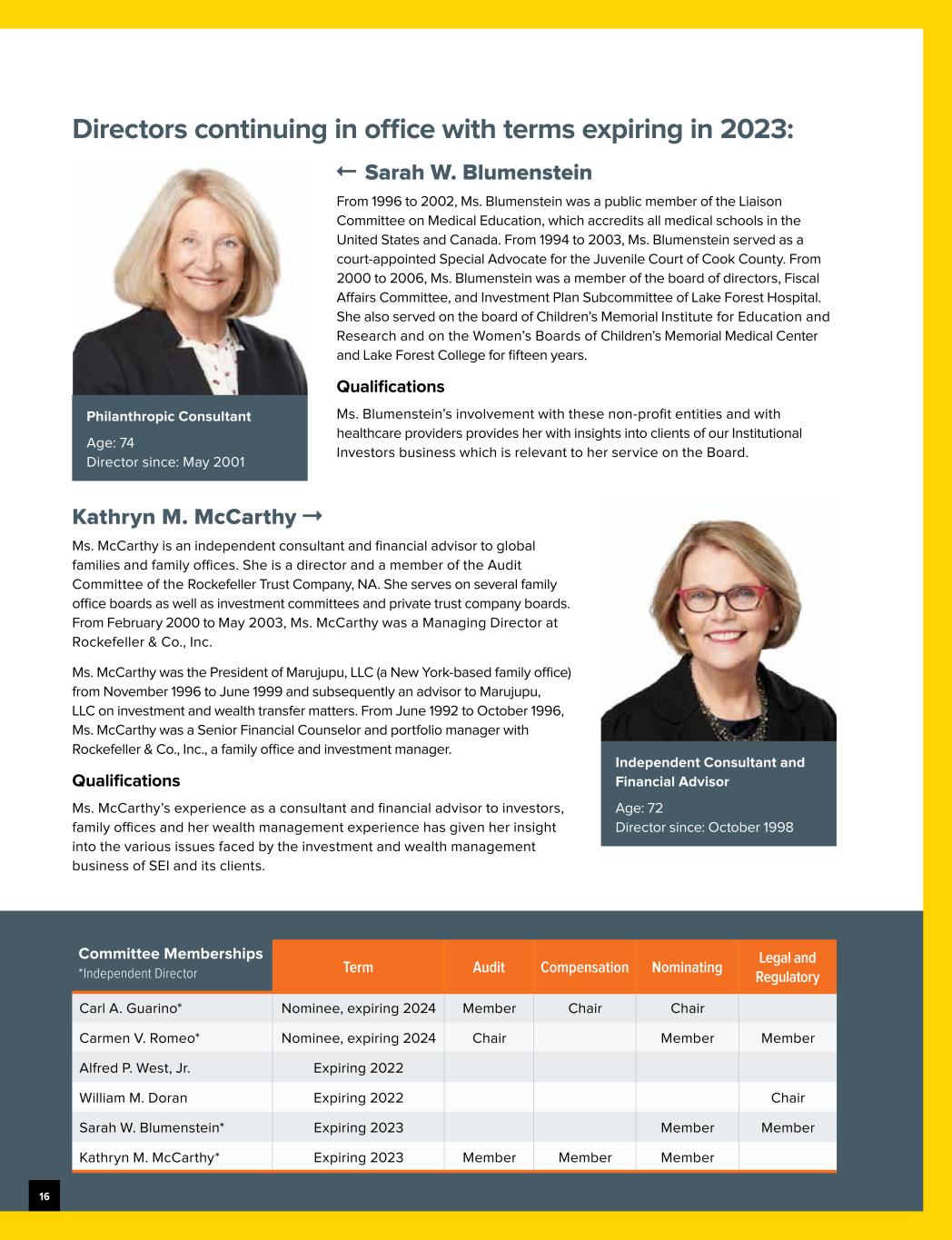
Directors continuing in office with terms expiring in 2023: long-arrow-alt-left Sarah W. Blumenstein From 1996 to 2002, Ms. Blumenstein was a public member of the Liaison Committee on Medical Education, which accredits all medical schools in the United States and Canada. From 1994 to 2003, Ms. Blumenstein served as a court-appointed Special Advocate for the Juvenile Court of Cook County. From 2000 to 2006, Ms. Blumenstein was a member of the board of directors, Fiscal Affairs Committee, and Investment Plan Subcommittee of Lake Forest Hospital. She also served on the board of Children’s Memorial Institute for Education and Research and on the Women’s Boards of Children’s Memorial Medical Center and Lake Forest College for fifteen years. Qualifications Ms. Blumenstein’s involvement with these non-profit entities and with healthcare providers provides her with insights into clients of our Institutional Investors business which is relevant to her service on the Board. Kathryn M. McCarthy long-arrow-alt-right Ms. McCarthy is an independent consultant and financial advisor to global families and family offices. She is a director and a member of the Audit Committee of the Rockefeller Trust Company, NA. She serves on several family office boards as well as investment committees and private trust company boards. From February 2000 to May 2003, Ms. McCarthy was a Managing Director at Rockefeller & Co., Inc. Ms. McCarthy was the President of Marujupu, LLC (a New York-based family office) from November 1996 to June 1999 and subsequently an advisor to Marujupu, LLC on investment and wealth transfer matters. From June 1992 to October 1996, Ms. McCarthy was a Senior Financial Counselor and portfolio manager with Rockefeller & Co., Inc., a family office and investment manager. Qualifications Ms. McCarthy’s experience as a consultant and financial advisor to investors, family offices and her wealth management experience has given her insight into the various issues faced by the investment and wealth management business of SEI and its clients. Philanthropic Consultant Age: 74 Director since: May 2001 Independent Consultant and Financial Advisor Age: 72 Director since: October 1998 Committee Memberships *Independent Director Term Audit Compensation Nominating Legal and Regulatory Carl A. Guarino* Nominee, expiring 2024 Member Chair Chair Carmen V. Romeo* Nominee, expiring 2024 Chair Member Member Alfred P. West, Jr. Expiring 2022 William M. Doran Expiring 2022 Chair Sarah W. Blumenstein* Expiring 2023 Member Member Kathryn M. McCarthy* Expiring 2023 Member Member Member 16
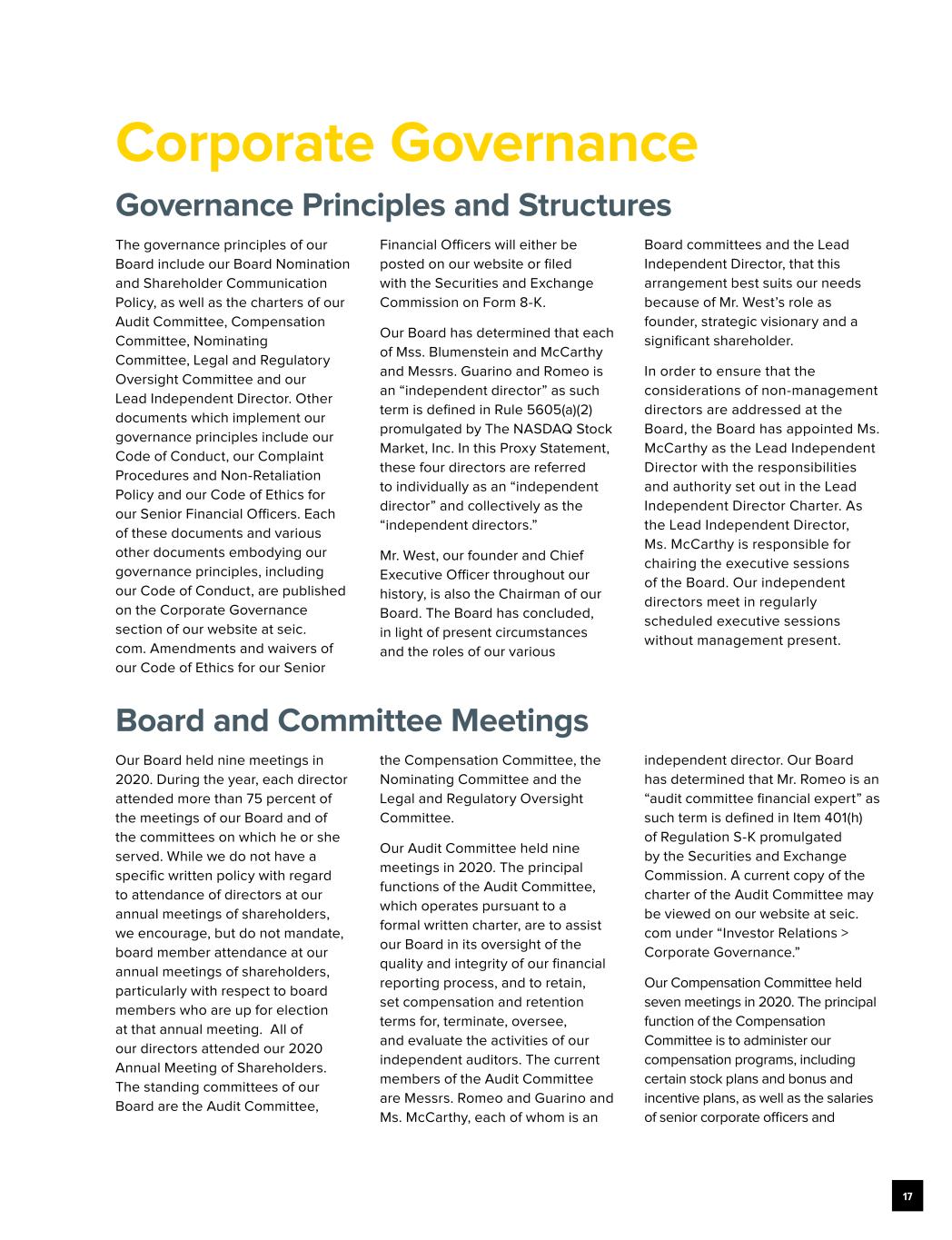
Corporate Governance Governance Principles and Structures The governance principles of our Board include our Board Nomination and Shareholder Communication Policy, as well as the charters of our Audit Committee, Compensation Committee, Nominating Committee, Legal and Regulatory Oversight Committee and our Lead Independent Director. Other documents which implement our governance principles include our Code of Conduct, our Complaint Procedures and Non-Retaliation Policy and our Code of Ethics for our Senior Financial Officers. Each of these documents and various other documents embodying our governance principles, including our Code of Conduct, are published on the Corporate Governance section of our website at seic. com. Amendments and waivers of our Code of Ethics for our Senior Financial Officers will either be posted on our website or filed with the Securities and Exchange Commission on Form 8-K. Our Board has determined that each of Mss. Blumenstein and McCarthy and Messrs. Guarino and Romeo is an “independent director” as such term is defined in Rule 5605(a)(2) promulgated by The NASDAQ Stock Market, Inc. In this Proxy Statement, these four directors are referred to individually as an “independent director” and collectively as the “independent directors.” Mr. West, our founder and Chief Executive Officer throughout our history, is also the Chairman of our Board. The Board has concluded, in light of present circumstances and the roles of our various Board committees and the Lead Independent Director, that this arrangement best suits our needs because of Mr. West’s role as founder, strategic visionary and a significant shareholder. In order to ensure that the considerations of non-management directors are addressed at the Board, the Board has appointed Ms. McCarthy as the Lead Independent Director with the responsibilities and authority set out in the Lead Independent Director Charter. As the Lead Independent Director, Ms. McCarthy is responsible for chairing the executive sessions of the Board. Our independent directors meet in regularly scheduled executive sessions without management present. Board and Committee Meetings Our Board held nine meetings in 2020. During the year, each director attended more than 75 percent of the meetings of our Board and of the committees on which he or she served. While we do not have a specific written policy with regard to attendance of directors at our annual meetings of shareholders, we encourage, but do not mandate, board member attendance at our annual meetings of shareholders, particularly with respect to board members who are up for election at that annual meeting. All of our directors attended our 2020 Annual Meeting of Shareholders. The standing committees of our Board are the Audit Committee, the Compensation Committee, the Nominating Committee and the Legal and Regulatory Oversight Committee. Our Audit Committee held nine meetings in 2020. The principal functions of the Audit Committee, which operates pursuant to a formal written charter, are to assist our Board in its oversight of the quality and integrity of our financial reporting process, and to retain, set compensation and retention terms for, terminate, oversee, and evaluate the activities of our independent auditors. The current members of the Audit Committee are Messrs. Romeo and Guarino and Ms. McCarthy, each of whom is an independent director. Our Board has determined that Mr. Romeo is an “audit committee financial expert” as such term is defined in Item 401(h) of Regulation S-K promulgated by the Securities and Exchange Commission. A current copy of the charter of the Audit Committee may be viewed on our website at seic. com under “Investor Relations > Corporate Governance.” Our Compensation Committee held seven meetings in 2020. The principal function of the Compensation Committee is to administer our compensation programs, including certain stock plans and bonus and incentive plans, as well as the salaries of senior corporate officers and 17
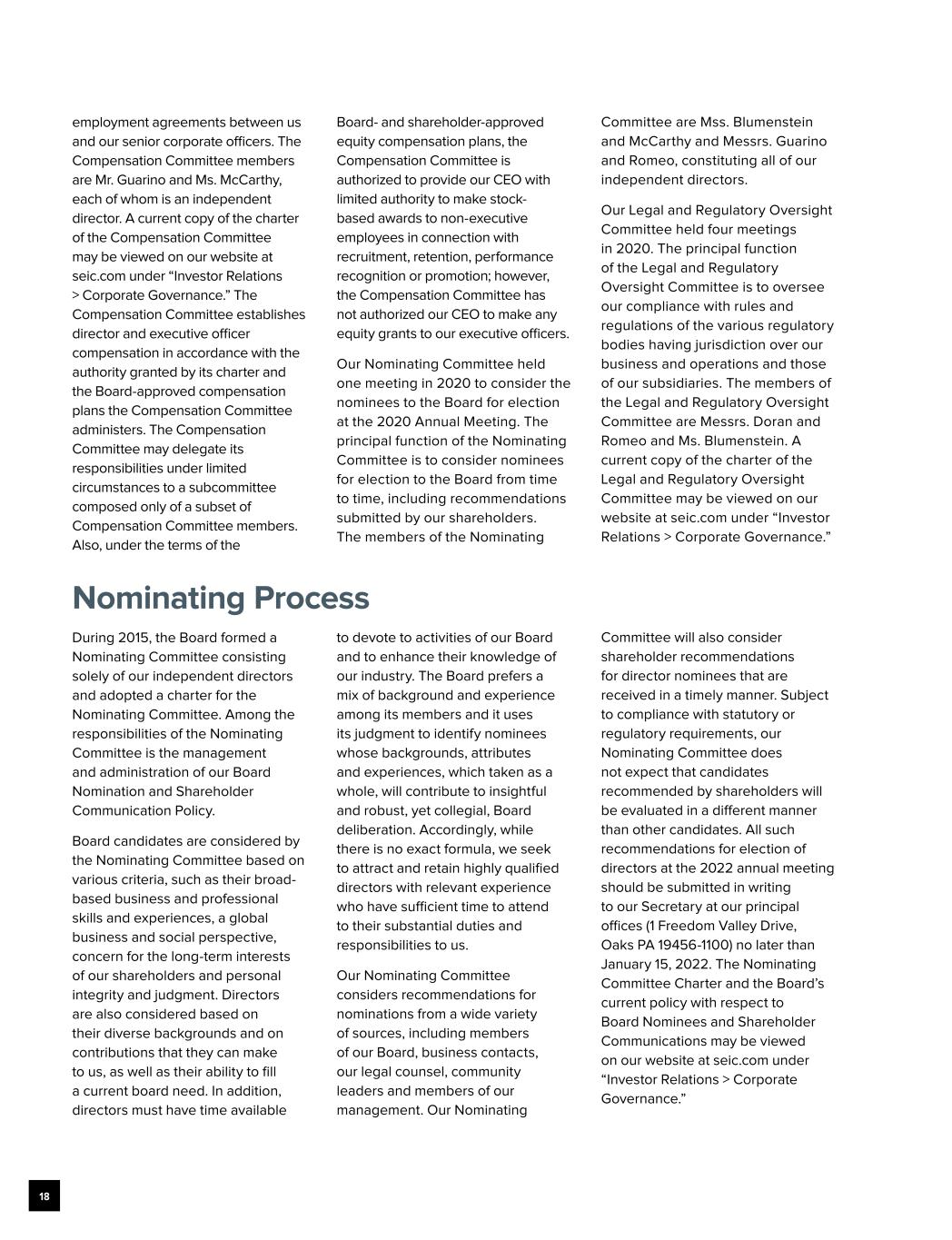
employment agreements between us and our senior corporate officers. The Compensation Committee members are Mr. Guarino and Ms. McCarthy, each of whom is an independent director. A current copy of the charter of the Compensation Committee may be viewed on our website at seic.com under “Investor Relations > Corporate Governance.” The Compensation Committee establishes director and executive officer compensation in accordance with the authority granted by its charter and the Board-approved compensation plans the Compensation Committee administers. The Compensation Committee may delegate its responsibilities under limited circumstances to a subcommittee composed only of a subset of Compensation Committee members. Also, under the terms of the Board- and shareholder-approved equity compensation plans, the Compensation Committee is authorized to provide our CEO with limited authority to make stock- based awards to non-executive employees in connection with recruitment, retention, performance recognition or promotion; however, the Compensation Committee has not authorized our CEO to make any equity grants to our executive officers. Our Nominating Committee held one meeting in 2020 to consider the nominees to the Board for election at the 2020 Annual Meeting. The principal function of the Nominating Committee is to consider nominees for election to the Board from time to time, including recommendations submitted by our shareholders. The members of the Nominating Committee are Mss. Blumenstein and McCarthy and Messrs. Guarino and Romeo, constituting all of our independent directors. Our Legal and Regulatory Oversight Committee held four meetings in 2020. The principal function of the Legal and Regulatory Oversight Committee is to oversee our compliance with rules and regulations of the various regulatory bodies having jurisdiction over our business and operations and those of our subsidiaries. The members of the Legal and Regulatory Oversight Committee are Messrs. Doran and Romeo and Ms. Blumenstein. A current copy of the charter of the Legal and Regulatory Oversight Committee may be viewed on our website at seic.com under “Investor Relations > Corporate Governance.” Nominating Process During 2015, the Board formed a Nominating Committee consisting solely of our independent directors and adopted a charter for the Nominating Committee. Among the responsibilities of the Nominating Committee is the management and administration of our Board Nomination and Shareholder Communication Policy. Board candidates are considered by the Nominating Committee based on various criteria, such as their broad- based business and professional skills and experiences, a global business and social perspective, concern for the long-term interests of our shareholders and personal integrity and judgment. Directors are also considered based on their diverse backgrounds and on contributions that they can make to us, as well as their ability to fill a current board need. In addition, directors must have time available to devote to activities of our Board and to enhance their knowledge of our industry. The Board prefers a mix of background and experience among its members and it uses its judgment to identify nominees whose backgrounds, attributes and experiences, which taken as a whole, will contribute to insightful and robust, yet collegial, Board deliberation. Accordingly, while there is no exact formula, we seek to attract and retain highly qualified directors with relevant experience who have sufficient time to attend to their substantial duties and responsibilities to us. Our Nominating Committee considers recommendations for nominations from a wide variety of sources, including members of our Board, business contacts, our legal counsel, community leaders and members of our management. Our Nominating Committee will also consider shareholder recommendations for director nominees that are received in a timely manner. Subject to compliance with statutory or regulatory requirements, our Nominating Committee does not expect that candidates recommended by shareholders will be evaluated in a different manner than other candidates. All such recommendations for election of directors at the 2022 annual meeting should be submitted in writing to our Secretary at our principal offices (1 Freedom Valley Drive, Oaks PA 19456-1100) no later than January 15, 2022. The Nominating Committee Charter and the Board’s current policy with respect to Board Nominees and Shareholder Communications may be viewed on our website at seic.com under “Investor Relations > Corporate Governance.” 18
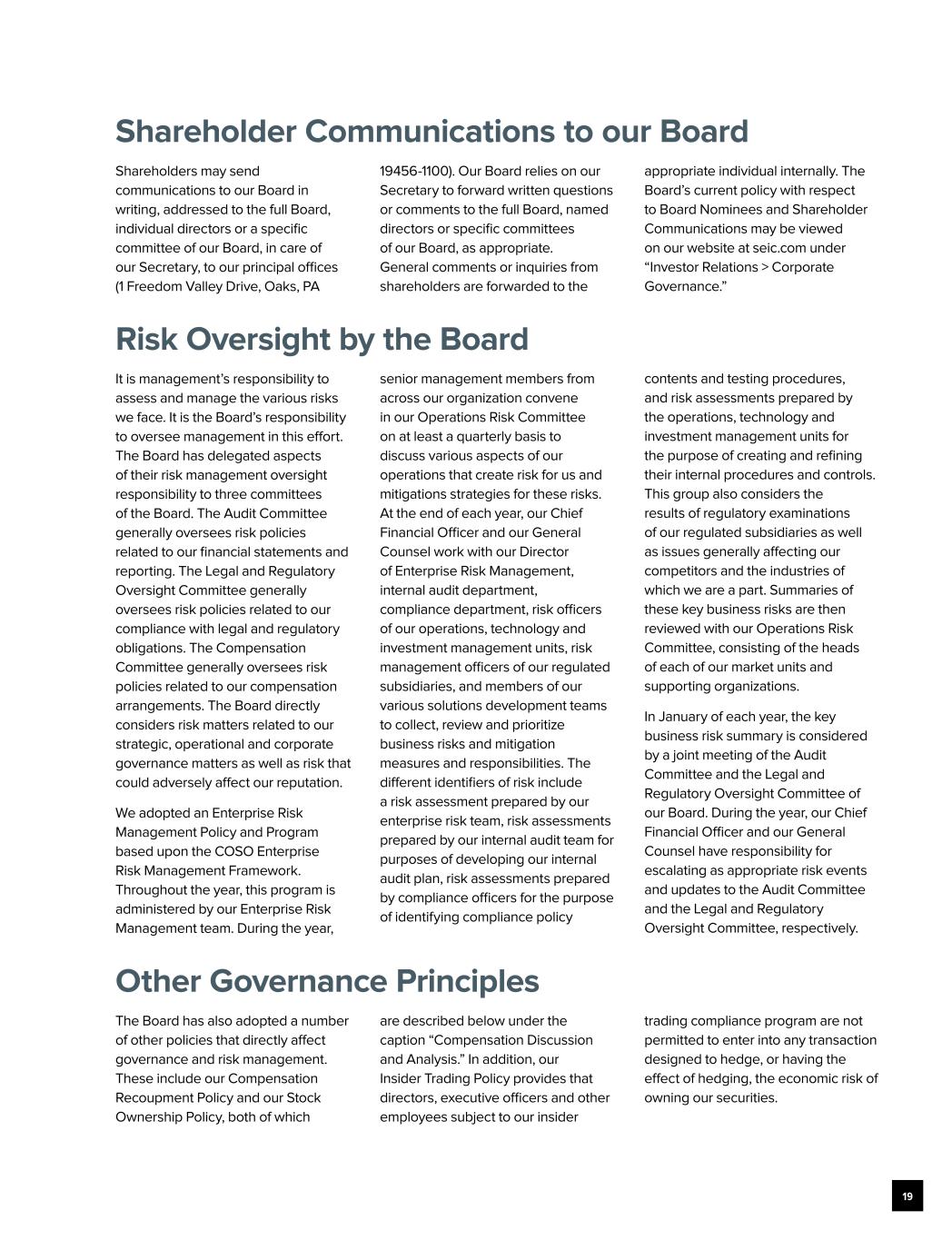
Shareholder Communications to our Board Shareholders may send communications to our Board in writing, addressed to the full Board, individual directors or a specific committee of our Board, in care of our Secretary, to our principal offices (1 Freedom Valley Drive, Oaks, PA 19456-1100). Our Board relies on our Secretary to forward written questions or comments to the full Board, named directors or specific committees of our Board, as appropriate. General comments or inquiries from shareholders are forwarded to the appropriate individual internally. The Board’s current policy with respect to Board Nominees and Shareholder Communications may be viewed on our website at seic.com under “Investor Relations > Corporate Governance.” Risk Oversight by the Board It is management’s responsibility to assess and manage the various risks we face. It is the Board’s responsibility to oversee management in this effort. The Board has delegated aspects of their risk management oversight responsibility to three committees of the Board. The Audit Committee generally oversees risk policies related to our financial statements and reporting. The Legal and Regulatory Oversight Committee generally oversees risk policies related to our compliance with legal and regulatory obligations. The Compensation Committee generally oversees risk policies related to our compensation arrangements. The Board directly considers risk matters related to our strategic, operational and corporate governance matters as well as risk that could adversely affect our reputation. We adopted an Enterprise Risk Management Policy and Program based upon the COSO Enterprise Risk Management Framework. Throughout the year, this program is administered by our Enterprise Risk Management team. During the year, senior management members from across our organization convene in our Operations Risk Committee on at least a quarterly basis to discuss various aspects of our operations that create risk for us and mitigations strategies for these risks. At the end of each year, our Chief Financial Officer and our General Counsel work with our Director of Enterprise Risk Management, internal audit department, compliance department, risk officers of our operations, technology and investment management units, risk management officers of our regulated subsidiaries, and members of our various solutions development teams to collect, review and prioritize business risks and mitigation measures and responsibilities. The different identifiers of risk include a risk assessment prepared by our enterprise risk team, risk assessments prepared by our internal audit team for purposes of developing our internal audit plan, risk assessments prepared by compliance officers for the purpose of identifying compliance policy contents and testing procedures, and risk assessments prepared by the operations, technology and investment management units for the purpose of creating and refining their internal procedures and controls. This group also considers the results of regulatory examinations of our regulated subsidiaries as well as issues generally affecting our competitors and the industries of which we are a part. Summaries of these key business risks are then reviewed with our Operations Risk Committee, consisting of the heads of each of our market units and supporting organizations. In January of each year, the key business risk summary is considered by a joint meeting of the Audit Committee and the Legal and Regulatory Oversight Committee of our Board. During the year, our Chief Financial Officer and our General Counsel have responsibility for escalating as appropriate risk events and updates to the Audit Committee and the Legal and Regulatory Oversight Committee, respectively. Other Governance Principles The Board has also adopted a number of other policies that directly affect governance and risk management. These include our Compensation Recoupment Policy and our Stock Ownership Policy, both of which are described below under the caption “Compensation Discussion and Analysis.” In addition, our Insider Trading Policy provides that directors, executive officers and other employees subject to our insider trading compliance program are not permitted to enter into any transaction designed to hedge, or having the effect of hedging, the economic risk of owning our securities. 19
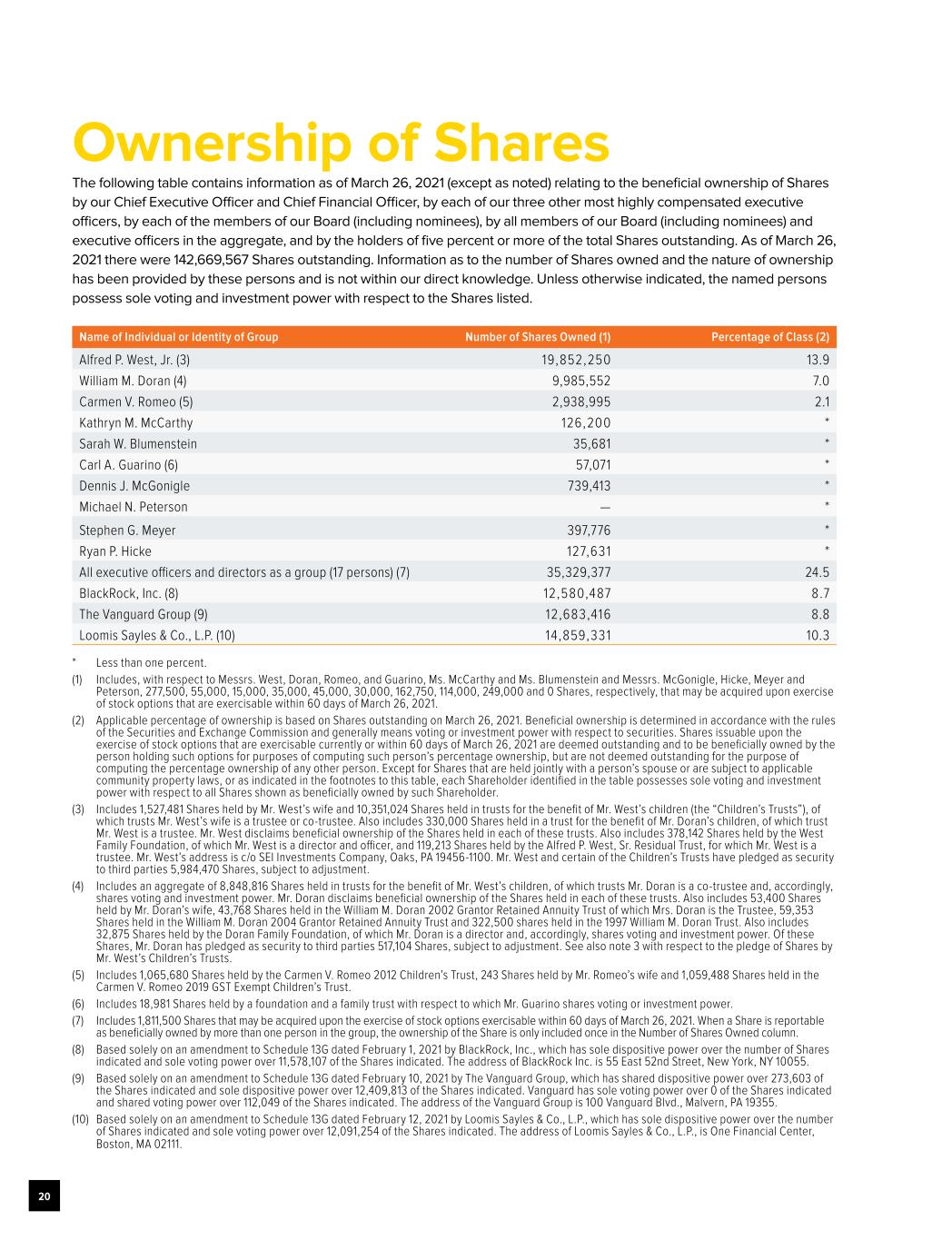
Ownership of Shares The following table contains information as of March 26, 2021 (except as noted) relating to the beneficial ownership of Shares by our Chief Executive Officer and Chief Financial Officer, by each of our three other most highly compensated executive officers, by each of the members of our Board (including nominees), by all members of our Board (including nominees) and executive officers in the aggregate, and by the holders of five percent or more of the total Shares outstanding. As of March 26, 2021 there were 142,669,567 Shares outstanding. Information as to the number of Shares owned and the nature of ownership has been provided by these persons and is not within our direct knowledge. Unless otherwise indicated, the named persons possess sole voting and investment power with respect to the Shares listed. Name of Individual or Identity of Group Number of Shares Owned (1) Percentage of Class (2) Alfred P. West, Jr. (3) 19,852,250 13.9 William M. Doran (4) 9,985,552 7.0 Carmen V. Romeo (5) 2,938,995 2.1 Kathryn M. McCarthy 126,200 * Sarah W. Blumenstein 35,681 * Carl A. Guarino (6) 57,071 * Dennis J. McGonigle 739,413 * Michael N. Peterson — * Stephen G. Meyer 397,776 * Ryan P. Hicke 127,631 * All executive officers and directors as a group (17 persons) (7) 35,329,377 24.5 BlackRock, Inc. (8) 12,580,487 8.7 The Vanguard Group (9) 12,683,416 8.8 Loomis Sayles & Co., L.P. (10) 14,859,331 10.3 * Less than one percent. (1) Includes, with respect to Messrs. West, Doran, Romeo, and Guarino, Ms. McCarthy and Ms. Blumenstein and Messrs. McGonigle, Hicke, Meyer and Peterson, 277,500, 55,000, 15,000, 35,000, 45,000, 30,000, 162,750, 114,000, 249,000 and 0 Shares, respectively, that may be acquired upon exercise of stock options that are exercisable within 60 days of March 26, 2021. (2) Applicable percentage of ownership is based on Shares outstanding on March 26, 2021. Beneficial ownership is determined in accordance with the rules of the Securities and Exchange Commission and generally means voting or investment power with respect to securities. Shares issuable upon the exercise of stock options that are exercisable currently or within 60 days of March 26, 2021 are deemed outstanding and to be beneficially owned by the person holding such options for purposes of computing such person’s percentage ownership, but are not deemed outstanding for the purpose of computing the percentage ownership of any other person. Except for Shares that are held jointly with a person’s spouse or are subject to applicable community property laws, or as indicated in the footnotes to this table, each Shareholder identified in the table possesses sole voting and investment power with respect to all Shares shown as beneficially owned by such Shareholder. (3) Includes 1,527,481 Shares held by Mr. West’s wife and 10,351,024 Shares held in trusts for the benefit of Mr. West’s children (the “Children’s Trusts”), of which trusts Mr. West’s wife is a trustee or co-trustee. Also includes 330,000 Shares held in a trust for the benefit of Mr. Doran’s children, of which trust Mr. West is a trustee. Mr. West disclaims beneficial ownership of the Shares held in each of these trusts. Also includes 378,142 Shares held by the West Family Foundation, of which Mr. West is a director and officer, and 119,213 Shares held by the Alfred P. West, Sr. Residual Trust, for which Mr. West is a trustee. Mr. West’s address is c/o SEI Investments Company, Oaks, PA 19456-1100. Mr. West and certain of the Children’s Trusts have pledged as security to third parties 5,984,470 Shares, subject to adjustment. (4) Includes an aggregate of 8,848,816 Shares held in trusts for the benefit of Mr. West’s children, of which trusts Mr. Doran is a co-trustee and, accordingly, shares voting and investment power. Mr. Doran disclaims beneficial ownership of the Shares held in each of these trusts. Also includes 53,400 Shares held by Mr. Doran’s wife, 43,768 Shares held in the William M. Doran 2002 Grantor Retained Annuity Trust of which Mrs. Doran is the Trustee, 59,353 Shares held in the William M. Doran 2004 Grantor Retained Annuity Trust and 322,500 shares held in the 1997 William M. Doran Trust. Also includes 32,875 Shares held by the Doran Family Foundation, of which Mr. Doran is a director and, accordingly, shares voting and investment power. Of these Shares, Mr. Doran has pledged as security to third parties 517,104 Shares, subject to adjustment. See also note 3 with respect to the pledge of Shares by Mr. West’s Children’s Trusts. (5) Includes 1,065,680 Shares held by the Carmen V. Romeo 2012 Children’s Trust, 243 Shares held by Mr. Romeo’s wife and 1,059,488 Shares held in the Carmen V. Romeo 2019 GST Exempt Children’s Trust. (6) Includes 18,981 Shares held by a foundation and a family trust with respect to which Mr. Guarino shares voting or investment power. (7) Includes 1,811,500 Shares that may be acquired upon the exercise of stock options exercisable within 60 days of March 26, 2021. When a Share is reportable as beneficially owned by more than one person in the group, the ownership of the Share is only included once in the Number of Shares Owned column. (8) Based solely on an amendment to Schedule 13G dated February 1, 2021 by BlackRock, Inc., which has sole dispositive power over the number of Shares indicated and sole voting power over 11,578,107 of the Shares indicated. The address of BlackRock Inc. is 55 East 52nd Street, New York, NY 10055. (9) Based solely on an amendment to Schedule 13G dated February 10, 2021 by The Vanguard Group, which has shared dispositive power over 273,603 of the Shares indicated and sole dispositive power over 12,409,813 of the Shares indicated. Vanguard has sole voting power over 0 of the Shares indicated and shared voting power over 112,049 of the Shares indicated. The address of the Vanguard Group is 100 Vanguard Blvd., Malvern, PA 19355. (10) Based solely on an amendment to Schedule 13G dated February 12, 2021 by Loomis Sayles & Co., L.P., which has sole dispositive power over the number of Shares indicated and sole voting power over 12,091,254 of the Shares indicated. The address of Loomis Sayles & Co., L.P., is One Financial Center, Boston, MA 02111. 20
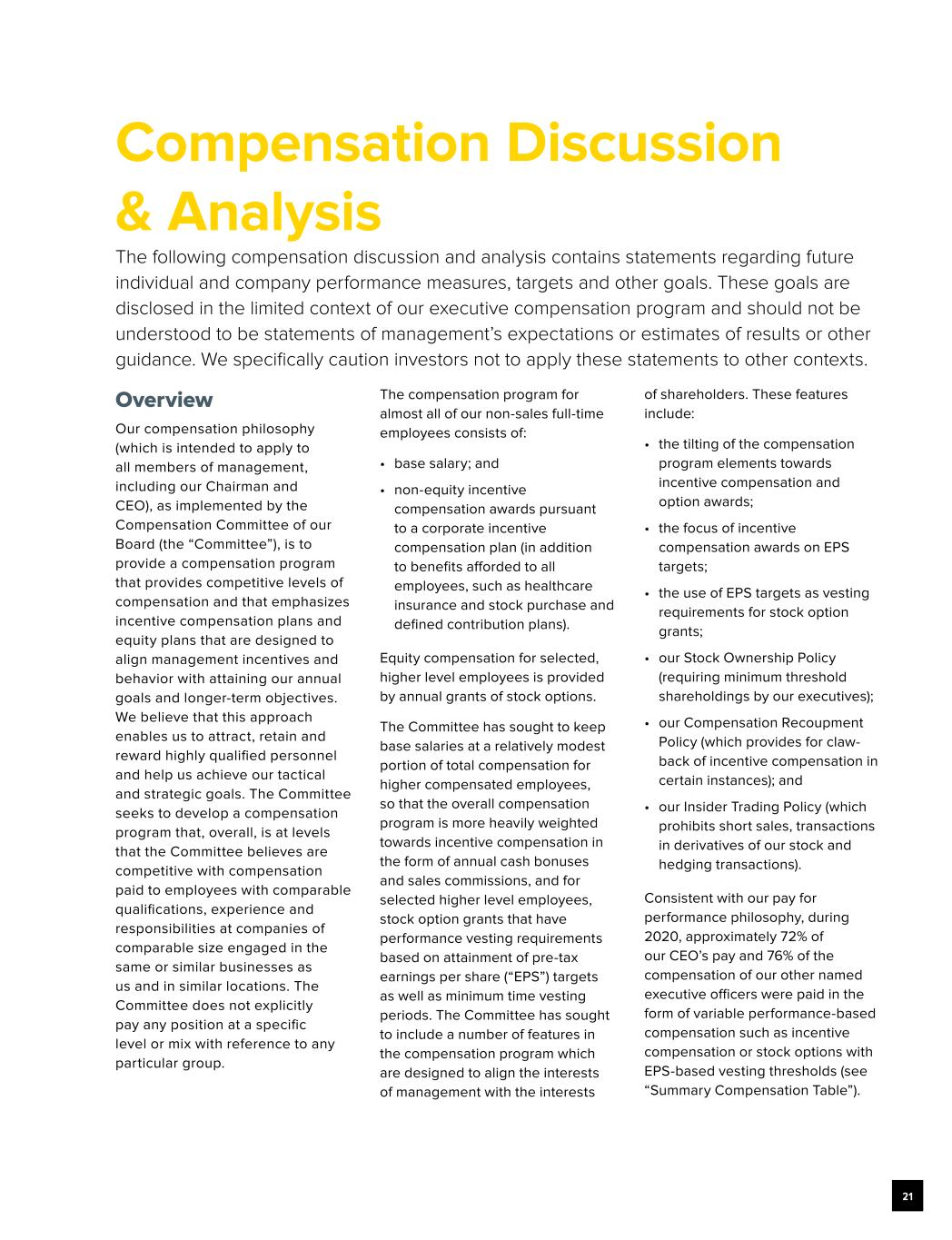
Compensation Discussion & Analysis The following compensation discussion and analysis contains statements regarding future individual and company performance measures, targets and other goals. These goals are disclosed in the limited context of our executive compensation program and should not be understood to be statements of management’s expectations or estimates of results or other guidance. We specifically caution investors not to apply these statements to other contexts. Overview Our compensation philosophy (which is intended to apply to all members of management, including our Chairman and CEO), as implemented by the Compensation Committee of our Board (the “Committee”), is to provide a compensation program that provides competitive levels of compensation and that emphasizes incentive compensation plans and equity plans that are designed to align management incentives and behavior with attaining our annual goals and longer-term objectives. We believe that this approach enables us to attract, retain and reward highly qualified personnel and help us achieve our tactical and strategic goals. The Committee seeks to develop a compensation program that, overall, is at levels that the Committee believes are competitive with compensation paid to employees with comparable qualifications, experience and responsibilities at companies of comparable size engaged in the same or similar businesses as us and in similar locations. The Committee does not explicitly pay any position at a specific level or mix with reference to any particular group. The compensation program for almost all of our non-sales full-time employees consists of: • base salary; and • non-equity incentive compensation awards pursuant to a corporate incentive compensation plan (in addition to benefits afforded to all employees, such as healthcare insurance and stock purchase and defined contribution plans). Equity compensation for selected, higher level employees is provided by annual grants of stock options. The Committee has sought to keep base salaries at a relatively modest portion of total compensation for higher compensated employees, so that the overall compensation program is more heavily weighted towards incentive compensation in the form of annual cash bonuses and sales commissions, and for selected higher level employees, stock option grants that have performance vesting requirements based on attainment of pre-tax earnings per share (“EPS”) targets as well as minimum time vesting periods. The Committee has sought to include a number of features in the compensation program which are designed to align the interests of management with the interests of shareholders. These features include: • the tilting of the compensation program elements towards incentive compensation and option awards; • the focus of incentive compensation awards on EPS targets; • the use of EPS targets as vesting requirements for stock option grants; • our Stock Ownership Policy (requiring minimum threshold shareholdings by our executives); • our Compensation Recoupment Policy (which provides for claw- back of incentive compensation in certain instances); and • our Insider Trading Policy (which prohibits short sales, transactions in derivatives of our stock and hedging transactions). Consistent with our pay for performance philosophy, during 2020, approximately 72% of our CEO’s pay and 76% of the compensation of our other named executive officers were paid in the form of variable performance-based compensation such as incentive compensation or stock options with EPS-based vesting thresholds (see “Summary Compensation Table”). 21
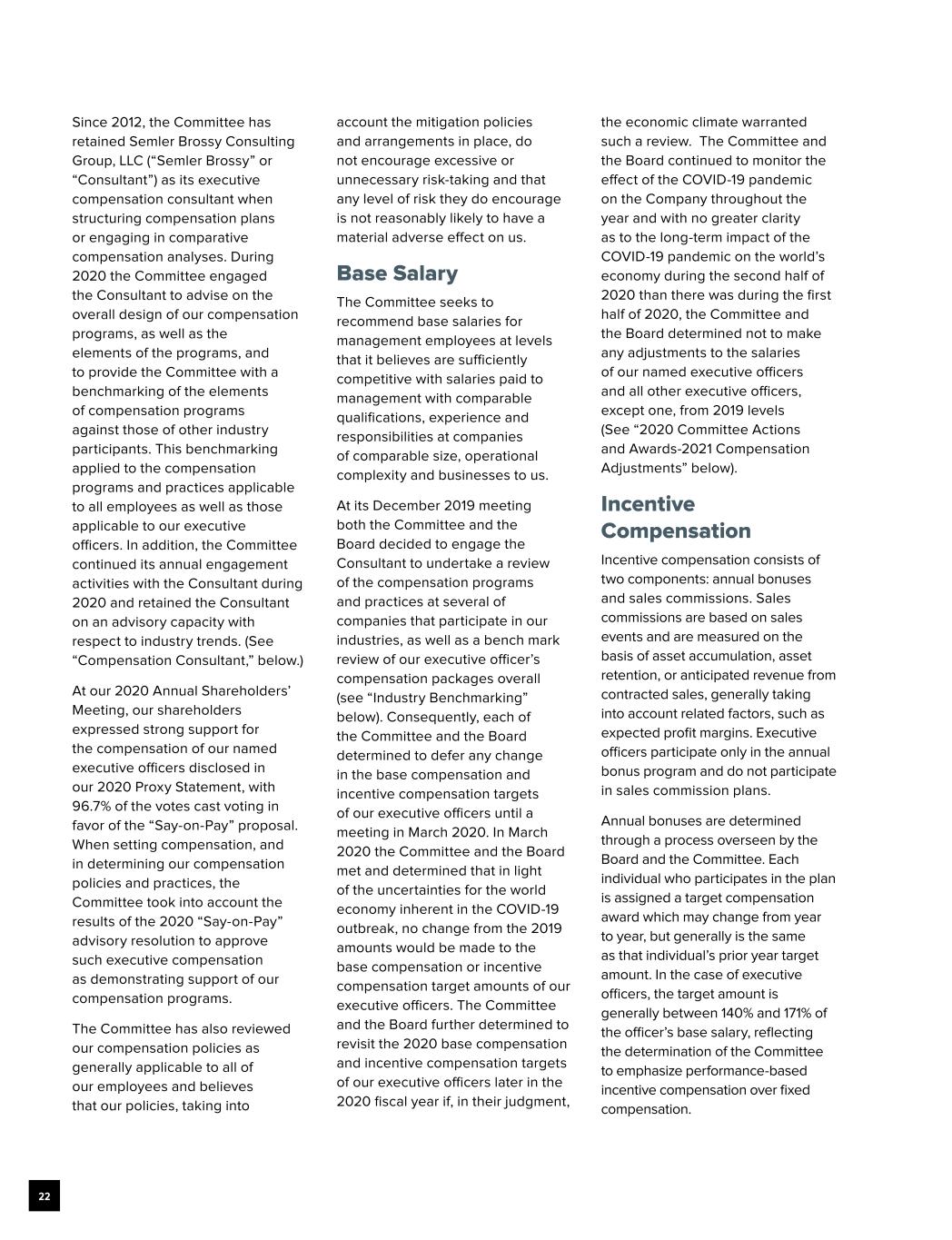
Since 2012, the Committee has retained Semler Brossy Consulting Group, LLC (“Semler Brossy” or “Consultant”) as its executive compensation consultant when structuring compensation plans or engaging in comparative compensation analyses. During 2020 the Committee engaged the Consultant to advise on the overall design of our compensation programs, as well as the elements of the programs, and to provide the Committee with a benchmarking of the elements of compensation programs against those of other industry participants. This benchmarking applied to the compensation programs and practices applicable to all employees as well as those applicable to our executive officers. In addition, the Committee continued its annual engagement activities with the Consultant during 2020 and retained the Consultant on an advisory capacity with respect to industry trends. (See “Compensation Consultant,” below.) At our 2020 Annual Shareholders’ Meeting, our shareholders expressed strong support for the compensation of our named executive officers disclosed in our 2020 Proxy Statement, with 96.7% of the votes cast voting in favor of the “Say-on-Pay” proposal. When setting compensation, and in determining our compensation policies and practices, the Committee took into account the results of the 2020 “Say-on-Pay” advisory resolution to approve such executive compensation as demonstrating support of our compensation programs. The Committee has also reviewed our compensation policies as generally applicable to all of our employees and believes that our policies, taking into account the mitigation policies and arrangements in place, do not encourage excessive or unnecessary risk-taking and that any level of risk they do encourage is not reasonably likely to have a material adverse effect on us. Base Salary The Committee seeks to recommend base salaries for management employees at levels that it believes are sufficiently competitive with salaries paid to management with comparable qualifications, experience and responsibilities at companies of comparable size, operational complexity and businesses to us. At its December 2019 meeting both the Committee and the Board decided to engage the Consultant to undertake a review of the compensation programs and practices at several of companies that participate in our industries, as well as a bench mark review of our executive officer’s compensation packages overall (see “Industry Benchmarking” below). Consequently, each of the Committee and the Board determined to defer any change in the base compensation and incentive compensation targets of our executive officers until a meeting in March 2020. In March 2020 the Committee and the Board met and determined that in light of the uncertainties for the world economy inherent in the COVID-19 outbreak, no change from the 2019 amounts would be made to the base compensation or incentive compensation target amounts of our executive officers. The Committee and the Board further determined to revisit the 2020 base compensation and incentive compensation targets of our executive officers later in the 2020 fiscal year if, in their judgment, the economic climate warranted such a review. The Committee and the Board continued to monitor the effect of the COVID-19 pandemic on the Company throughout the year and with no greater clarity as to the long-term impact of the COVID-19 pandemic on the world’s economy during the second half of 2020 than there was during the first half of 2020, the Committee and the Board determined not to make any adjustments to the salaries of our named executive officers and all other executive officers, except one, from 2019 levels (See “2020 Committee Actions and Awards-2021 Compensation Adjustments” below). Incentive Compensation Incentive compensation consists of two components: annual bonuses and sales commissions. Sales commissions are based on sales events and are measured on the basis of asset accumulation, asset retention, or anticipated revenue from contracted sales, generally taking into account related factors, such as expected profit margins. Executive officers participate only in the annual bonus program and do not participate in sales commission plans. Annual bonuses are determined through a process overseen by the Board and the Committee. Each individual who participates in the plan is assigned a target compensation award which may change from year to year, but generally is the same as that individual’s prior year target amount. In the case of executive officers, the target amount is generally between 140% and 171% of the officer’s base salary, reflecting the determination of the Committee to emphasize performance-based incentive compensation over fixed compensation. 22
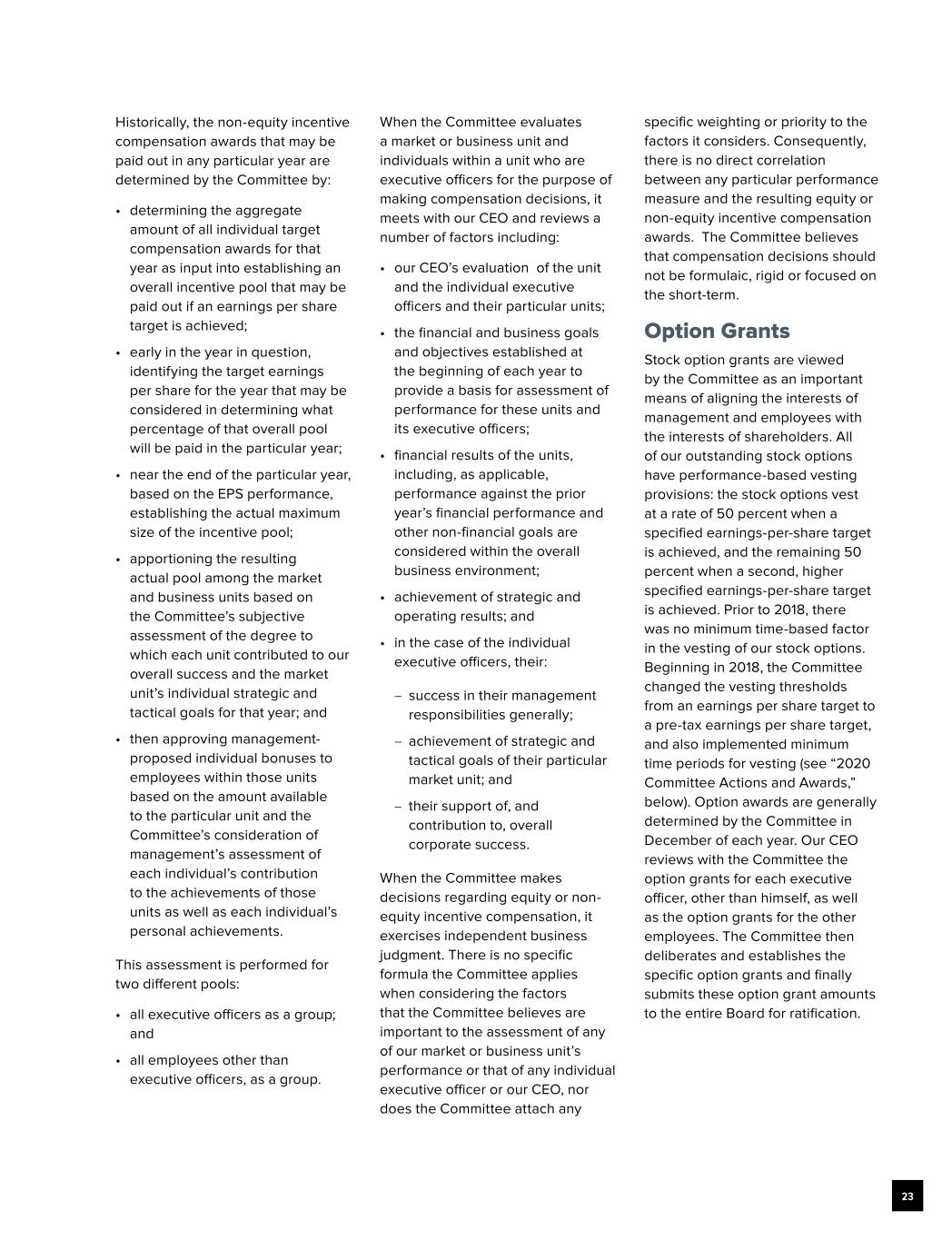
Historically, the non-equity incentive compensation awards that may be paid out in any particular year are determined by the Committee by: • determining the aggregate amount of all individual target compensation awards for that year as input into establishing an overall incentive pool that may be paid out if an earnings per share target is achieved; • early in the year in question, identifying the target earnings per share for the year that may be considered in determining what percentage of that overall pool will be paid in the particular year; • near the end of the particular year, based on the EPS performance, establishing the actual maximum size of the incentive pool; • apportioning the resulting actual pool among the market and business units based on the Committee’s subjective assessment of the degree to which each unit contributed to our overall success and the market unit’s individual strategic and tactical goals for that year; and • then approving management- proposed individual bonuses to employees within those units based on the amount available to the particular unit and the Committee’s consideration of management’s assessment of each individual’s contribution to the achievements of those units as well as each individual’s personal achievements. This assessment is performed for two different pools: • all executive officers as a group; and • all employees other than executive officers, as a group. When the Committee evaluates a market or business unit and individuals within a unit who are executive officers for the purpose of making compensation decisions, it meets with our CEO and reviews a number of factors including: • our CEO’s evaluation of the unit and the individual executive officers and their particular units; • the financial and business goals and objectives established at the beginning of each year to provide a basis for assessment of performance for these units and its executive officers; • financial results of the units, including, as applicable, performance against the prior year’s financial performance and other non-financial goals are considered within the overall business environment; • achievement of strategic and operating results; and • in the case of the individual executive officers, their: – success in their management responsibilities generally; – achievement of strategic and tactical goals of their particular market unit; and – their support of, and contribution to, overall corporate success. When the Committee makes decisions regarding equity or non- equity incentive compensation, it exercises independent business judgment. There is no specific formula the Committee applies when considering the factors that the Committee believes are important to the assessment of any of our market or business unit’s performance or that of any individual executive officer or our CEO, nor does the Committee attach any specific weighting or priority to the factors it considers. Consequently, there is no direct correlation between any particular performance measure and the resulting equity or non-equity incentive compensation awards. The Committee believes that compensation decisions should not be formulaic, rigid or focused on the short-term. Option Grants Stock option grants are viewed by the Committee as an important means of aligning the interests of management and employees with the interests of shareholders. All of our outstanding stock options have performance-based vesting provisions: the stock options vest at a rate of 50 percent when a specified earnings-per-share target is achieved, and the remaining 50 percent when a second, higher specified earnings-per-share target is achieved. Prior to 2018, there was no minimum time-based factor in the vesting of our stock options. Beginning in 2018, the Committee changed the vesting thresholds from an earnings per share target to a pre-tax earnings per share target, and also implemented minimum time periods for vesting (see “2020 Committee Actions and Awards,” below). Option awards are generally determined by the Committee in December of each year. Our CEO reviews with the Committee the option grants for each executive officer, other than himself, as well as the option grants for the other employees. The Committee then deliberates and establishes the specific option grants and finally submits these option grant amounts to the entire Board for ratification. 23
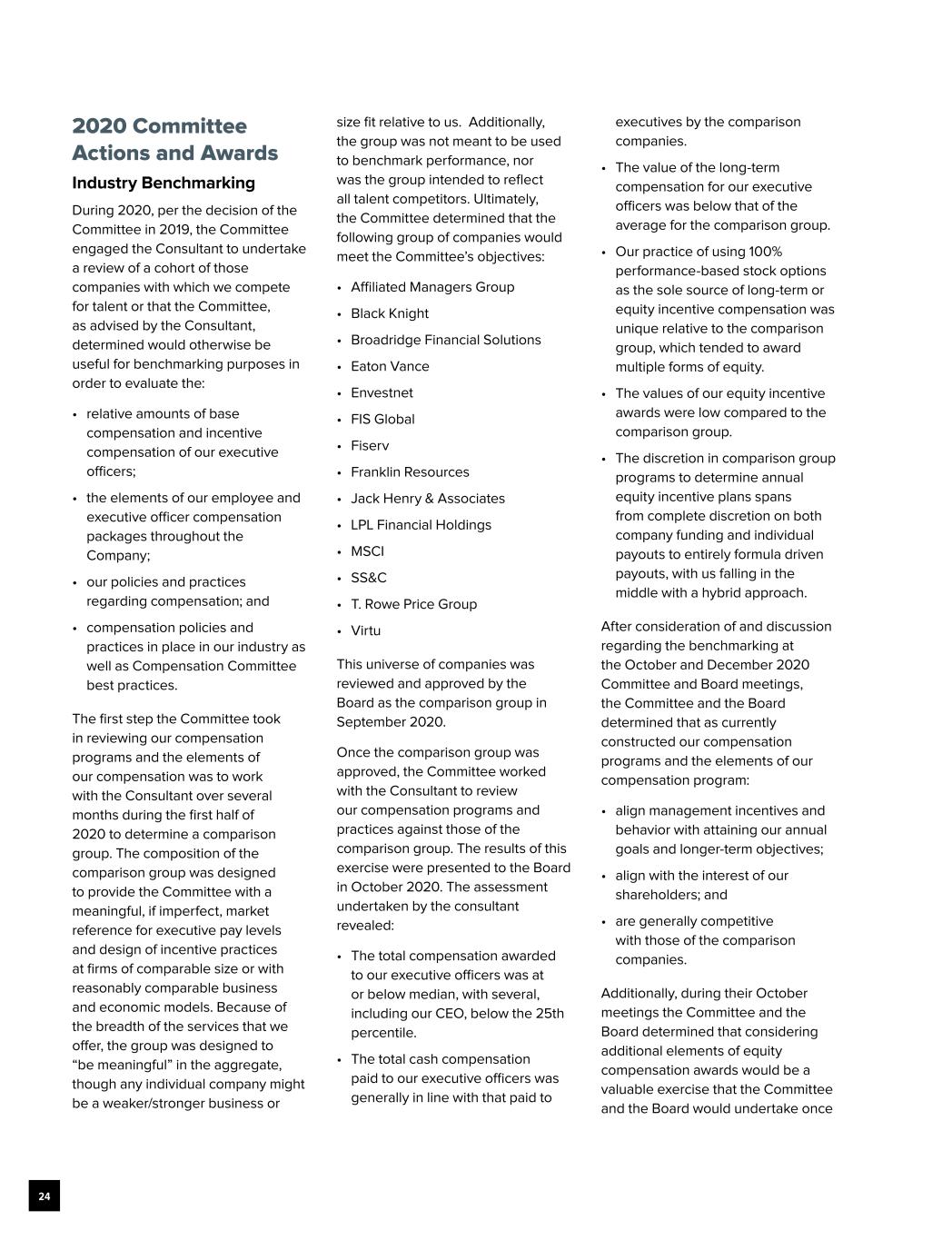
2020 Committee Actions and Awards Industry Benchmarking During 2020, per the decision of the Committee in 2019, the Committee engaged the Consultant to undertake a review of a cohort of those companies with which we compete for talent or that the Committee, as advised by the Consultant, determined would otherwise be useful for benchmarking purposes in order to evaluate the: • relative amounts of base compensation and incentive compensation of our executive officers; • the elements of our employee and executive officer compensation packages throughout the Company; • our policies and practices regarding compensation; and • compensation policies and practices in place in our industry as well as Compensation Committee best practices. The first step the Committee took in reviewing our compensation programs and the elements of our compensation was to work with the Consultant over several months during the first half of 2020 to determine a comparison group. The composition of the comparison group was designed to provide the Committee with a meaningful, if imperfect, market reference for executive pay levels and design of incentive practices at firms of comparable size or with reasonably comparable business and economic models. Because of the breadth of the services that we offer, the group was designed to “be meaningful” in the aggregate, though any individual company might be a weaker/stronger business or size fit relative to us. Additionally, the group was not meant to be used to benchmark performance, nor was the group intended to reflect all talent competitors. Ultimately, the Committee determined that the following group of companies would meet the Committee’s objectives: • Affiliated Managers Group • Black Knight • Broadridge Financial Solutions • Eaton Vance • Envestnet • FIS Global • Fiserv • Franklin Resources • Jack Henry & Associates • LPL Financial Holdings • MSCI • SS&C • T. Rowe Price Group • Virtu This universe of companies was reviewed and approved by the Board as the comparison group in September 2020. Once the comparison group was approved, the Committee worked with the Consultant to review our compensation programs and practices against those of the comparison group. The results of this exercise were presented to the Board in October 2020. The assessment undertaken by the consultant revealed: • The total compensation awarded to our executive officers was at or below median, with several, including our CEO, below the 25th percentile. • The total cash compensation paid to our executive officers was generally in line with that paid to executives by the comparison companies. • The value of the long-term compensation for our executive officers was below that of the average for the comparison group. • Our practice of using 100% performance-based stock options as the sole source of long-term or equity incentive compensation was unique relative to the comparison group, which tended to award multiple forms of equity. • The values of our equity incentive awards were low compared to the comparison group. • The discretion in comparison group programs to determine annual equity incentive plans spans from complete discretion on both company funding and individual payouts to entirely formula driven payouts, with us falling in the middle with a hybrid approach. After consideration of and discussion regarding the benchmarking at the October and December 2020 Committee and Board meetings, the Committee and the Board determined that as currently constructed our compensation programs and the elements of our compensation program: • align management incentives and behavior with attaining our annual goals and longer-term objectives; • align with the interest of our shareholders; and • are generally competitive with those of the comparison companies. Additionally, during their October meetings the Committee and the Board determined that considering additional elements of equity compensation awards would be a valuable exercise that the Committee and the Board would undertake once 24
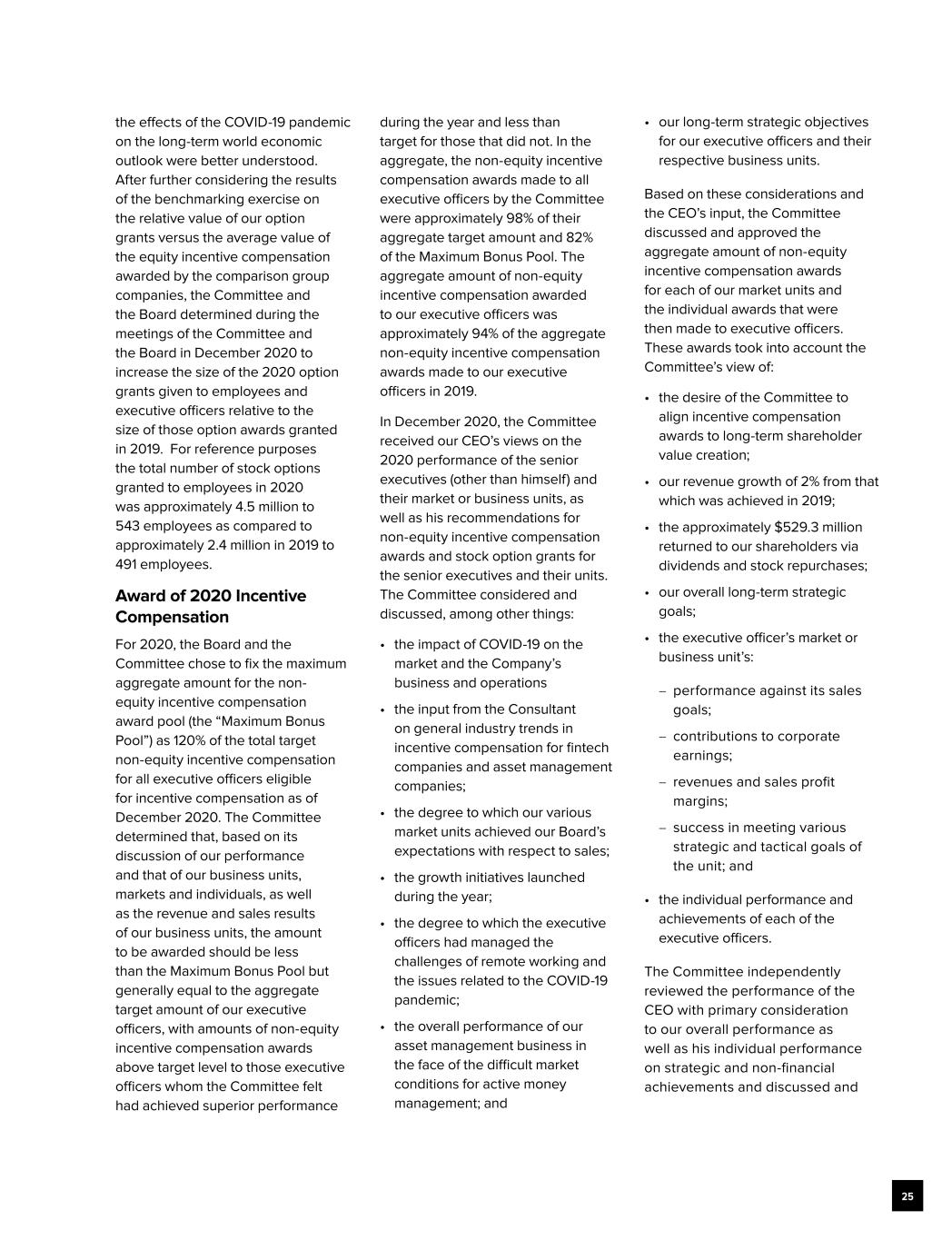
the effects of the COVID-19 pandemic on the long-term world economic outlook were better understood. After further considering the results of the benchmarking exercise on the relative value of our option grants versus the average value of the equity incentive compensation awarded by the comparison group companies, the Committee and the Board determined during the meetings of the Committee and the Board in December 2020 to increase the size of the 2020 option grants given to employees and executive officers relative to the size of those option awards granted in 2019. For reference purposes the total number of stock options granted to employees in 2020 was approximately 4.5 million to 543 employees as compared to approximately 2.4 million in 2019 to 491 employees. Award of 2020 Incentive Compensation For 2020, the Board and the Committee chose to fix the maximum aggregate amount for the non- equity incentive compensation award pool (the “Maximum Bonus Pool”) as 120% of the total target non-equity incentive compensation for all executive officers eligible for incentive compensation as of December 2020. The Committee determined that, based on its discussion of our performance and that of our business units, markets and individuals, as well as the revenue and sales results of our business units, the amount to be awarded should be less than the Maximum Bonus Pool but generally equal to the aggregate target amount of our executive officers, with amounts of non-equity incentive compensation awards above target level to those executive officers whom the Committee felt had achieved superior performance during the year and less than target for those that did not. In the aggregate, the non-equity incentive compensation awards made to all executive officers by the Committee were approximately 98% of their aggregate target amount and 82% of the Maximum Bonus Pool. The aggregate amount of non-equity incentive compensation awarded to our executive officers was approximately 94% of the aggregate non-equity incentive compensation awards made to our executive officers in 2019. In December 2020, the Committee received our CEO’s views on the 2020 performance of the senior executives (other than himself) and their market or business units, as well as his recommendations for non-equity incentive compensation awards and stock option grants for the senior executives and their units. The Committee considered and discussed, among other things: • the impact of COVID-19 on the market and the Company’s business and operations • the input from the Consultant on general industry trends in incentive compensation for fintech companies and asset management companies; • the degree to which our various market units achieved our Board’s expectations with respect to sales; • the growth initiatives launched during the year; • the degree to which the executive officers had managed the challenges of remote working and the issues related to the COVID-19 pandemic; • the overall performance of our asset management business in the face of the difficult market conditions for active money management; and • our long-term strategic objectives for our executive officers and their respective business units. Based on these considerations and the CEO’s input, the Committee discussed and approved the aggregate amount of non-equity incentive compensation awards for each of our market units and the individual awards that were then made to executive officers. These awards took into account the Committee’s view of: • the desire of the Committee to align incentive compensation awards to long-term shareholder value creation; • our revenue growth of 2% from that which was achieved in 2019; • the approximately $529.3 million returned to our shareholders via dividends and stock repurchases; • our overall long-term strategic goals; • the executive officer’s market or business unit’s: – performance against its sales goals; – contributions to corporate earnings; – revenues and sales profit margins; – success in meeting various strategic and tactical goals of the unit; and • the individual performance and achievements of each of the executive officers. The Committee independently reviewed the performance of the CEO with primary consideration to our overall performance as well as his individual performance on strategic and non-financial achievements and discussed and 25
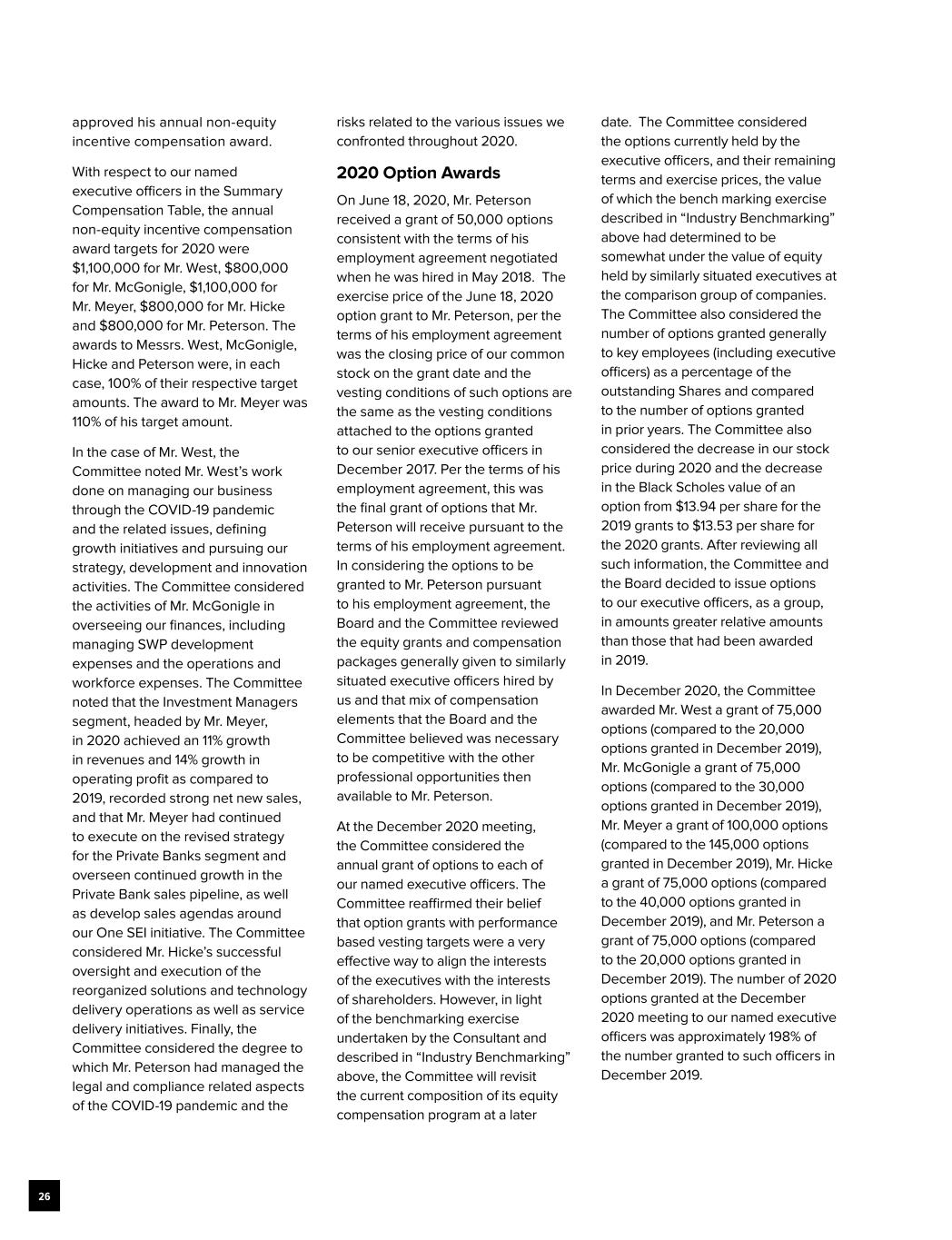
approved his annual non-equity incentive compensation award. With respect to our named executive officers in the Summary Compensation Table, the annual non-equity incentive compensation award targets for 2020 were $1,100,000 for Mr. West, $800,000 for Mr. McGonigle, $1,100,000 for Mr. Meyer, $800,000 for Mr. Hicke and $800,000 for Mr. Peterson. The awards to Messrs. West, McGonigle, Hicke and Peterson were, in each case, 100% of their respective target amounts. The award to Mr. Meyer was 110% of his target amount. In the case of Mr. West, the Committee noted Mr. West’s work done on managing our business through the COVID-19 pandemic and the related issues, defining growth initiatives and pursuing our strategy, development and innovation activities. The Committee considered the activities of Mr. McGonigle in overseeing our finances, including managing SWP development expenses and the operations and workforce expenses. The Committee noted that the Investment Managers segment, headed by Mr. Meyer, in 2020 achieved an 11% growth in revenues and 14% growth in operating profit as compared to 2019, recorded strong net new sales, and that Mr. Meyer had continued to execute on the revised strategy for the Private Banks segment and overseen continued growth in the Private Bank sales pipeline, as well as develop sales agendas around our One SEI initiative. The Committee considered Mr. Hicke’s successful oversight and execution of the reorganized solutions and technology delivery operations as well as service delivery initiatives. Finally, the Committee considered the degree to which Mr. Peterson had managed the legal and compliance related aspects of the COVID-19 pandemic and the risks related to the various issues we confronted throughout 2020. 2020 Option Awards On June 18, 2020, Mr. Peterson received a grant of 50,000 options consistent with the terms of his employment agreement negotiated when he was hired in May 2018. The exercise price of the June 18, 2020 option grant to Mr. Peterson, per the terms of his employment agreement was the closing price of our common stock on the grant date and the vesting conditions of such options are the same as the vesting conditions attached to the options granted to our senior executive officers in December 2017. Per the terms of his employment agreement, this was the final grant of options that Mr. Peterson will receive pursuant to the terms of his employment agreement. In considering the options to be granted to Mr. Peterson pursuant to his employment agreement, the Board and the Committee reviewed the equity grants and compensation packages generally given to similarly situated executive officers hired by us and that mix of compensation elements that the Board and the Committee believed was necessary to be competitive with the other professional opportunities then available to Mr. Peterson. At the December 2020 meeting, the Committee considered the annual grant of options to each of our named executive officers. The Committee reaffirmed their belief that option grants with performance based vesting targets were a very effective way to align the interests of the executives with the interests of shareholders. However, in light of the benchmarking exercise undertaken by the Consultant and described in “Industry Benchmarking” above, the Committee will revisit the current composition of its equity compensation program at a later date. The Committee considered the options currently held by the executive officers, and their remaining terms and exercise prices, the value of which the bench marking exercise described in “Industry Benchmarking” above had determined to be somewhat under the value of equity held by similarly situated executives at the comparison group of companies. The Committee also considered the number of options granted generally to key employees (including executive officers) as a percentage of the outstanding Shares and compared to the number of options granted in prior years. The Committee also considered the decrease in our stock price during 2020 and the decrease in the Black Scholes value of an option from $13.94 per share for the 2019 grants to $13.53 per share for the 2020 grants. After reviewing all such information, the Committee and the Board decided to issue options to our executive officers, as a group, in amounts greater relative amounts than those that had been awarded in 2019. In December 2020, the Committee awarded Mr. West a grant of 75,000 options (compared to the 20,000 options granted in December 2019), Mr. McGonigle a grant of 75,000 options (compared to the 30,000 options granted in December 2019), Mr. Meyer a grant of 100,000 options (compared to the 145,000 options granted in December 2019), Mr. Hicke a grant of 75,000 options (compared to the 40,000 options granted in December 2019), and Mr. Peterson a grant of 75,000 options (compared to the 20,000 options granted in December 2019). The number of 2020 options granted at the December 2020 meeting to our named executive officers was approximately 198% of the number granted to such officers in December 2019. 26
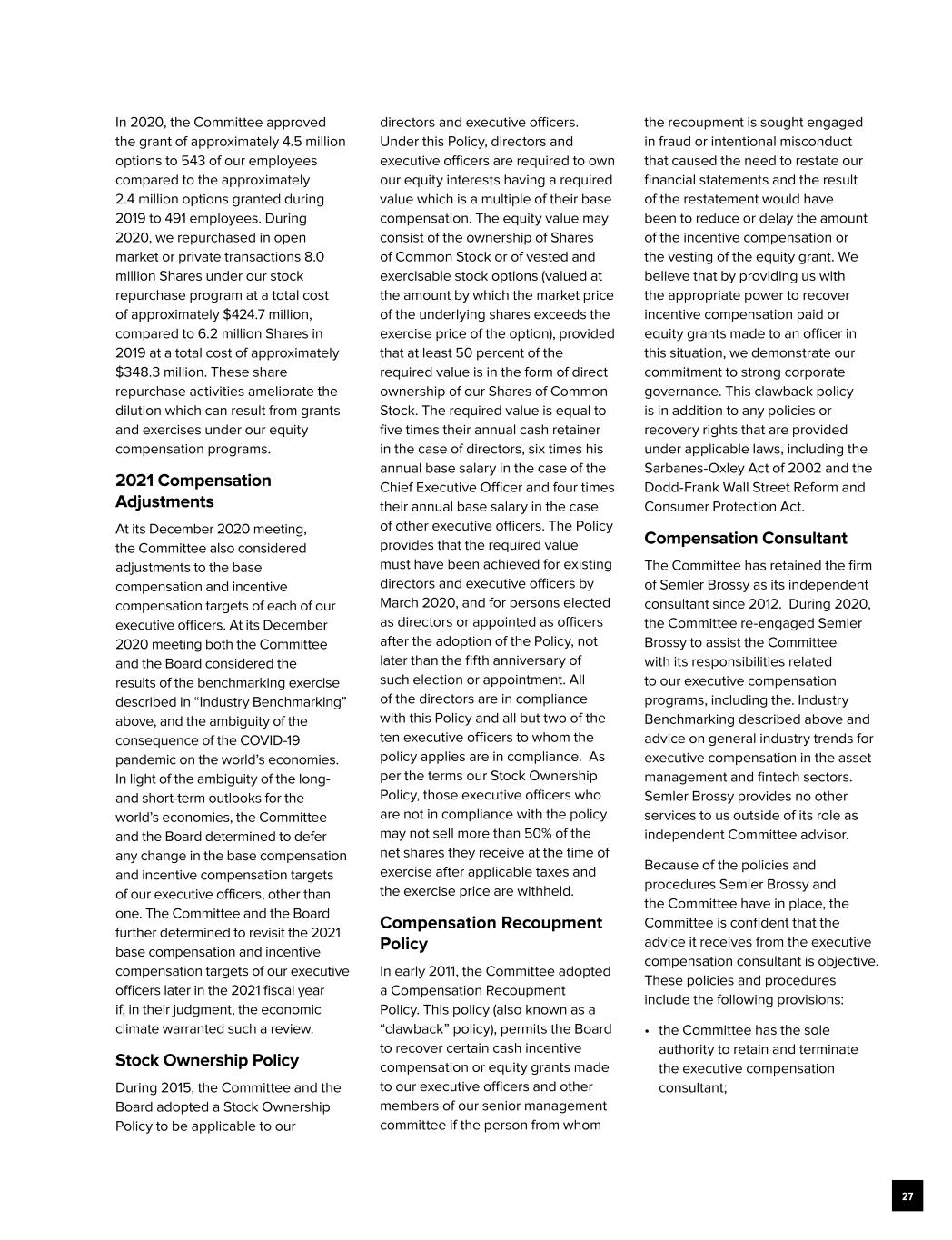
In 2020, the Committee approved the grant of approximately 4.5 million options to 543 of our employees compared to the approximately 2.4 million options granted during 2019 to 491 employees. During 2020, we repurchased in open market or private transactions 8.0 million Shares under our stock repurchase program at a total cost of approximately $424.7 million, compared to 6.2 million Shares in 2019 at a total cost of approximately $348.3 million. These share repurchase activities ameliorate the dilution which can result from grants and exercises under our equity compensation programs. 2021 Compensation Adjustments At its December 2020 meeting, the Committee also considered adjustments to the base compensation and incentive compensation targets of each of our executive officers. At its December 2020 meeting both the Committee and the Board considered the results of the benchmarking exercise described in “Industry Benchmarking” above, and the ambiguity of the consequence of the COVID-19 pandemic on the world’s economies. In light of the ambiguity of the long- and short-term outlooks for the world’s economies, the Committee and the Board determined to defer any change in the base compensation and incentive compensation targets of our executive officers, other than one. The Committee and the Board further determined to revisit the 2021 base compensation and incentive compensation targets of our executive officers later in the 2021 fiscal year if, in their judgment, the economic climate warranted such a review. Stock Ownership Policy During 2015, the Committee and the Board adopted a Stock Ownership Policy to be applicable to our directors and executive officers. Under this Policy, directors and executive officers are required to own our equity interests having a required value which is a multiple of their base compensation. The equity value may consist of the ownership of Shares of Common Stock or of vested and exercisable stock options (valued at the amount by which the market price of the underlying shares exceeds the exercise price of the option), provided that at least 50 percent of the required value is in the form of direct ownership of our Shares of Common Stock. The required value is equal to five times their annual cash retainer in the case of directors, six times his annual base salary in the case of the Chief Executive Officer and four times their annual base salary in the case of other executive officers. The Policy provides that the required value must have been achieved for existing directors and executive officers by March 2020, and for persons elected as directors or appointed as officers after the adoption of the Policy, not later than the fifth anniversary of such election or appointment. All of the directors are in compliance with this Policy and all but two of the ten executive officers to whom the policy applies are in compliance. As per the terms our Stock Ownership Policy, those executive officers who are not in compliance with the policy may not sell more than 50% of the net shares they receive at the time of exercise after applicable taxes and the exercise price are withheld. Compensation Recoupment Policy In early 2011, the Committee adopted a Compensation Recoupment Policy. This policy (also known as a “clawback” policy), permits the Board to recover certain cash incentive compensation or equity grants made to our executive officers and other members of our senior management committee if the person from whom the recoupment is sought engaged in fraud or intentional misconduct that caused the need to restate our financial statements and the result of the restatement would have been to reduce or delay the amount of the incentive compensation or the vesting of the equity grant. We believe that by providing us with the appropriate power to recover incentive compensation paid or equity grants made to an officer in this situation, we demonstrate our commitment to strong corporate governance. This clawback policy is in addition to any policies or recovery rights that are provided under applicable laws, including the Sarbanes-Oxley Act of 2002 and the Dodd-Frank Wall Street Reform and Consumer Protection Act. Compensation Consultant The Committee has retained the firm of Semler Brossy as its independent consultant since 2012. During 2020, the Committee re-engaged Semler Brossy to assist the Committee with its responsibilities related to our executive compensation programs, including the. Industry Benchmarking described above and advice on general industry trends for executive compensation in the asset management and fintech sectors. Semler Brossy provides no other services to us outside of its role as independent Committee advisor. Because of the policies and procedures Semler Brossy and the Committee have in place, the Committee is confident that the advice it receives from the executive compensation consultant is objective. These policies and procedures include the following provisions: • the Committee has the sole authority to retain and terminate the executive compensation consultant; 27
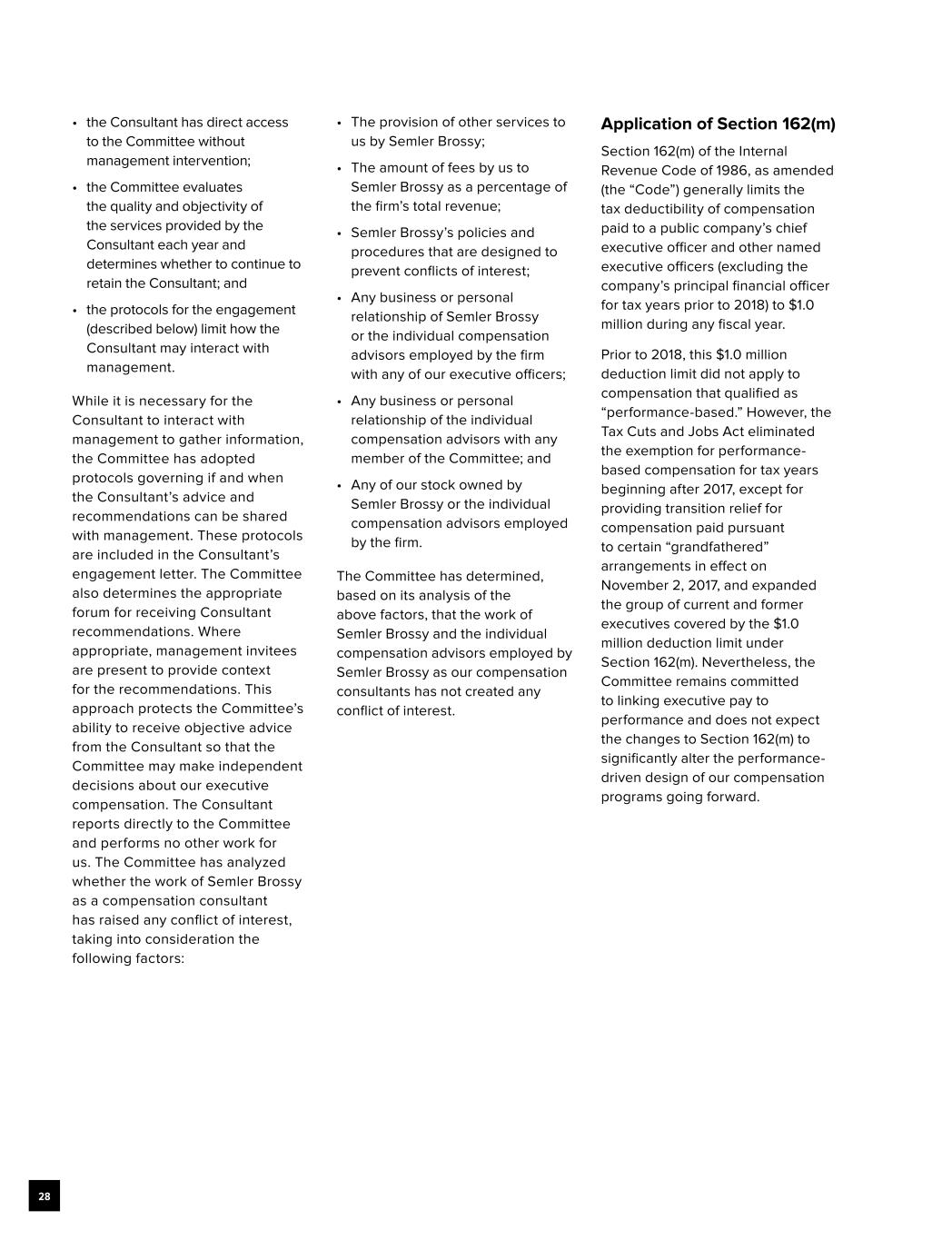
• the Consultant has direct access to the Committee without management intervention; • the Committee evaluates the quality and objectivity of the services provided by the Consultant each year and determines whether to continue to retain the Consultant; and • the protocols for the engagement (described below) limit how the Consultant may interact with management. While it is necessary for the Consultant to interact with management to gather information, the Committee has adopted protocols governing if and when the Consultant’s advice and recommendations can be shared with management. These protocols are included in the Consultant’s engagement letter. The Committee also determines the appropriate forum for receiving Consultant recommendations. Where appropriate, management invitees are present to provide context for the recommendations. This approach protects the Committee’s ability to receive objective advice from the Consultant so that the Committee may make independent decisions about our executive compensation. The Consultant reports directly to the Committee and performs no other work for us. The Committee has analyzed whether the work of Semler Brossy as a compensation consultant has raised any conflict of interest, taking into consideration the following factors: • The provision of other services to us by Semler Brossy; • The amount of fees by us to Semler Brossy as a percentage of the firm’s total revenue; • Semler Brossy’s policies and procedures that are designed to prevent conflicts of interest; • Any business or personal relationship of Semler Brossy or the individual compensation advisors employed by the firm with any of our executive officers; • Any business or personal relationship of the individual compensation advisors with any member of the Committee; and • Any of our stock owned by Semler Brossy or the individual compensation advisors employed by the firm. The Committee has determined, based on its analysis of the above factors, that the work of Semler Brossy and the individual compensation advisors employed by Semler Brossy as our compensation consultants has not created any conflict of interest. Application of Section 162(m) Section 162(m) of the Internal Revenue Code of 1986, as amended (the “Code”) generally limits the tax deductibility of compensation paid to a public company’s chief executive officer and other named executive officers (excluding the company’s principal financial officer for tax years prior to 2018) to $1.0 million during any fiscal year. Prior to 2018, this $1.0 million deduction limit did not apply to compensation that qualified as “performance-based.” However, the Tax Cuts and Jobs Act eliminated the exemption for performance- based compensation for tax years beginning after 2017, except for providing transition relief for compensation paid pursuant to certain “grandfathered” arrangements in effect on November 2, 2017, and expanded the group of current and former executives covered by the $1.0 million deduction limit under Section 162(m). Nevertheless, the Committee remains committed to linking executive pay to performance and does not expect the changes to Section 162(m) to significantly alter the performance- driven design of our compensation programs going forward. 28
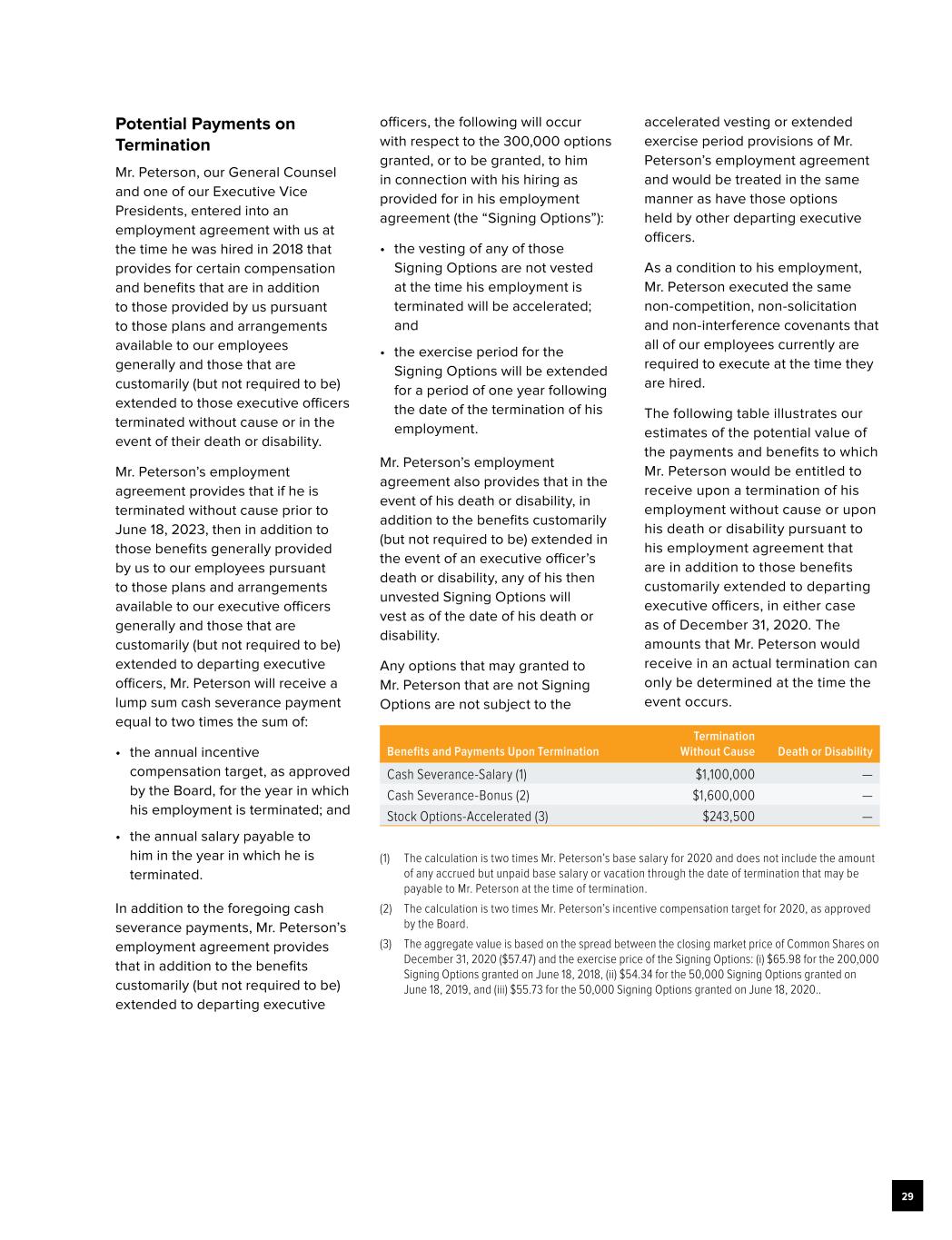
Potential Payments on Termination Mr. Peterson, our General Counsel and one of our Executive Vice Presidents, entered into an employment agreement with us at the time he was hired in 2018 that provides for certain compensation and benefits that are in addition to those provided by us pursuant to those plans and arrangements available to our employees generally and those that are customarily (but not required to be) extended to those executive officers terminated without cause or in the event of their death or disability. Mr. Peterson’s employment agreement provides that if he is terminated without cause prior to June 18, 2023, then in addition to those benefits generally provided by us to our employees pursuant to those plans and arrangements available to our executive officers generally and those that are customarily (but not required to be) extended to departing executive officers, Mr. Peterson will receive a lump sum cash severance payment equal to two times the sum of: • the annual incentive compensation target, as approved by the Board, for the year in which his employment is terminated; and • the annual salary payable to him in the year in which he is terminated. In addition to the foregoing cash severance payments, Mr. Peterson’s employment agreement provides that in addition to the benefits customarily (but not required to be) extended to departing executive officers, the following will occur with respect to the 300,000 options granted, or to be granted, to him in connection with his hiring as provided for in his employment agreement (the “Signing Options”): • the vesting of any of those Signing Options are not vested at the time his employment is terminated will be accelerated; and • the exercise period for the Signing Options will be extended for a period of one year following the date of the termination of his employment. Mr. Peterson’s employment agreement also provides that in the event of his death or disability, in addition to the benefits customarily (but not required to be) extended in the event of an executive officer’s death or disability, any of his then unvested Signing Options will vest as of the date of his death or disability. Any options that may granted to Mr. Peterson that are not Signing Options are not subject to the accelerated vesting or extended exercise period provisions of Mr. Peterson’s employment agreement and would be treated in the same manner as have those options held by other departing executive officers. As a condition to his employment, Mr. Peterson executed the same non-competition, non-solicitation and non-interference covenants that all of our employees currently are required to execute at the time they are hired. The following table illustrates our estimates of the potential value of the payments and benefits to which Mr. Peterson would be entitled to receive upon a termination of his employment without cause or upon his death or disability pursuant to his employment agreement that are in addition to those benefits customarily extended to departing executive officers, in either case as of December 31, 2020. The amounts that Mr. Peterson would receive in an actual termination can only be determined at the time the event occurs. Benefits and Payments Upon Termination Termination Without Cause Death or Disability Cash Severance-Salary (1) $1,100,000 — Cash Severance-Bonus (2) $1,600,000 — Stock Options-Accelerated (3) $243,500 — (1) The calculation is two times Mr. Peterson’s base salary for 2020 and does not include the amount of any accrued but unpaid base salary or vacation through the date of termination that may be payable to Mr. Peterson at the time of termination. (2) The calculation is two times Mr. Peterson’s incentive compensation target for 2020, as approved by the Board. (3) The aggregate value is based on the spread between the closing market price of Common Shares on December 31, 2020 ($57.47) and the exercise price of the Signing Options: (i) $65.98 for the 200,000 Signing Options granted on June 18, 2018, (ii) $54.34 for the 50,000 Signing Options granted on June 18, 2019, and (iii) $55.73 for the 50,000 Signing Options granted on June 18, 2020.. 29
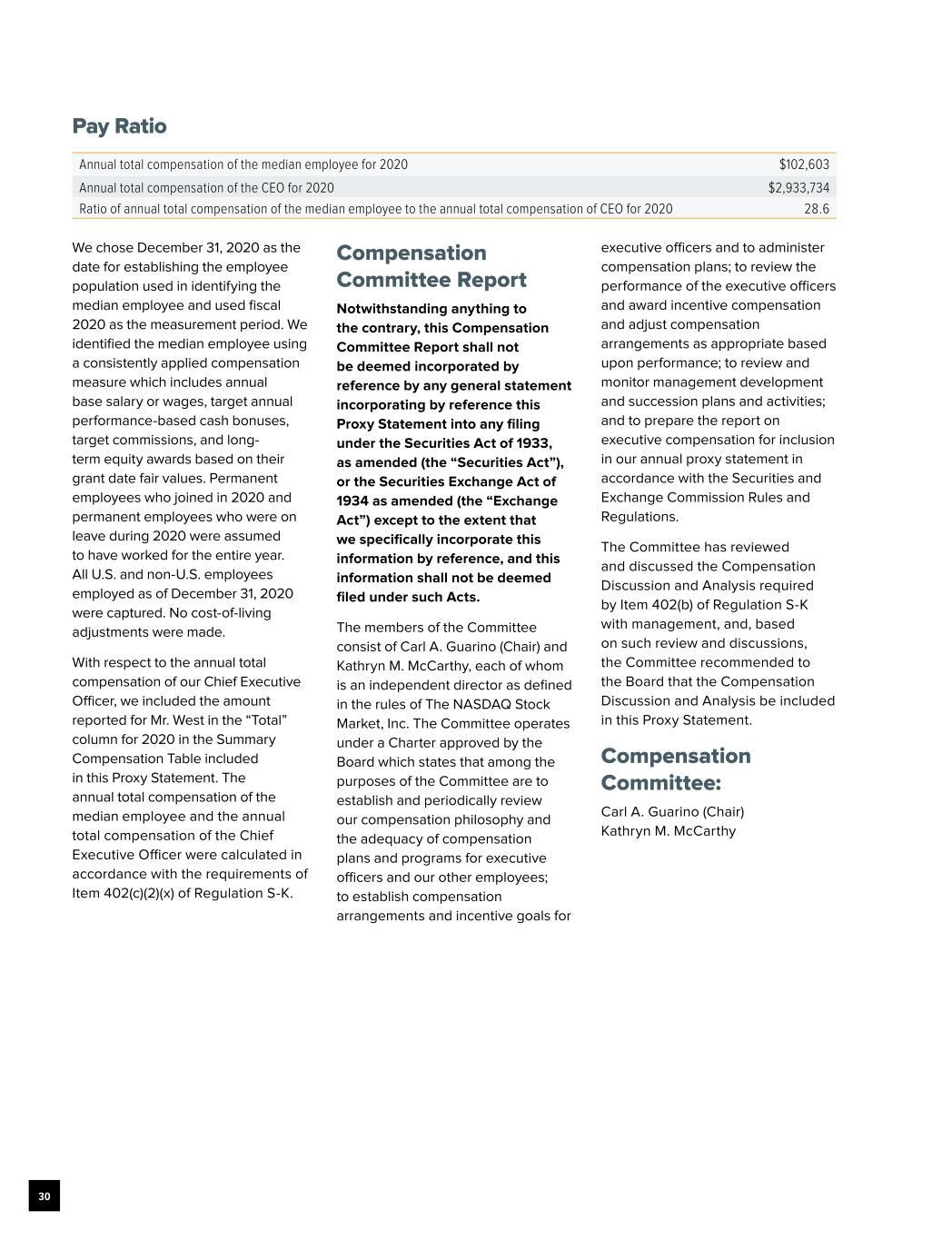
Pay Ratio Annual total compensation of the median employee for 2020 $102,603 Annual total compensation of the CEO for 2020 $2,933,734 Ratio of annual total compensation of the median employee to the annual total compensation of CEO for 2020 28.6 We chose December 31, 2020 as the date for establishing the employee population used in identifying the median employee and used fiscal 2020 as the measurement period. We identified the median employee using a consistently applied compensation measure which includes annual base salary or wages, target annual performance-based cash bonuses, target commissions, and long- term equity awards based on their grant date fair values. Permanent employees who joined in 2020 and permanent employees who were on leave during 2020 were assumed to have worked for the entire year. All U.S. and non-U.S. employees employed as of December 31, 2020 were captured. No cost-of-living adjustments were made. With respect to the annual total compensation of our Chief Executive Officer, we included the amount reported for Mr. West in the “Total” column for 2020 in the Summary Compensation Table included in this Proxy Statement. The annual total compensation of the median employee and the annual total compensation of the Chief Executive Officer were calculated in accordance with the requirements of Item 402(c)(2)(x) of Regulation S-K. Compensation Committee Report Notwithstanding anything to the contrary, this Compensation Committee Report shall not be deemed incorporated by reference by any general statement incorporating by reference this Proxy Statement into any filing under the Securities Act of 1933, as amended (the “Securities Act”), or the Securities Exchange Act of 1934 as amended (the “Exchange Act”) except to the extent that we specifically incorporate this information by reference, and this information shall not be deemed filed under such Acts. The members of the Committee consist of Carl A. Guarino (Chair) and Kathryn M. McCarthy, each of whom is an independent director as defined in the rules of The NASDAQ Stock Market, Inc. The Committee operates under a Charter approved by the Board which states that among the purposes of the Committee are to establish and periodically review our compensation philosophy and the adequacy of compensation plans and programs for executive officers and our other employees; to establish compensation arrangements and incentive goals for executive officers and to administer compensation plans; to review the performance of the executive officers and award incentive compensation and adjust compensation arrangements as appropriate based upon performance; to review and monitor management development and succession plans and activities; and to prepare the report on executive compensation for inclusion in our annual proxy statement in accordance with the Securities and Exchange Commission Rules and Regulations. The Committee has reviewed and discussed the Compensation Discussion and Analysis required by Item 402(b) of Regulation S-K with management, and, based on such review and discussions, the Committee recommended to the Board that the Compensation Discussion and Analysis be included in this Proxy Statement. Compensation Committee: Carl A. Guarino (Chair) Kathryn M. McCarthy 30
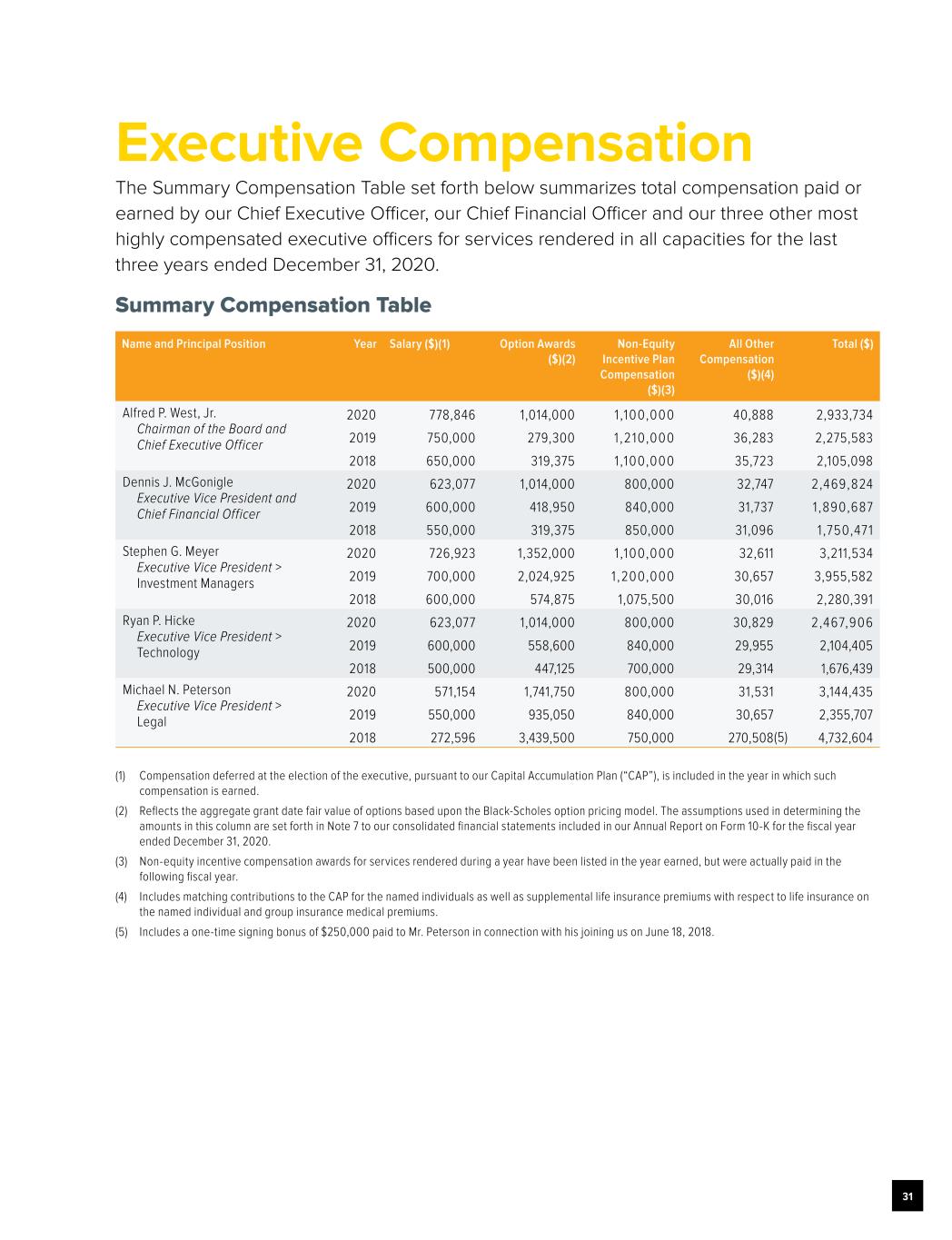
Executive Compensation The Summary Compensation Table set forth below summarizes total compensation paid or earned by our Chief Executive Officer, our Chief Financial Officer and our three other most highly compensated executive officers for services rendered in all capacities for the last three years ended December 31, 2020. Summary Compensation Table Name and Principal Position Year Salary ($)(1) Option Awards ($)(2) Non-Equity Incentive Plan Compensation ($)(3) All Other Compensation ($)(4) Total ($) Alfred P. West, Jr. Chairman of the Board and Chief Executive Officer 2020 778,846 1,014,000 1 ,100,000 40,888 2,933,734 2019 750,000 279,300 1 ,210,000 36,283 2,275,583 2018 650,000 319,375 1 ,100,000 35,723 2,105,098 Dennis J. McGonigle Executive Vice President and Chief Financial Officer 2020 623,077 1,014,000 800,000 32,747 2,469,824 2019 600,000 418,950 840,000 31,737 1,890,687 2018 550,000 319,375 850,000 31,096 1,750,471 Stephen G. Meyer Executive Vice President > Investment Managers 2020 726,923 1,352,000 1 ,100,000 32,611 3,211,534 2019 700,000 2,024,925 1 ,200,000 30,657 3,955,582 2018 600,000 574,875 1,075,500 30,016 2,280,391 Ryan P. Hicke Executive Vice President > Technology 2020 623,077 1,014,000 800,000 30,829 2,467,906 2019 600,000 558,600 840,000 29,955 2,104,405 2018 500,000 447,125 700,000 29,314 1,676,439 Michael N. Peterson Executive Vice President > Legal 2020 571,154 1,741,750 800,000 31,531 3,144,435 2019 550,000 935,050 840,000 30,657 2,355,707 2018 272,596 3,439,500 750,000 270,508 4,732,604 (1) Compensation deferred at the election of the executive, pursuant to our Capital Accumulation Plan (“CAP”), is included in the year in which such compensation is earned. (2) Reflects the aggregate grant date fair value of options based upon the Black-Scholes option pricing model. The assumptions used in determining the amounts in this column are set forth in Note 7 to our consolidated financial statements included in our Annual Report on Form 10-K for the fiscal year ended December 31, 2020. (3) Non-equity incentive compensation awards for services rendered during a year have been listed in the year earned, but were actually paid in the following fiscal year. (4) Includes matching contributions to the CAP for the named individuals as well as supplemental life insurance premiums with respect to life insurance on the named individual and group insurance medical premiums. (5) Includes a one-time signing bonus of $250,000 paid to Mr. Peterson in connection with his joining us on June 18, 2018. (5) 31
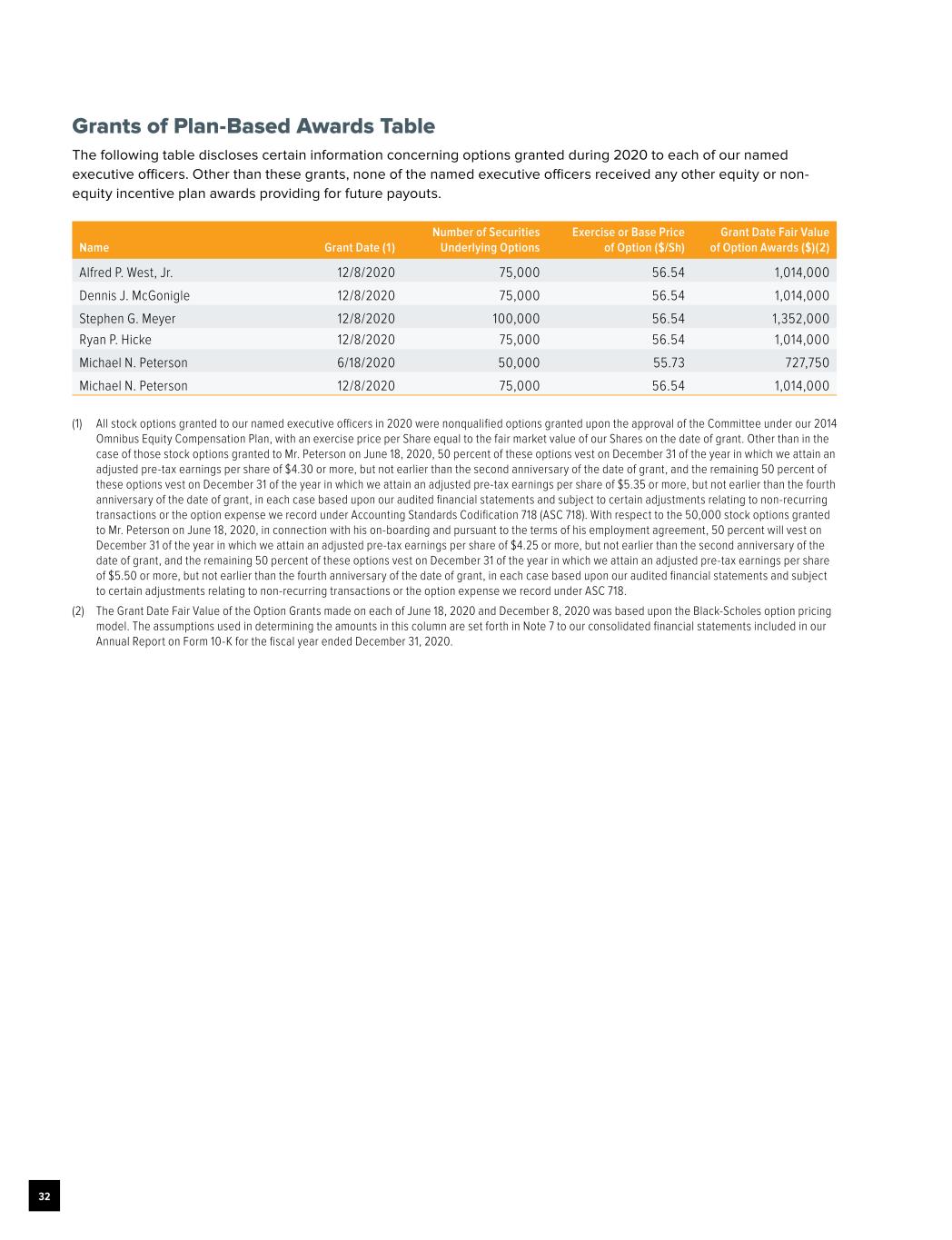
Grants of Plan-Based Awards Table The following table discloses certain information concerning options granted during 2020 to each of our named executive officers. Other than these grants, none of the named executive officers received any other equity or non- equity incentive plan awards providing for future payouts. Name Grant Date (1) Number of Securities Underlying Options Exercise or Base Price of Option ($/Sh) Grant Date Fair Value of Option Awards ($)(2) Alfred P. West, Jr. 12/8/2020 75,000 56.54 1,014,000 Dennis J. McGonigle 12/8/2020 75,000 56.54 1,014,000 Stephen G. Meyer 12/8/2020 100,000 56.54 1,352,000 Ryan P. Hicke 12/8/2020 75,000 56.54 1,014,000 Michael N. Peterson 6/18/2020 50,000 55.73 727,750 Michael N. Peterson 12/8/2020 75,000 56.54 1,014,000 (1) All stock options granted to our named executive officers in 2020 were nonqualified options granted upon the approval of the Committee under our 2014 Omnibus Equity Compensation Plan, with an exercise price per Share equal to the fair market value of our Shares on the date of grant. Other than in the case of those stock options granted to Mr. Peterson on June 18, 2020, 50 percent of these options vest on December 31 of the year in which we attain an adjusted pre-tax earnings per share of $4.30 or more, but not earlier than the second anniversary of the date of grant, and the remaining 50 percent of these options vest on December 31 of the year in which we attain an adjusted pre-tax earnings per share of $5.35 or more, but not earlier than the fourth anniversary of the date of grant, in each case based upon our audited financial statements and subject to certain adjustments relating to non-recurring transactions or the option expense we record under Accounting Standards Codification 718 (ASC 718). With respect to the 50,000 stock options granted to Mr. Peterson on June 18, 2020, in connection with his on-boarding and pursuant to the terms of his employment agreement, 50 percent will vest on December 31 of the year in which we attain an adjusted pre-tax earnings per share of $4.25 or more, but not earlier than the second anniversary of the date of grant, and the remaining 50 percent of these options vest on December 31 of the year in which we attain an adjusted pre-tax earnings per share of $5.50 or more, but not earlier than the fourth anniversary of the date of grant, in each case based upon our audited financial statements and subject to certain adjustments relating to non-recurring transactions or the option expense we record under ASC 718. (2) The Grant Date Fair Value of the Option Grants made on each of June 18, 2020 and December 8, 2020 was based upon the Black-Scholes option pricing model. The assumptions used in determining the amounts in this column are set forth in Note 7 to our consolidated financial statements included in our Annual Report on Form 10-K for the fiscal year ended December 31, 2020. 32
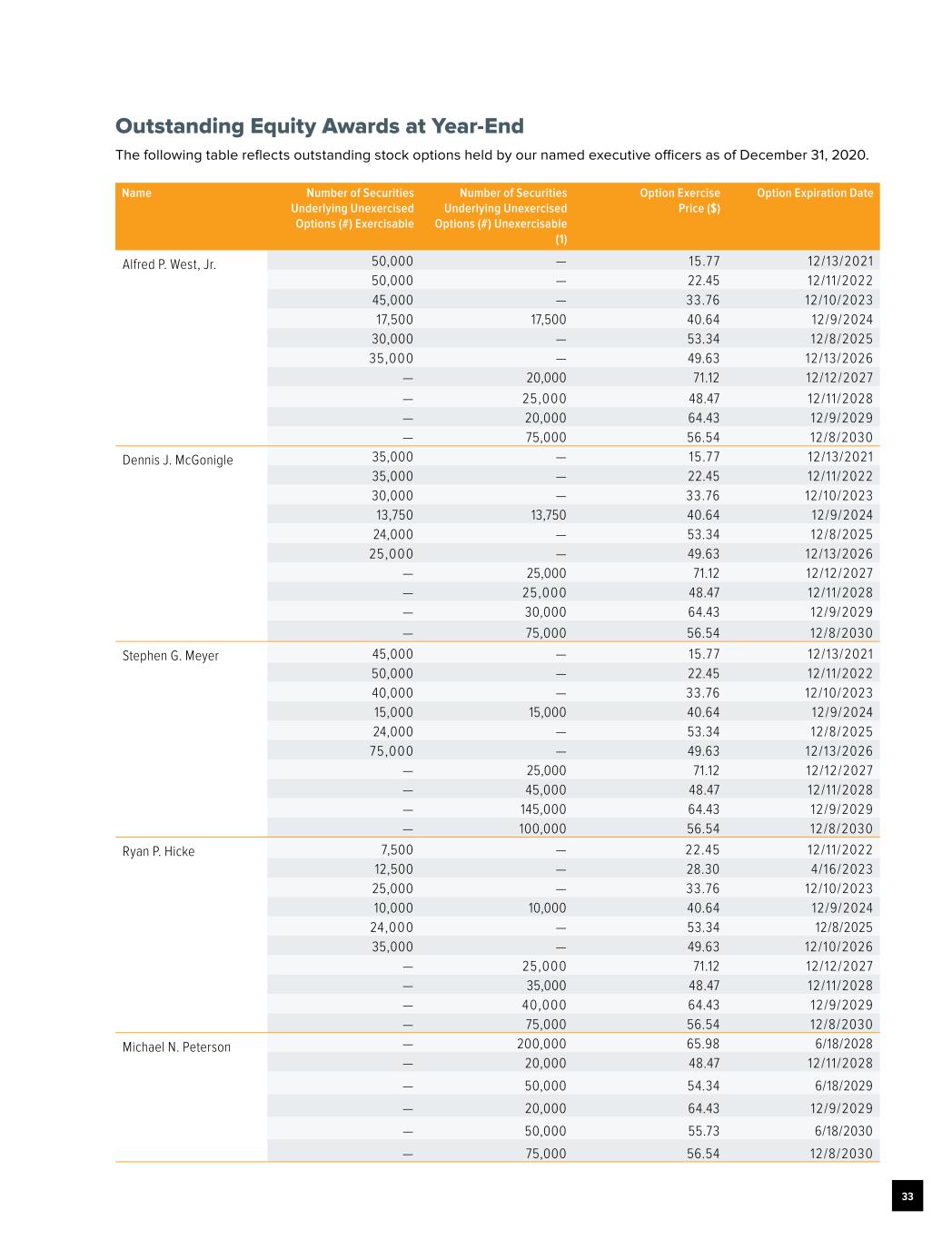
Outstanding Equity Awards at Year-End The following table reflects outstanding stock options held by our named executive officers as of December 31, 2020. Name Number of Securities Underlying Unexercised Options (#) Exercisable Number of Securities Underlying Unexercised Options (#) Unexercisable (1) Option Exercise Price ($) Option Expiration Date Alfred P. West, Jr. 50,000 — 15.77 12 / 13/2021 50,000 — 22.45 12 / 11 /2022 45,000 — 33.76 12 / 10/2023 17,500 17,500 40.64 12 /9/2024 30,000 — 53.34 12 /8/2025 35,000 — 49.63 12 / 13/2026 — 20,000 71.12 12 / 12 /2027 — 25,000 48.47 12 / 11 /2028 — 20,000 64.43 12 /9/2029 — 75,000 56.54 12 /8/2030 Dennis J. McGonigle 35,000 — 15.77 12 / 13/2021 35,000 — 22.45 12 / 11 /2022 30,000 — 33.76 12 / 10/2023 13,750 13,750 40.64 12 /9/2024 24,000 — 53.34 12 /8/2025 25,000 — 49.63 12 / 13/2026 — 25,000 71.12 12 / 12 /2027 — 25,000 48.47 12 / 11 /2028 — 30,000 64.43 12 /9/2029 — 75,000 56.54 12 /8/2030 Stephen G. Meyer 45,000 — 15.77 12 / 13/2021 50,000 — 22.45 12 / 11 /2022 40,000 — 33.76 12 / 10/2023 15,000 15,000 40.64 12 /9/2024 24,000 — 53.34 12 /8/2025 75,000 — 49.63 12 / 13/2026 — 25,000 71.12 12 / 12 /2027 — 45,000 48.47 12 / 11 /2028 — 145,000 64.43 12 /9/2029 — 100,000 56.54 12 /8/2030 Ryan P. Hicke 7,500 — 22.45 12 / 11 /2022 12,500 — 28.30 4 / 16/2023 25,000 — 33.76 12 / 10/2023 10,000 10,000 40.64 12 /9/2024 24,000 — 53.34 12/8/2025 35,000 — 49.63 12 / 10/2026 — 25,000 71.12 12 / 12 /2027 — 35,000 48.47 12 / 11 /2028 — 40,000 64.43 12 /9/2029 — 75,000 56.54 12 /8/2030 Michael N. Peterson — 200,000 65.98 6/18/2028 — 20,000 48.47 12 / 11 /2028 — 50,000 54.34 6/18/2029 — 20,000 64.43 12 /9/2029 — 50,000 55.73 6/18/2030 — 75,000 56.54 12 /8/2030 33

(1) The following tables set forth opposite the relevant option expiration date, the vesting thresholds for all options which are currently unexercisable: Option Expiration Date 50% Exercisable When Our Reported EPS Plus ASC 718 Expense Exceeds 100% Exercisable When Our Reported EPS Plus ASC 718 Expense Exceeds 12/9/2024 Vested $3.70 Option Expiration Date 50% Exercisable When our Reported Pre-Tax EPS Plus ASC 718 Expense Exceeds 100% Exercisable When our Reported Pre-Tax EPS Plus ASC 718 Expense Exceeds 12 / 12 /2027 $4.25 $5.50 12 / 11 /2028 $4.50 $6.00 12 /9/2029 $4.60 $6.00 12/8/2030 $4.30 $5.35 Option Exercises Table The following table presents information regarding the exercise of stock options by our named executive officers during 2020. None of our named executive officers hold restricted stock awards. Name Number of Shares Acquired on Exercise (#) Value Realized on Exercise ($) Alfred P. West, Jr. 50,000 1,636,000 Dennis J. McGonigle 40,000 1,211,588 Stephen G. Meyer 40,000 1,339,800 Ryan P. Hicke 40,000 1,396,333 Michael N. Peterson — — Director Compensation During 2020, each director who was not an employee received an annual retainer of $70,000. The annual chair fee for the Audit, Compensation, Legal Regulatory and Oversight and Nominating Committees was $20,000, $15,000, $15,000 and $5,000, respectively, and the annual retainer fee for the Audit Committee was $10,000, for each of the Compensation and Legal Regulatory and Oversight Committees was $7,500, and for the Nominating Committee was $5,000. The annual retainer for the Lead Independent Director was $15,000. Each non-employee director also receives an annual grant of 10,000 options to purchase Shares. Thus, on December 8, 2020, our non-employee directors, Messrs. Doran, Guarino, Romeo and Mss. Blumenstein and McCarthy, each were granted options under our 2014 Omnibus Equity Compensation Plan to purchase 10,000 Shares at an exercise price of $56.54, all of which options remained outstanding at December 31, 2020. These options have a ten-year term, with 50 percent of these options to vest on December 31 of the year in which we attain adjusted pre-tax earnings per share of $4.30 or more, but not earlier than the second anniversary of the date of grant, and the remaining 50 percent of these options to vest on December 31 of the year in which we attain adjusted pre-tax earnings per share of $5.35 or more, but not earlier than the fourth anniversary of the date of grant (in each case based upon our audited financial statements and subject to certain adjustments relating to the option expense we recorded under ASC 718 and to adjustment for certain extraordinary events). 34
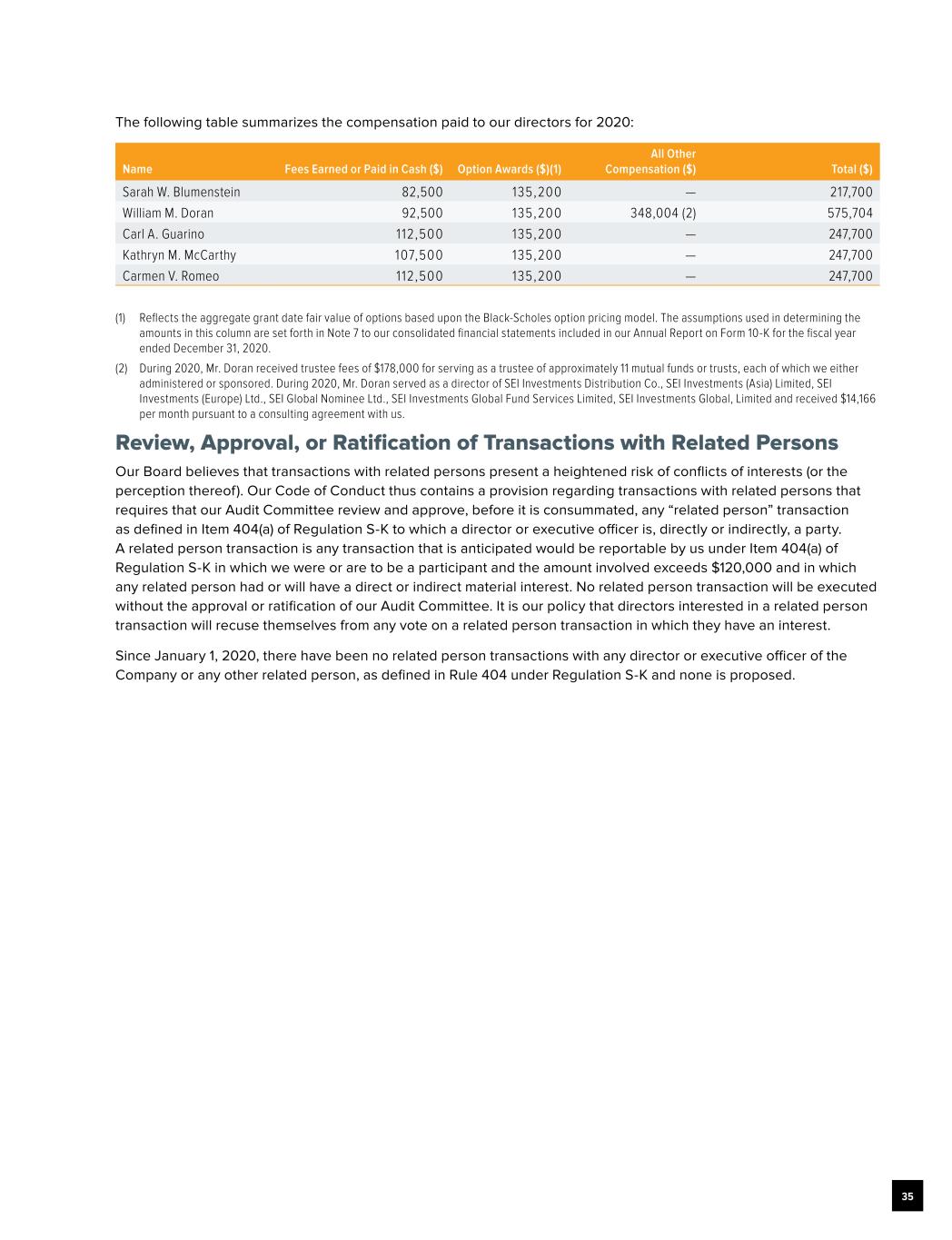
The following table summarizes the compensation paid to our directors for 2020: Name Fees Earned or Paid in Cash ($) Option Awards ($)(1) All Other Compensation ($) Total ($) Sarah W. Blumenstein 82,500 135,200 — 217,700 William M. Doran 92,500 135,200 348,004 (2) 575,704 Carl A. Guarino 112,500 135,200 — 247,700 Kathryn M. McCarthy 107,500 135,200 — 247,700 Carmen V. Romeo 112,500 135,200 — 247,700 (1) Reflects the aggregate grant date fair value of options based upon the Black-Scholes option pricing model. The assumptions used in determining the amounts in this column are set forth in Note 7 to our consolidated financial statements included in our Annual Report on Form 10-K for the fiscal year ended December 31, 2020. (2) During 2020, Mr. Doran received trustee fees of $178,000 for serving as a trustee of approximately 11 mutual funds or trusts, each of which we either administered or sponsored. During 2020, Mr. Doran served as a director of SEI Investments Distribution Co., SEI Investments (Asia) Limited, SEI Investments (Europe) Ltd., SEI Global Nominee Ltd., SEI Investments Global Fund Services Limited, SEI Investments Global, Limited and received $14,166 per month pursuant to a consulting agreement with us. Review, Approval, or Ratification of Transactions with Related Persons Our Board believes that transactions with related persons present a heightened risk of conflicts of interests (or the perception thereof). Our Code of Conduct thus contains a provision regarding transactions with related persons that requires that our Audit Committee review and approve, before it is consummated, any “related person” transaction as defined in Item 404(a) of Regulation S-K to which a director or executive officer is, directly or indirectly, a party. A related person transaction is any transaction that is anticipated would be reportable by us under Item 404(a) of Regulation S-K in which we were or are to be a participant and the amount involved exceeds $120,000 and in which any related person had or will have a direct or indirect material interest. No related person transaction will be executed without the approval or ratification of our Audit Committee. It is our policy that directors interested in a related person transaction will recuse themselves from any vote on a related person transaction in which they have an interest. Since January 1, 2020, there have been no related person transactions with any director or executive officer of the Company or any other related person, as defined in Rule 404 under Regulation S-K and none is proposed. 35
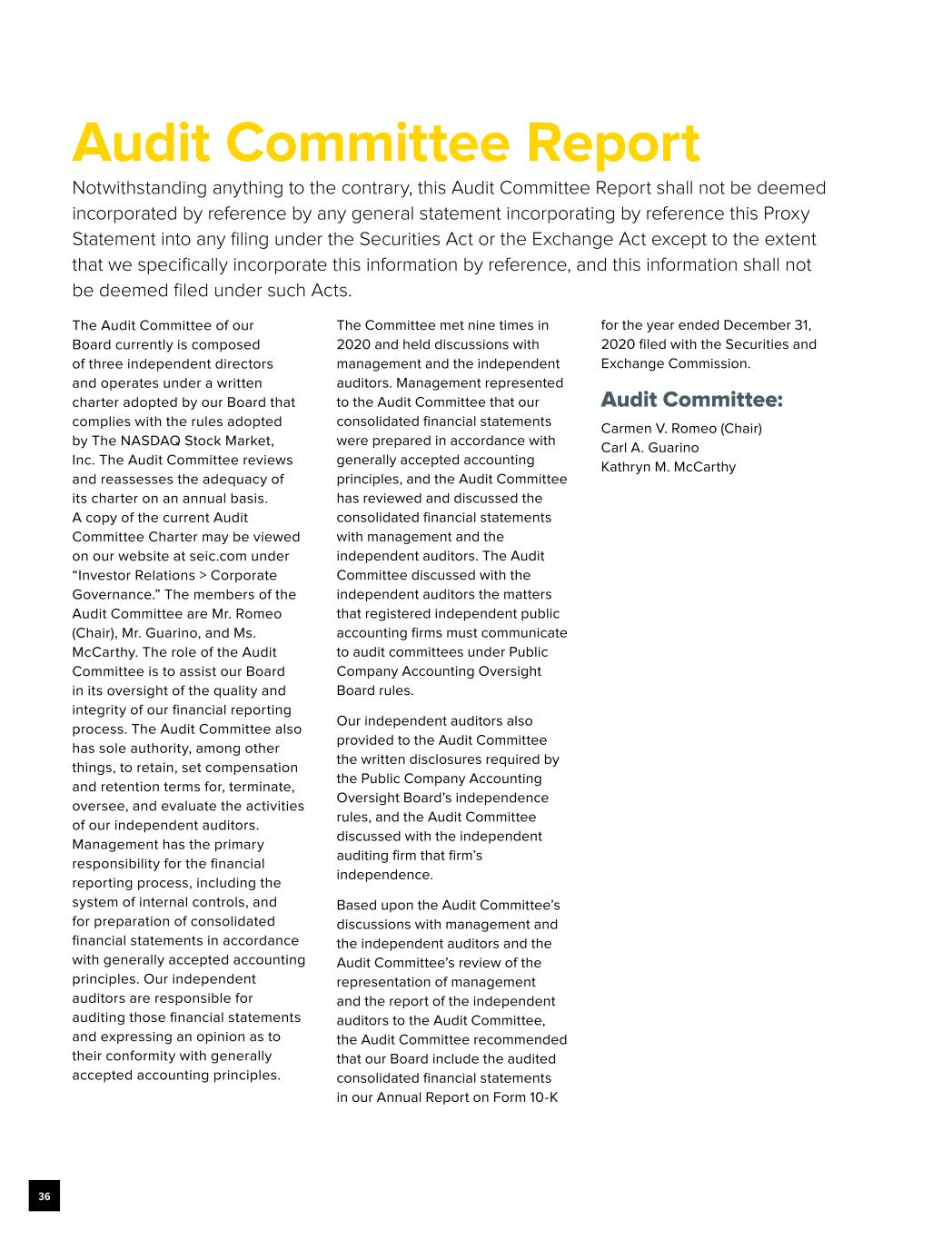
Audit Committee Report Notwithstanding anything to the contrary, this Audit Committee Report shall not be deemed incorporated by reference by any general statement incorporating by reference this Proxy Statement into any filing under the Securities Act or the Exchange Act except to the extent that we specifically incorporate this information by reference, and this information shall not be deemed filed under such Acts. The Audit Committee of our Board currently is composed of three independent directors and operates under a written charter adopted by our Board that complies with the rules adopted by The NASDAQ Stock Market, Inc. The Audit Committee reviews and reassesses the adequacy of its charter on an annual basis. A copy of the current Audit Committee Charter may be viewed on our website at seic.com under “Investor Relations > Corporate Governance.” The members of the Audit Committee are Mr. Romeo (Chair), Mr. Guarino, and Ms. McCarthy. The role of the Audit Committee is to assist our Board in its oversight of the quality and integrity of our financial reporting process. The Audit Committee also has sole authority, among other things, to retain, set compensation and retention terms for, terminate, oversee, and evaluate the activities of our independent auditors. Management has the primary responsibility for the financial reporting process, including the system of internal controls, and for preparation of consolidated financial statements in accordance with generally accepted accounting principles. Our independent auditors are responsible for auditing those financial statements and expressing an opinion as to their conformity with generally accepted accounting principles. The Committee met nine times in 2020 and held discussions with management and the independent auditors. Management represented to the Audit Committee that our consolidated financial statements were prepared in accordance with generally accepted accounting principles, and the Audit Committee has reviewed and discussed the consolidated financial statements with management and the independent auditors. The Audit Committee discussed with the independent auditors the matters that registered independent public accounting firms must communicate to audit committees under Public Company Accounting Oversight Board rules. Our independent auditors also provided to the Audit Committee the written disclosures required by the Public Company Accounting Oversight Board’s independence rules, and the Audit Committee discussed with the independent auditing firm that firm’s independence. Based upon the Audit Committee’s discussions with management and the independent auditors and the Audit Committee’s review of the representation of management and the report of the independent auditors to the Audit Committee, the Audit Committee recommended that our Board include the audited consolidated financial statements in our Annual Report on Form 10-K for the year ended December 31, 2020 filed with the Securities and Exchange Commission. Audit Committee: Carmen V. Romeo (Chair) Carl A. Guarino Kathryn M. McCarthy 36
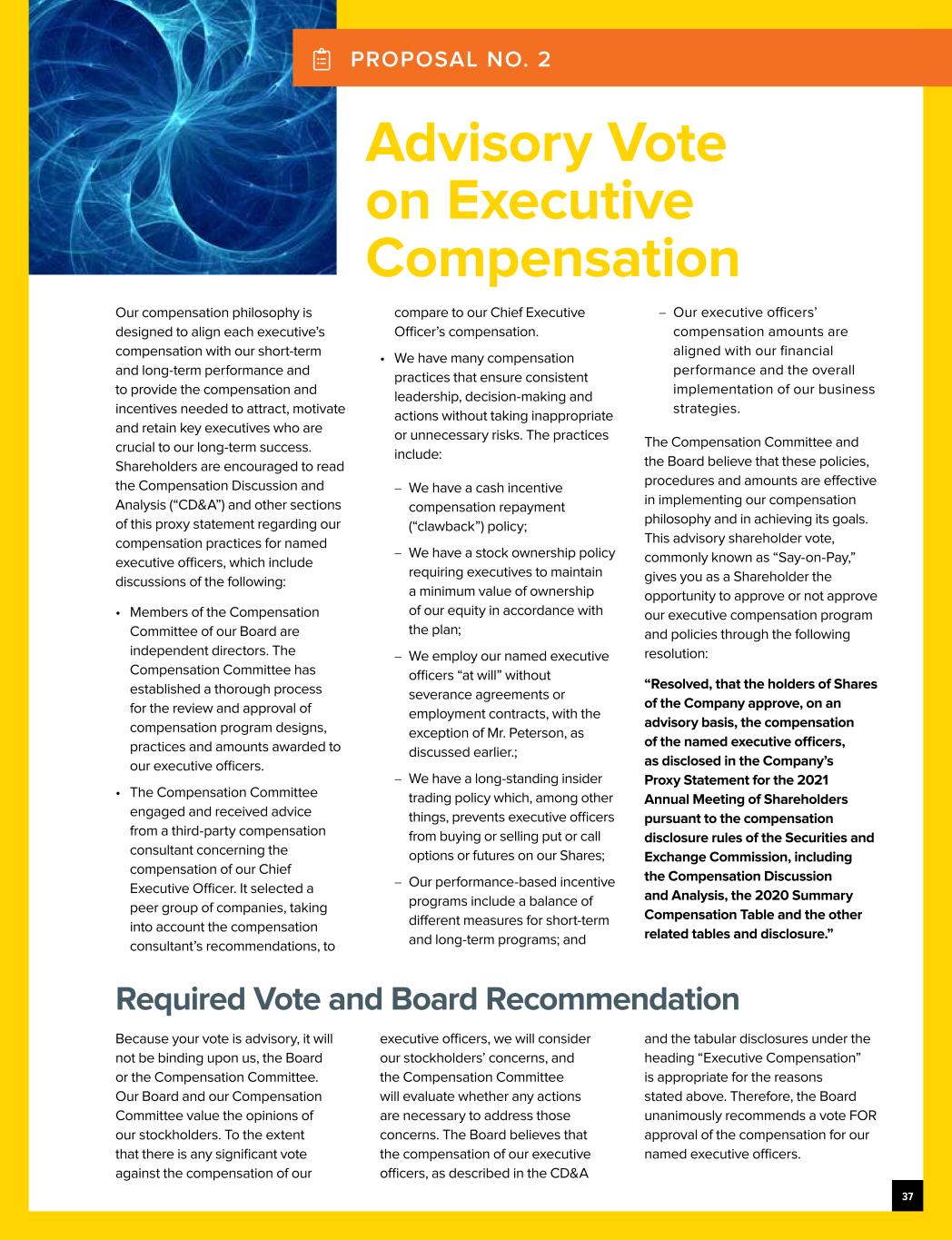
CLIPBOARD-LIST PROPOSAL NO. 2 Advisory Vote on Executive Compensation Our compensation philosophy is designed to align each executive’s compensation with our short-term and long-term performance and to provide the compensation and incentives needed to attract, motivate and retain key executives who are crucial to our long-term success. Shareholders are encouraged to read the Compensation Discussion and Analysis (“CD&A”) and other sections of this proxy statement regarding our compensation practices for named executive officers, which include discussions of the following: • Members of the Compensation Committee of our Board are independent directors. The Compensation Committee has established a thorough process for the review and approval of compensation program designs, practices and amounts awarded to our executive officers. • The Compensation Committee engaged and received advice from a third-party compensation consultant concerning the compensation of our Chief Executive Officer. It selected a peer group of companies, taking into account the compensation consultant’s recommendations, to compare to our Chief Executive Officer’s compensation. • We have many compensation practices that ensure consistent leadership, decision-making and actions without taking inappropriate or unnecessary risks. The practices include: – We have a cash incentive compensation repayment (“clawback”) policy; – We have a stock ownership policy requiring executives to maintain a minimum value of ownership of our equity in accordance with the plan; – We employ our named executive officers “at will” without severance agreements or employment contracts, with the exception of Mr. Peterson, as discussed earlier.; – We have a long-standing insider trading policy which, among other things, prevents executive officers from buying or selling put or call options or futures on our Shares; – Our performance-based incentive programs include a balance of different measures for short-term and long-term programs; and – Our executive officers’ compensation amounts are aligned with our financial performance and the overall implementation of our business strategies. The Compensation Committee and the Board believe that these policies, procedures and amounts are effective in implementing our compensation philosophy and in achieving its goals. This advisory shareholder vote, commonly known as “Say-on-Pay,” gives you as a Shareholder the opportunity to approve or not approve our executive compensation program and policies through the following resolution: “Resolved, that the holders of Shares of the Company approve, on an advisory basis, the compensation of the named executive officers, as disclosed in the Company’s Proxy Statement for the 2021 Annual Meeting of Shareholders pursuant to the compensation disclosure rules of the Securities and Exchange Commission, including the Compensation Discussion and Analysis, the 2020 Summary Compensation Table and the other related tables and disclosure.” Required Vote and Board Recommendation Because your vote is advisory, it will not be binding upon us, the Board or the Compensation Committee. Our Board and our Compensation Committee value the opinions of our stockholders. To the extent that there is any significant vote against the compensation of our executive officers, we will consider our stockholders’ concerns, and the Compensation Committee will evaluate whether any actions are necessary to address those concerns. The Board believes that the compensation of our executive officers, as described in the CD&A and the tabular disclosures under the heading “Executive Compensation” is appropriate for the reasons stated above. Therefore, the Board unanimously recommends a vote FOR approval of the compensation for our named executive officers. 37
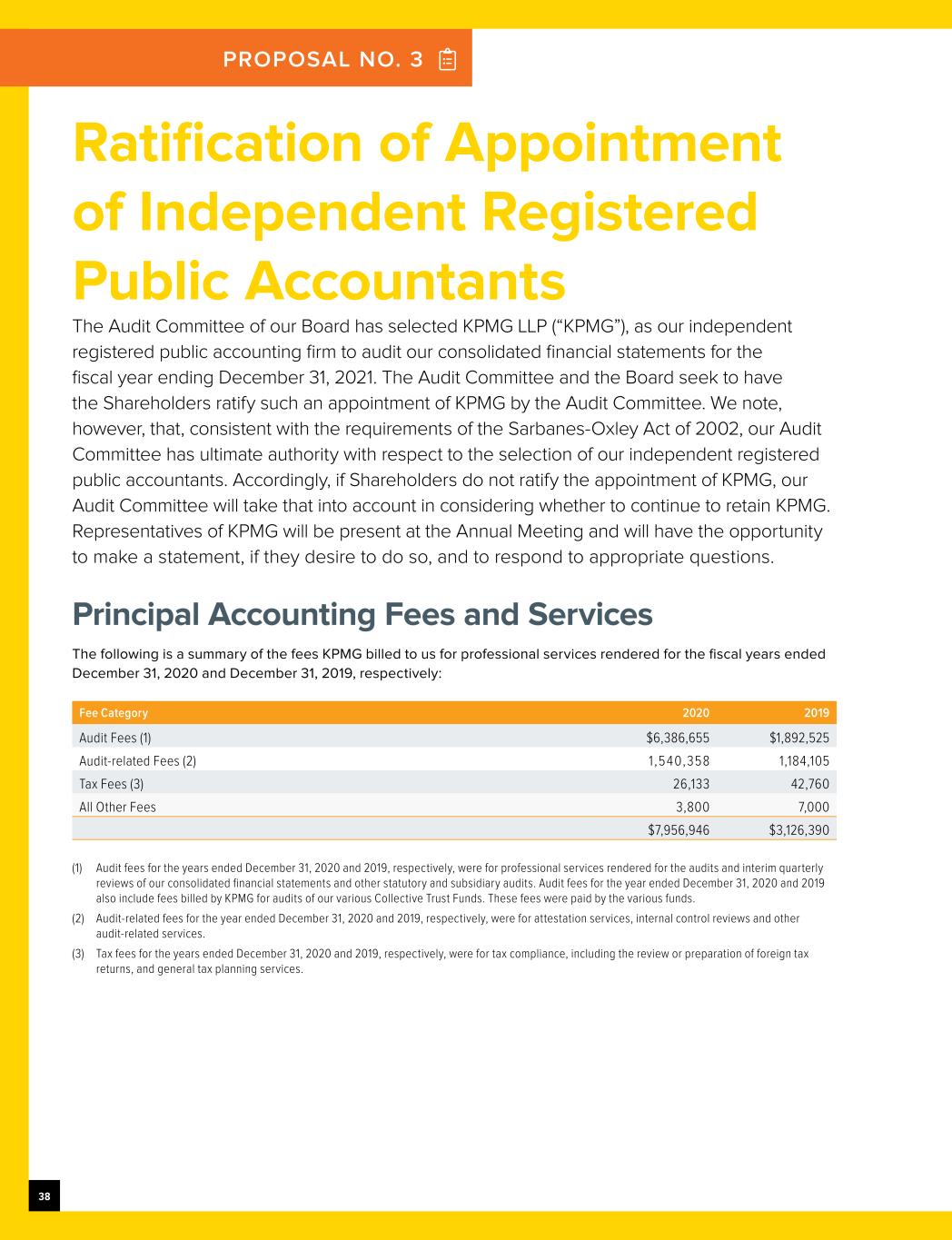
PROPOSAL NO. 3 CLIPBOARD-LIST Ratification of Appointment of Independent Registered Public Accountants The Audit Committee of our Board has selected KPMG LLP (“KPMG”), as our independent registered public accounting firm to audit our consolidated financial statements for the fiscal year ending December 31, 2021. The Audit Committee and the Board seek to have the Shareholders ratify such an appointment of KPMG by the Audit Committee. We note, however, that, consistent with the requirements of the Sarbanes-Oxley Act of 2002, our Audit Committee has ultimate authority with respect to the selection of our independent registered public accountants. Accordingly, if Shareholders do not ratify the appointment of KPMG, our Audit Committee will take that into account in considering whether to continue to retain KPMG. Representatives of KPMG will be present at the Annual Meeting and will have the opportunity to make a statement, if they desire to do so, and to respond to appropriate questions. Principal Accounting Fees and Services The following is a summary of the fees KPMG billed to us for professional services rendered for the fiscal years ended December 31, 2020 and December 31, 2019, respectively: Fee Category 2020 2019 Audit Fees (1) $6,386,655 $1,892,525 Audit-related Fees (2) 1 ,540,358 1,184,105 Tax Fees (3) 26,133 42,760 All Other Fees 3,800 7,000 $7,956,946 $3,126,390 (1) Audit fees for the years ended December 31, 2020 and 2019, respectively, were for professional services rendered for the audits and interim quarterly reviews of our consolidated financial statements and other statutory and subsidiary audits. Audit fees for the year ended December 31, 2020 and 2019 also include fees billed by KPMG for audits of our various Collective Trust Funds. These fees were paid by the various funds. (2) Audit-related fees for the year ended December 31, 2020 and 2019, respectively, were for attestation services, internal control reviews and other audit-related services. (3) Tax fees for the years ended December 31, 2020 and 2019, respectively, were for tax compliance, including the review or preparation of foreign tax returns, and general tax planning services. 38
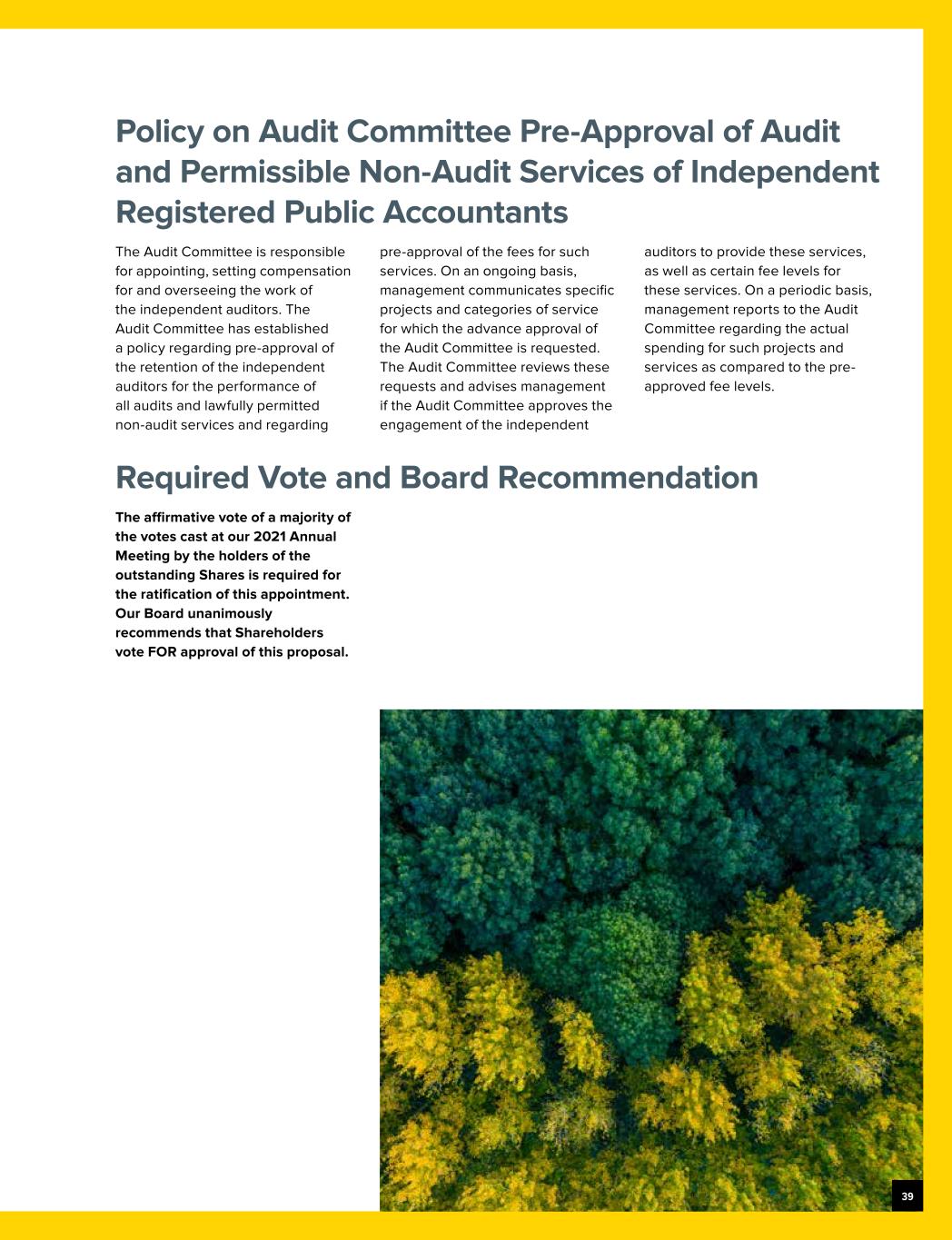
Policy on Audit Committee Pre-Approval of Audit and Permissible Non-Audit Services of Independent Registered Public Accountants The Audit Committee is responsible for appointing, setting compensation for and overseeing the work of the independent auditors. The Audit Committee has established a policy regarding pre-approval of the retention of the independent auditors for the performance of all audits and lawfully permitted non-audit services and regarding pre-approval of the fees for such services. On an ongoing basis, management communicates specific projects and categories of service for which the advance approval of the Audit Committee is requested. The Audit Committee reviews these requests and advises management if the Audit Committee approves the engagement of the independent auditors to provide these services, as well as certain fee levels for these services. On a periodic basis, management reports to the Audit Committee regarding the actual spending for such projects and services as compared to the pre- approved fee levels. Required Vote and Board Recommendation The affirmative vote of a majority of the votes cast at our 2021 Annual Meeting by the holders of the outstanding Shares is required for the ratification of this appointment. Our Board unanimously recommends that Shareholders vote FOR approval of this proposal. 39
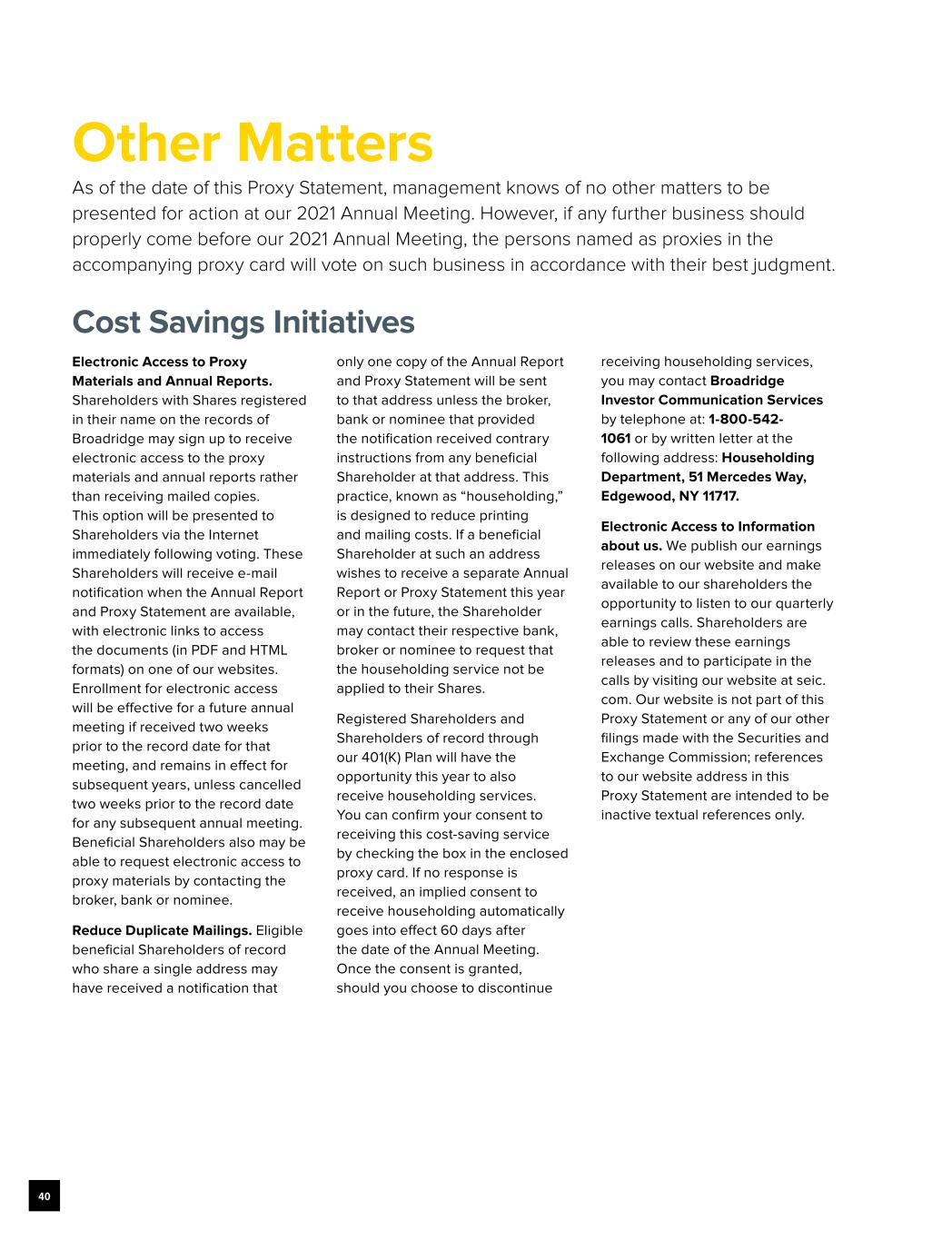
Other Matters As of the date of this Proxy Statement, management knows of no other matters to be presented for action at our 2021 Annual Meeting. However, if any further business should properly come before our 2021 Annual Meeting, the persons named as proxies in the accompanying proxy card will vote on such business in accordance with their best judgment. Cost Savings Initiatives Electronic Access to Proxy Materials and Annual Reports. Shareholders with Shares registered in their name on the records of Broadridge may sign up to receive electronic access to the proxy materials and annual reports rather than receiving mailed copies. This option will be presented to Shareholders via the Internet immediately following voting. These Shareholders will receive e-mail notification when the Annual Report and Proxy Statement are available, with electronic links to access the documents (in PDF and HTML formats) on one of our websites. Enrollment for electronic access will be effective for a future annual meeting if received two weeks prior to the record date for that meeting, and remains in effect for subsequent years, unless cancelled two weeks prior to the record date for any subsequent annual meeting. Beneficial Shareholders also may be able to request electronic access to proxy materials by contacting the broker, bank or nominee. Reduce Duplicate Mailings. Eligible beneficial Shareholders of record who share a single address may have received a notification that only one copy of the Annual Report and Proxy Statement will be sent to that address unless the broker, bank or nominee that provided the notification received contrary instructions from any beneficial Shareholder at that address. This practice, known as “householding,” is designed to reduce printing and mailing costs. If a beneficial Shareholder at such an address wishes to receive a separate Annual Report or Proxy Statement this year or in the future, the Shareholder may contact their respective bank, broker or nominee to request that the householding service not be applied to their Shares. Registered Shareholders and Shareholders of record through our 401(K) Plan will have the opportunity this year to also receive householding services. You can confirm your consent to receiving this cost-saving service by checking the box in the enclosed proxy card. If no response is received, an implied consent to receive householding automatically goes into effect 60 days after the date of the Annual Meeting. Once the consent is granted, should you choose to discontinue receiving householding services, you may contact Broadridge Investor Communication Services by telephone at: 1-800-542- 1061 or by written letter at the following address: Householding Department, 51 Mercedes Way, Edgewood, NY 11717. Electronic Access to Information about us. We publish our earnings releases on our website and make available to our shareholders the opportunity to listen to our quarterly earnings calls. Shareholders are able to review these earnings releases and to participate in the calls by visiting our website at seic. com. Our website is not part of this Proxy Statement or any of our other filings made with the Securities and Exchange Commission; references to our website address in this Proxy Statement are intended to be inactive textual references only. 40
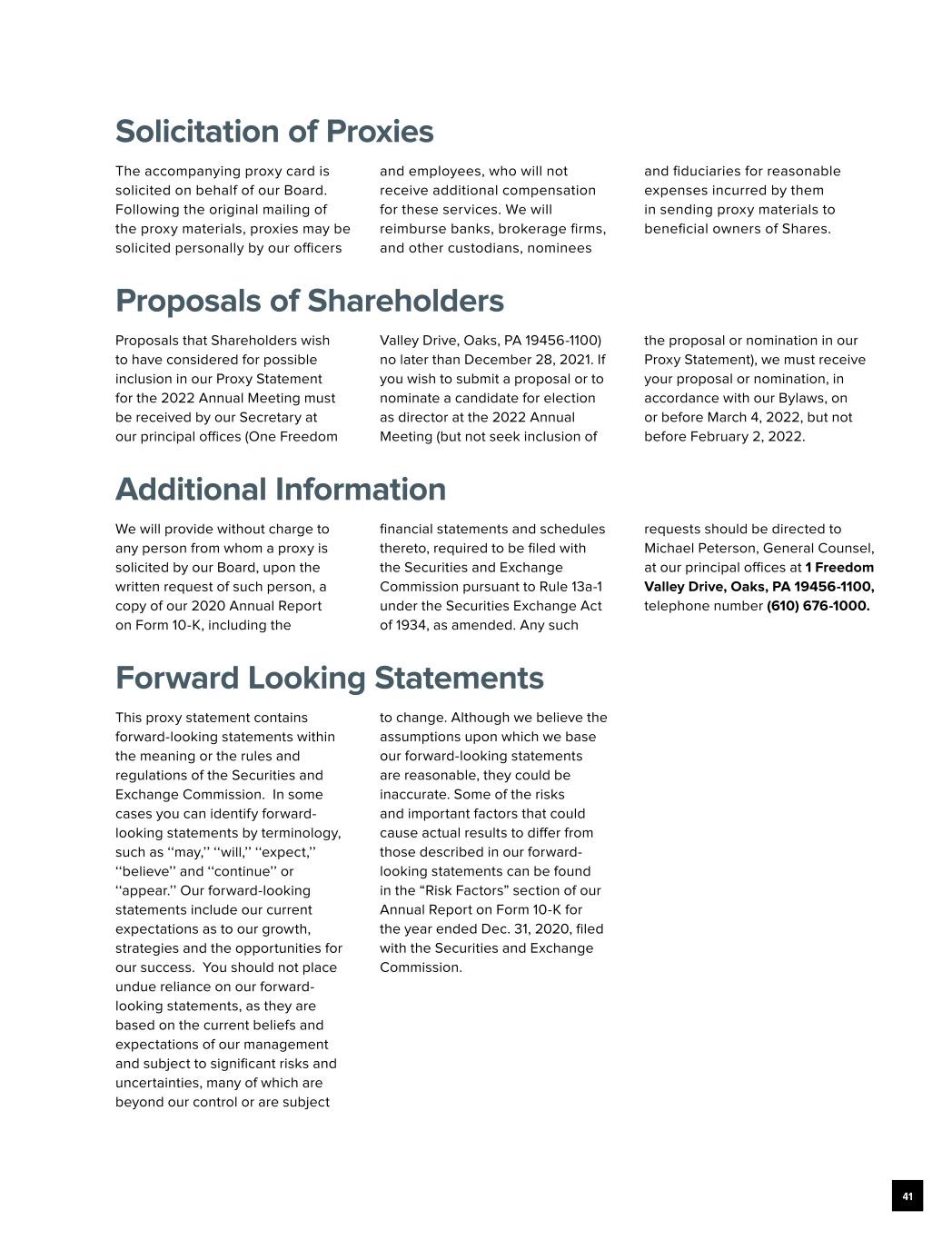
Solicitation of Proxies The accompanying proxy card is solicited on behalf of our Board. Following the original mailing of the proxy materials, proxies may be solicited personally by our officers and employees, who will not receive additional compensation for these services. We will reimburse banks, brokerage firms, and other custodians, nominees and fiduciaries for reasonable expenses incurred by them in sending proxy materials to beneficial owners of Shares. Proposals of Shareholders Proposals that Shareholders wish to have considered for possible inclusion in our Proxy Statement for the 2022 Annual Meeting must be received by our Secretary at our principal offices (One Freedom Valley Drive, Oaks, PA 19456-1100) no later than December 28, 2021. If you wish to submit a proposal or to nominate a candidate for election as director at the 2022 Annual Meeting (but not seek inclusion of the proposal or nomination in our Proxy Statement), we must receive your proposal or nomination, in accordance with our Bylaws, on or before March 4, 2022, but not before February 2, 2022. Additional Information We will provide without charge to any person from whom a proxy is solicited by our Board, upon the written request of such person, a copy of our 2020 Annual Report on Form 10-K, including the financial statements and schedules thereto, required to be filed with the Securities and Exchange Commission pursuant to Rule 13a-1 under the Securities Exchange Act of 1934, as amended. Any such requests should be directed to Michael Peterson, General Counsel, at our principal offices at 1 Freedom Valley Drive, Oaks, PA 19456-1100, telephone number (610) 676-1000. Forward Looking Statements This proxy statement contains forward-looking statements within the meaning or the rules and regulations of the Securities and Exchange Commission. In some cases you can identify forward- looking statements by terminology, such as ‘‘may,’’ ‘‘will,’’ ‘‘expect,’’ ‘‘believe’’ and ‘‘continue’’ or ‘‘appear.’’ Our forward-looking statements include our current expectations as to our growth, strategies and the opportunities for our success. You should not place undue reliance on our forward- looking statements, as they are based on the current beliefs and expectations of our management and subject to significant risks and uncertainties, many of which are beyond our control or are subject to change. Although we believe the assumptions upon which we base our forward-looking statements are reasonable, they could be inaccurate. Some of the risks and important factors that could cause actual results to differ from those described in our forward- looking statements can be found in the “Risk Factors” section of our Annual Report on Form 10-K for the year ended Dec. 31, 2020, filed with the Securities and Exchange Commission. 41

1 Freedom Valley Drive Oaks, PA 19456-1100 +1 610-676-1000 seic.com Follow us on social media Facebook https://www.facebook.com/SEICorporateHeadquarters/ linkedin https://www.linkedin.com/company/sei/ Instagram https://www.instagram.com/sei_hq/ ©2021 SEI 210310.02 (4/21 )
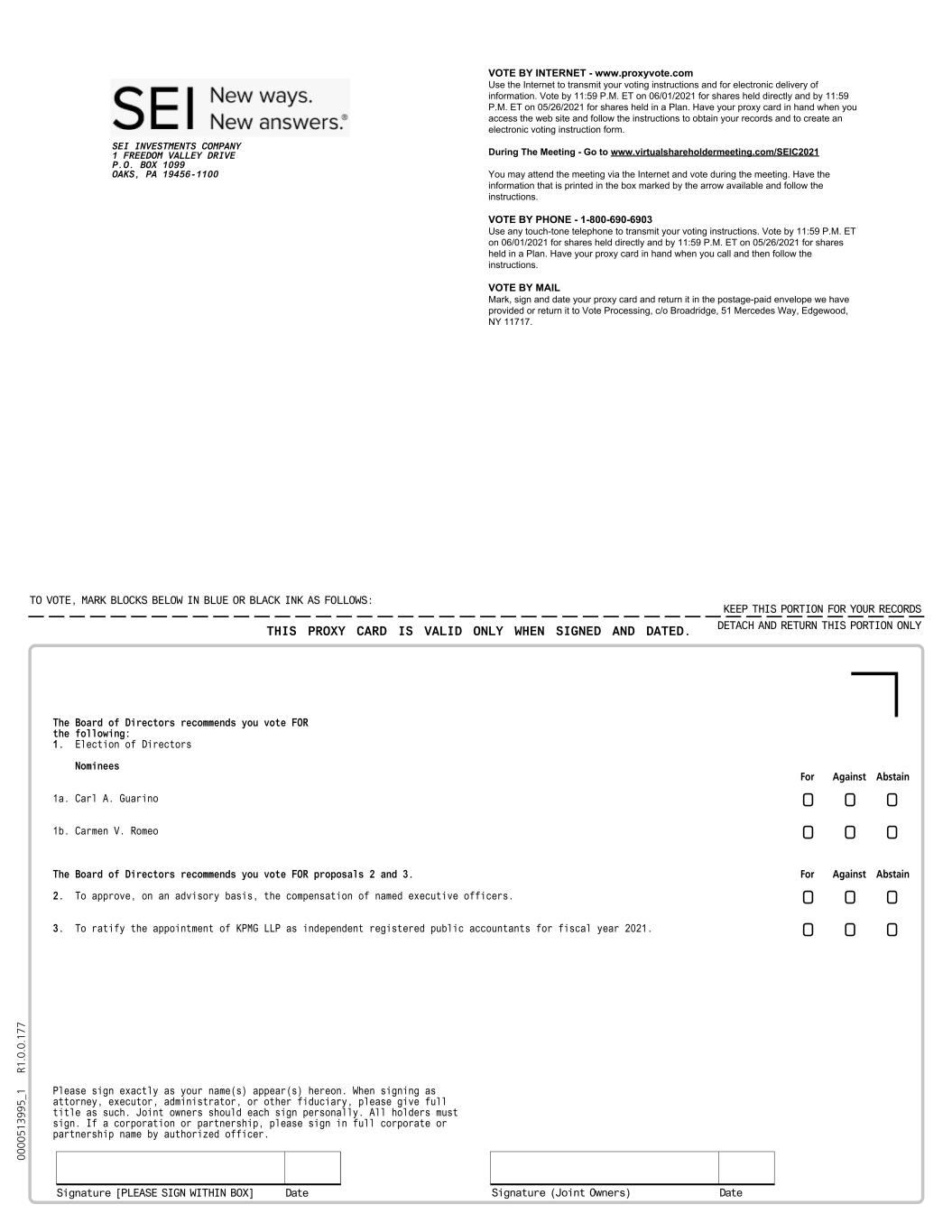
THIS PROXY CARD IS VALID ONLY WHEN SIGNED AND DATED. KEEP THIS PORTION FOR YOUR RECORDS DETACH AND RETURN THIS PORTION ONLY TO VOTE, MARK BLOCKS BELOW IN BLUE OR BLACK INK AS FOLLOWS: Signature (Joint Owners)Signature [PLEASE SIGN WITHIN BOX] DateDate 0 0 0 0 0 0 0 0 0 0 0 0 0 0 0 0 5 1 3 9 9 5 _1 R 1 .0 .0 .1 7 7 SEI INVESTMENTS COMPANY 1 FREEDOM VALLEY DRIVE P.O. BOX 1099 OAKS, PA 19456-1100 VOTE BY INTERNET - www.proxyvote.com Use the Internet to transmit your voting instructions and for electronic delivery of information. Vote by 11:59 P.M. ET on 06/01/2021 for shares held directly and by 11:59 P.M. ET on 05/26/2021 for shares held in a Plan. Have your proxy card in hand when you access the web site and follow the instructions to obtain your records and to create an electronic voting instruction form. During The Meeting - Go to www.virtualshareholdermeeting.com/SEIC2021 You may attend the meeting via the Internet and vote during the meeting. Have the information that is printed in the box marked by the arrow available and follow the instructions. VOTE BY PHONE - 1-800-690-6903 Use any touch-tone telephone to transmit your voting instructions. Vote by 11:59 P.M. ET on 06/01/2021 for shares held directly and by 11:59 P.M. ET on 05/26/2021 for shares held in a Plan. Have your proxy card in hand when you call and then follow the instructions. VOTE BY MAIL Mark, sign and date your proxy card and return it in the postage-paid envelope we have provided or return it to Vote Processing, c/o Broadridge, 51 Mercedes Way, Edgewood, NY 11717. The Board of Directors recommends you vote FOR the following: 1. Election of Directors Nominees For Against Abstain 1a. Carl A. Guarino 1b. Carmen V. Romeo The Board of Directors recommends you vote FOR proposals 2 and 3. For Against Abstain 2. To approve, on an advisory basis, the compensation of named executive officers. 3. To ratify the appointment of KPMG LLP as independent registered public accountants for fiscal year 2021. Please sign exactly as your name(s) appear(s) hereon. When signing as attorney, executor, administrator, or other fiduciary, please give full title as such. Joint owners should each sign personally. All holders must sign. If a corporation or partnership, please sign in full corporate or partnership name by authorized officer.

0 0 0 0 5 1 3 9 9 5 _2 R 1 .0 .0 .1 7 7 Important Notice Regarding the Availability of Proxy Materials for the Annual Meeting: The Notice and Proxy Statement and Annual Report are available at www.proxyvote.com SEI INVESTMENTS COMPANY This proxy is solicited on behalf of our Board of Directors. The undersigned shareholder of SEI Investments Company (the “Company”) hereby appoints Michael N. Peterson and Ruth A. Montgomery, the proxy or proxies of the undersigned, and hereby authorizes either of them to represent and to vote as designated on the reverse, all shares of Common Stock of the Company held of record by the undersigned at the close of business on, March 26, 2021 at the Annual Meeting of Shareholders to be held on June 2, 2021, and at any adjournments thereof. The proxies named herein are authorized to vote in their discretion upon such other business as may properly come before the meeting or any adjournment thereof. This proxy, when properly executed, will be voted in the manner directed herein. If no such direction is made, this proxy will be voted in accordance with the Board of Directors' recommendations. Continued and to be signed on reverse side